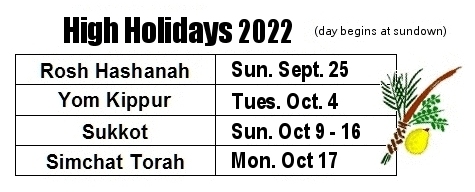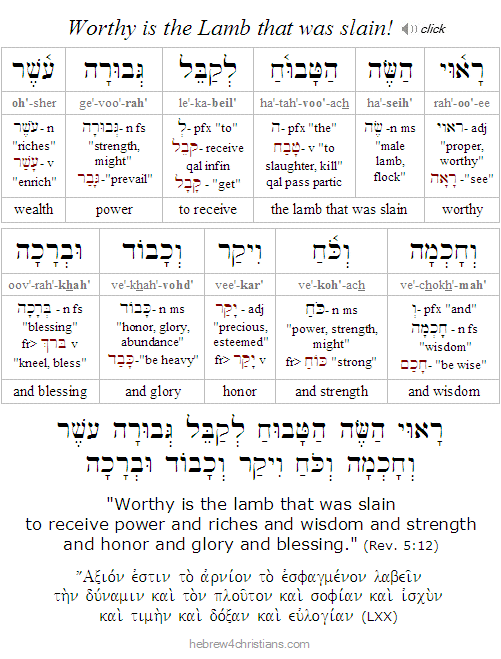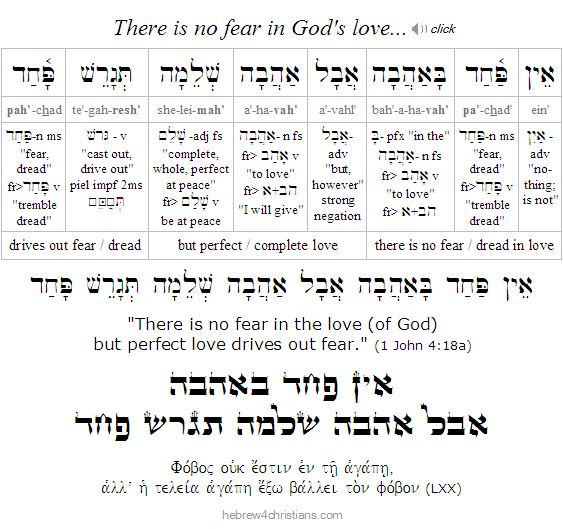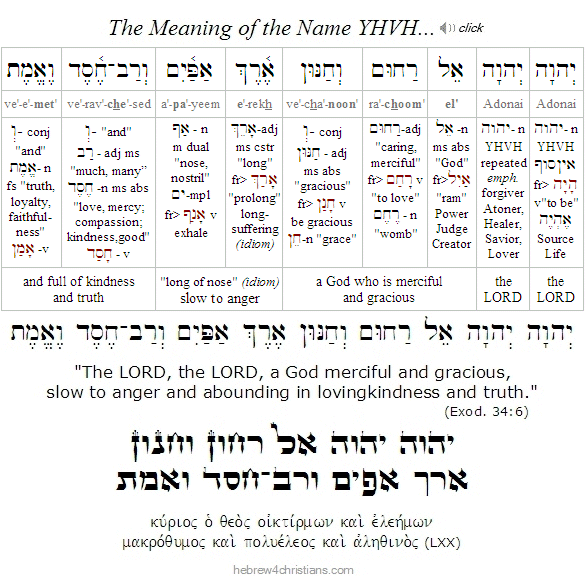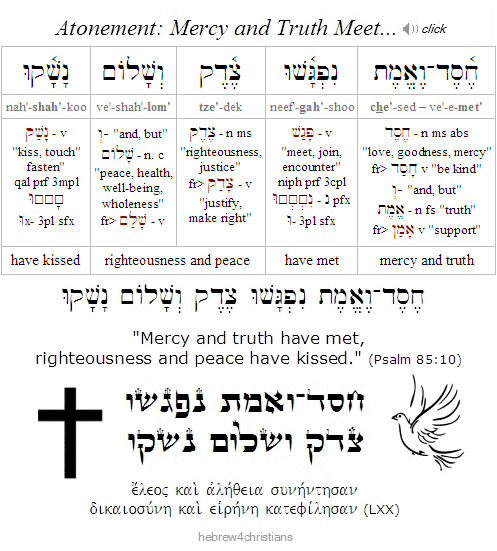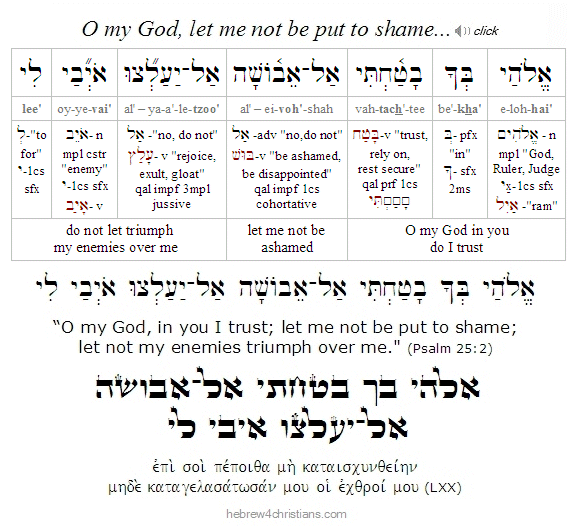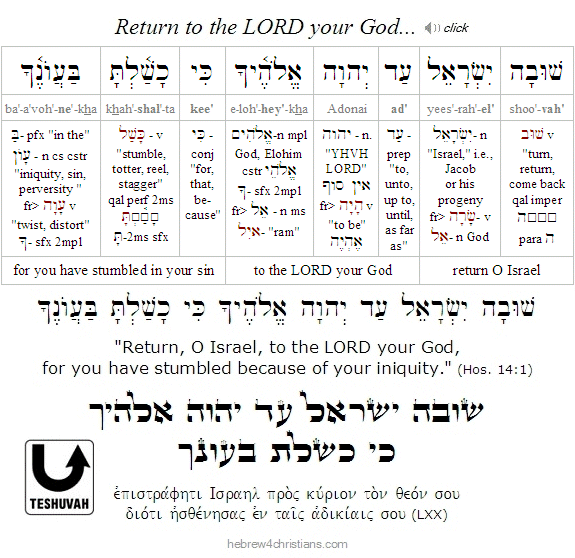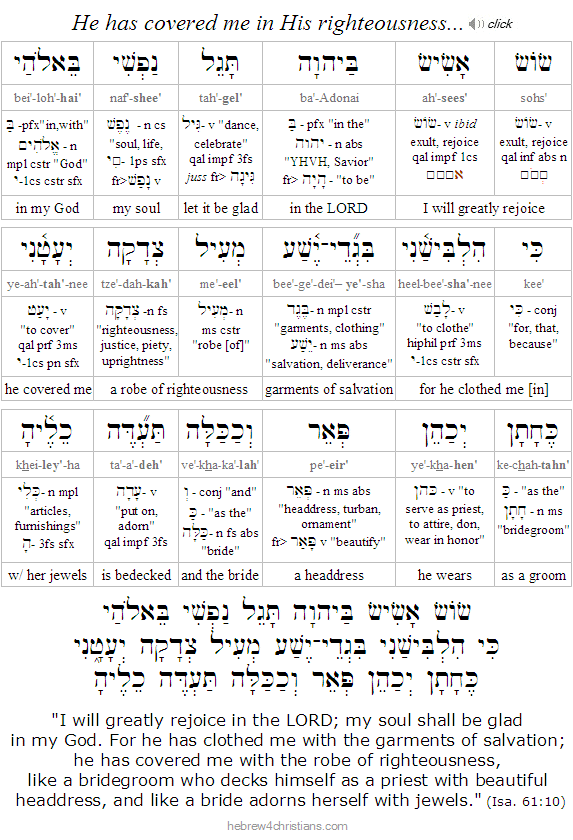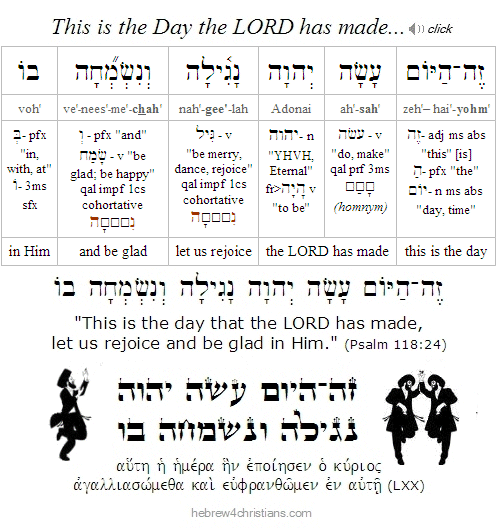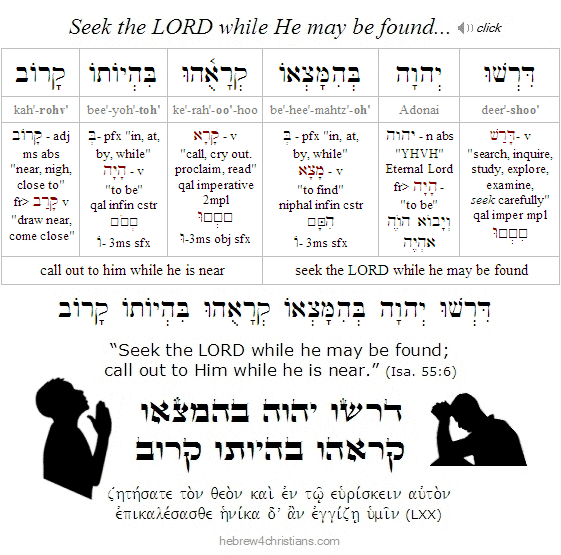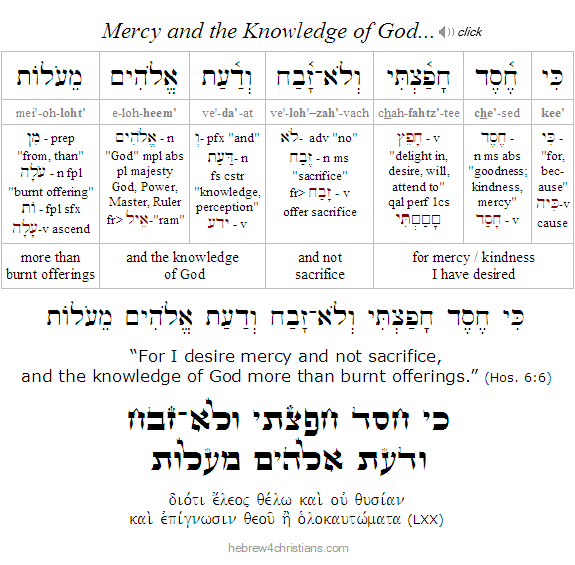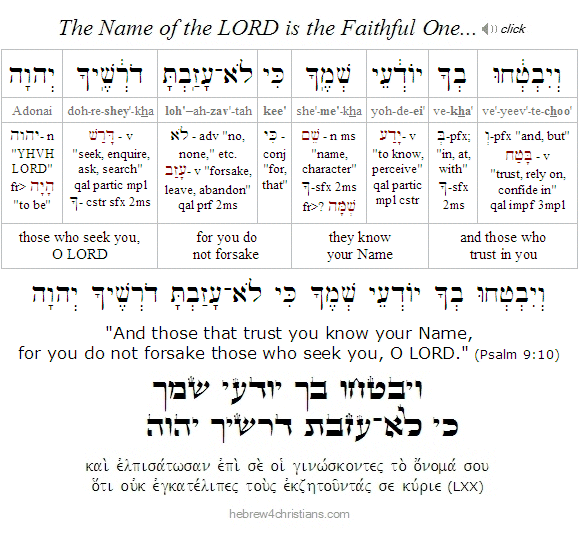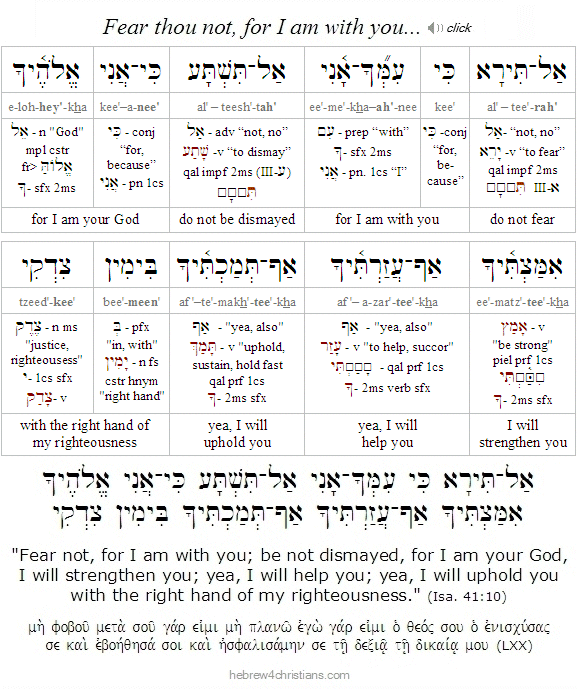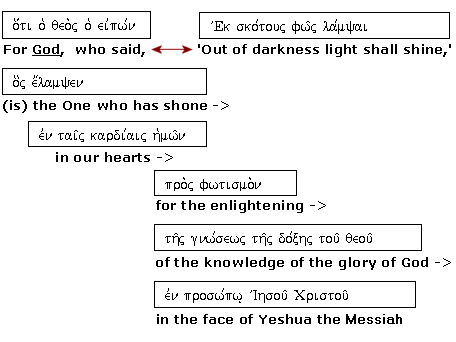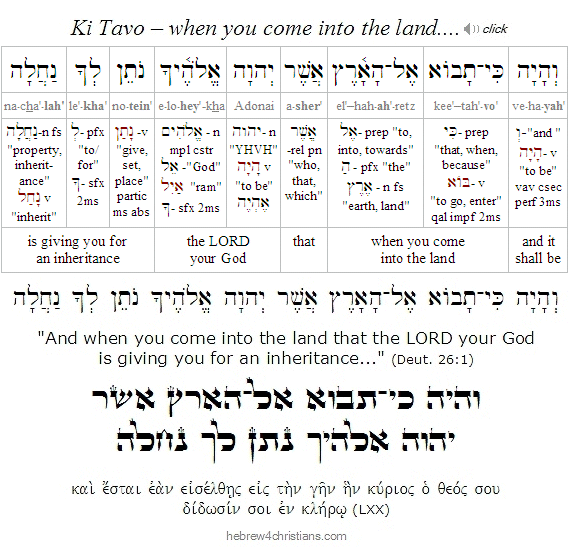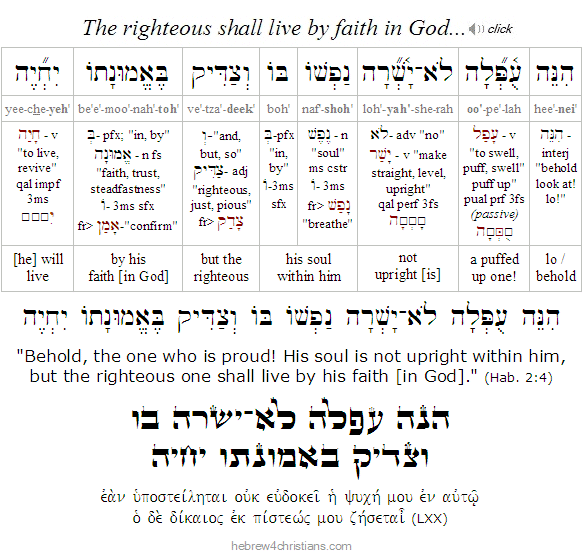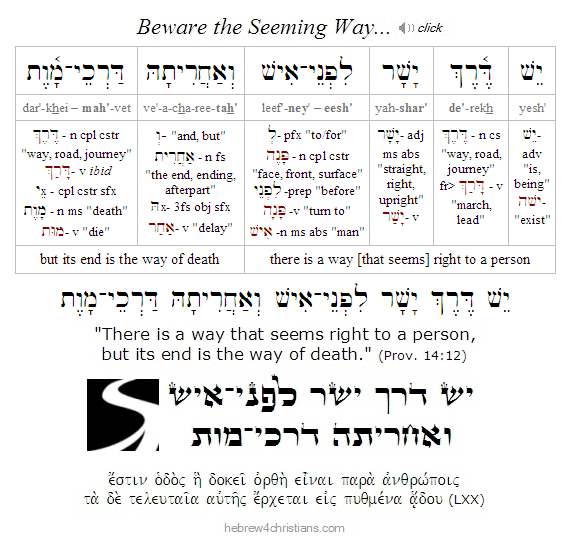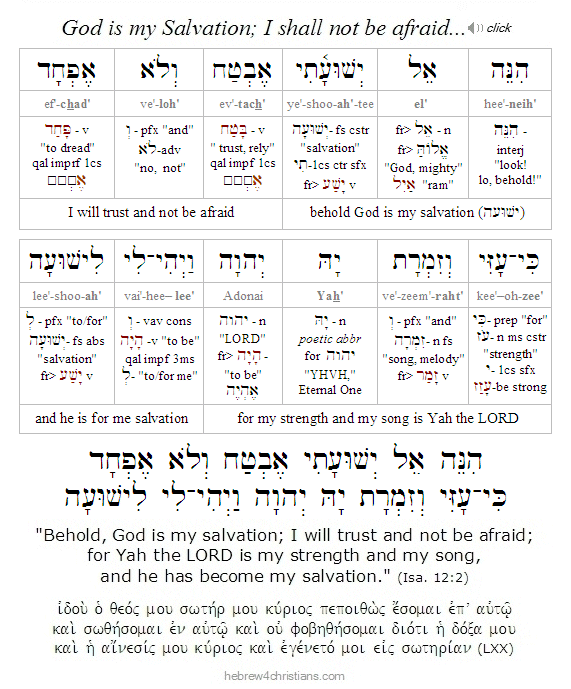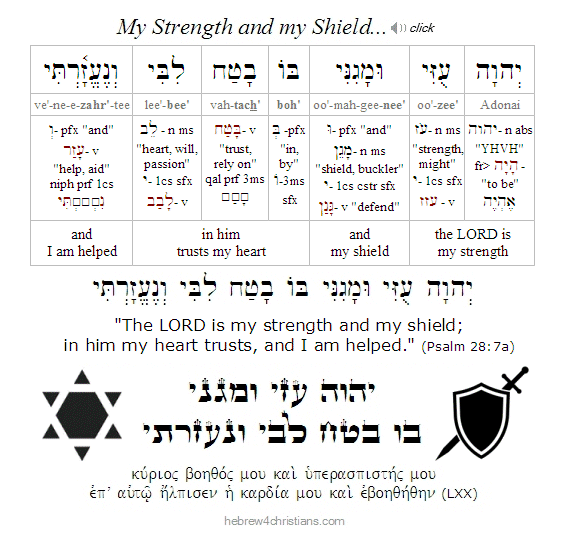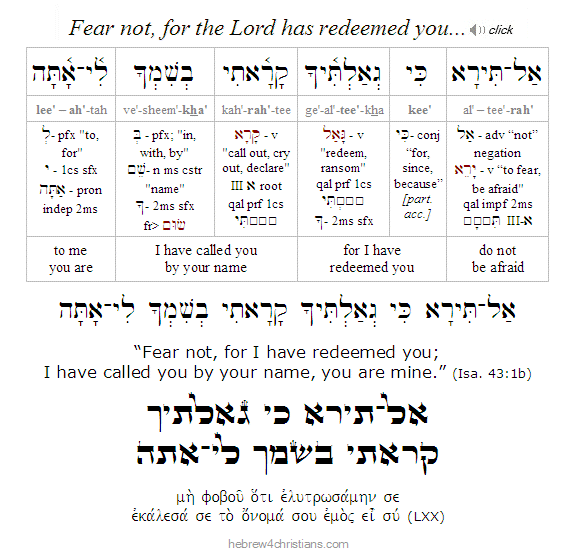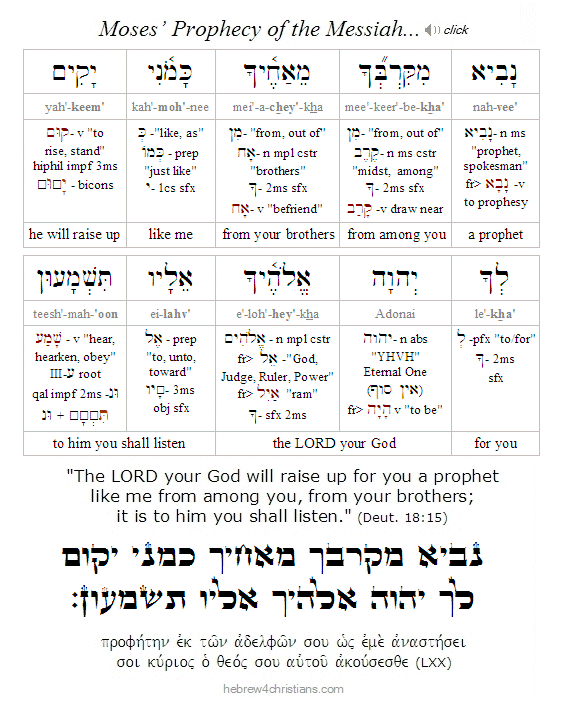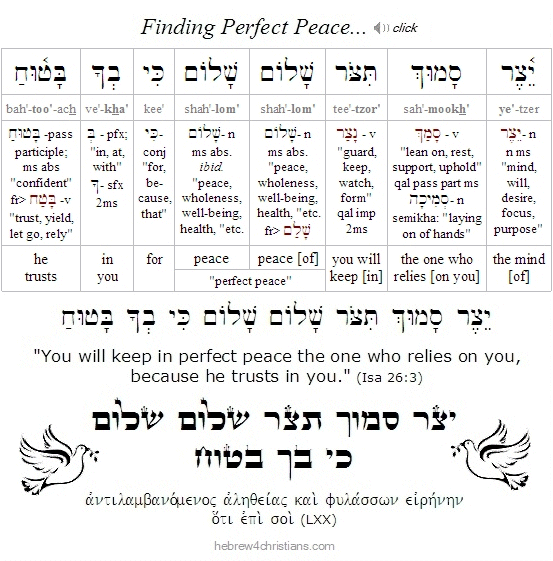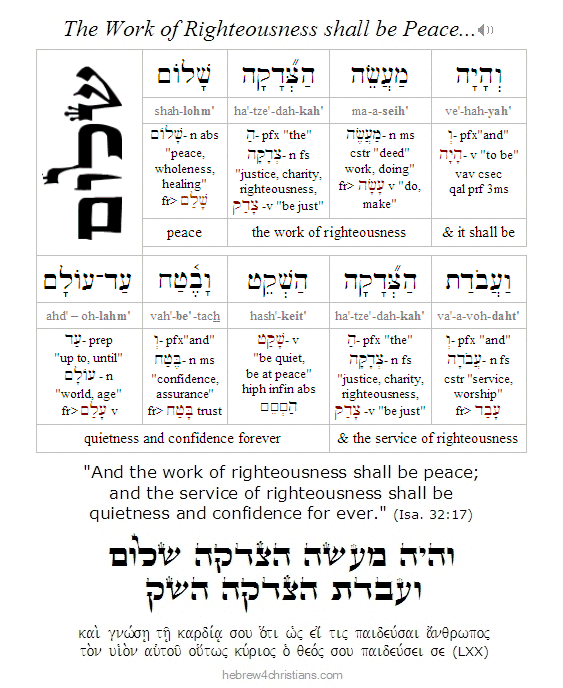|
Jewish Holiday Calendar
For September 2022 site updates, please scroll past this entry....
The Torah divides the calendar into two symmetrical halves: the Spring and the Fall, indicating the two advents of Messiah. The Biblical year officially begins during the month of the Passover from Egypt (called Rosh Chodashim, see Exod. 12:2), and the spring holidays of Passover, Unleavened Bread, and Firstfruits both recall our deliverance from Egypt and also our greater deliverance given by means of the death, burial, and resurrection of the Messiah, the great Passover Lamb of God. Yeshua was crucified on erev Pesach, buried during Unleavened Bread, and was resurrected on Yom Habikkurim (Firstfruits). The holiday of Shavuot (i.e., "Pentecost") both commemorates the revelation of the Torah at Sinai as well as the revelation of the Ruach HaKodesh (Holy Spirit) at Zion, in fulfillment of the promise given by our Lord....
The intermediate months of summer end with the advent of the sixth month of the calendar, called the month of Elul, which recalls the time Moses interceded on behalf of Israel after the sin of the Golden Calf. To commemorate this time of our history, we likewise focus on teshuvah (repentance) in anticipation of Rosh Hashanah and especially in anticipation of Yom Kippur, the great "Day of Atonement." In Jewish tradition the 30 days of Elul are combined with the first ten days of the seventh month (called the "Days of Awe") to set apart "Forty Days of Teshuvah" leading up to the Day of Forgiveness for Israel. Immediately following Yom Kippur, the mood changes as we begin preparing for a joyous week-long celebration called Sukkot (i.e., "Tabernacles") that concludes with the holiday of Simchat Torah.
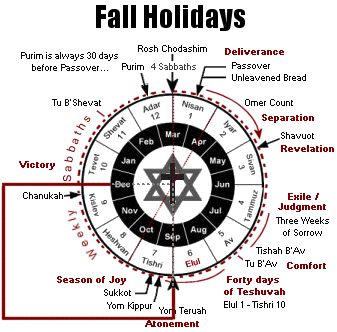 |
The Fall Holidays:

The fall festivals prophetically indicate the Day of the LORD, the second coming of Yeshua, the great national turning of the Jewish people, and the establishment of the reign of the Messiah upon the earth during the Millennial Kingdom in the world to come.
Note that in accordance with tradition, holiday dates begin at sundown. Moreover, some holidays may be postponed one day if they happen to fall on the weekly Sabbath:
1. Month of Elul (Fri. Aug. 26th [eve] - Sun. Sept. 25th [day])
2. Month of Tishri (Sun. Sept. 25th [eve] - Mon. Oct. 24th [day])
3. Month of Cheshvan (Mon. Oct. 24th [eve] - Wed. Nov. 23rd [day])
- Four Sabbaths: Noach, Lekh-Lekha, Vayera, Chayei Sarah
- Yom Ha'Aliyah - Honoring Israel's immigrants (Tues. Nov. 1st; Cheshvan 7)
- Sigd - 50th day after Yom Kippur; Ethiopian Jewish holiday (Tues. Nov. 22nd)
4. Month of Kislev (Wed. Nov. 23rd [eve] - Fri. Dec. 27th [day])
- Four Sabbaths: Toldot, Vayetzei, Vayishlach, Vayeshev
- Winter Solstice: Wed. Dec. 21st (Kislev 27)
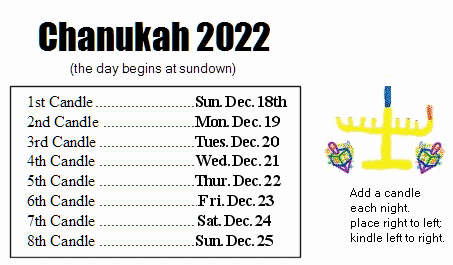
- Dates for Chanukah 2022 (5783):
- 1st Chanukah candle - Sun. Dec. 18th [i.e., Kislev 25]
- 2nd Chanukah candle - Mon. Dec. 19th [i.e., Kislev 26]
- 3rd Chanukah candle: Teus. Dec. 20th [i.e., Kislev 27]
- 4th Chanukah candle: Wed. Dec. 21st [i.e., Kislev 28]
- 5th Chanukah candle: Thurs. Dec. 22nd [i.e., Kislev 29]
5. Month of Tevet (Fri., Dec. 23rd [eve] - Sun. Jan. 26th [day])
- Four Sabbaths: Miketz, Vayigash, Vayechi, Shemot
- Dates for Chanukah (continued):
- 6th Chanukah candle: Fri. Dec. 23rd [i.e., Kislev 30]
- 7th Chanukah candle: Sat. Dec. 24th [i.e., Tevet 1]
- 8th Chanukah candle: Sun. Dec. 25th [Tevet 2] Zot Chanukah
- Christmas - Sat. Dec. 25th (Tevet 2, 5783)
- Asarah B'Tevet - Tues. Jan. 3rd (dawn), 2023; fast over the seige of Jerusalem
- Secular New Year: Sun. Jan. 1st, 2023 (Tevet 8, 5783)
 |
Note: For more about the dates of these holidays see the Calendar pages....
September 2022 Updates
Yom Kippur - Day of Atonement
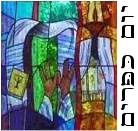
[ This year the Yom Kippur fast begins an hour before sundown on Tuesday, October 4th and lasts until an hour past sundown the following day.... ]
09.30.22 (Tishri 5, 5783) Yom Kippur (יוֹם הַכִּפּוּרִים), or the "Day of Atonement(s)," is regarded as the holiest day of the Jewish year, and provides prophetic insight regarding the Second Coming of the Messiah, the restoration of national Israel, and the final judgment of the world. It is also a day that reveals the High-Priestly work of Yeshua as our Kohen Gadol (High Priest) after the order of Malki-Tzedek (see Heb. 5:10, 6:20). The term Yom Kippur is written in the plural in the Torah, Yom Ha-Kippurim (יוֹם הַכִּפֻּרִים), which alludes to the two great atonements given by the LORD - the first for those among all the nations who turn to Yeshua for cleansing and forgiveness, and the second for the purification of ethnic Israel during Yom Adonai, the great Day of the LORD (יוֹם־יְהוָה הַגָּדוֹל) at the End of Days.
Hebrew Lesson
Gen. 18:14 Hebrew reading (click):
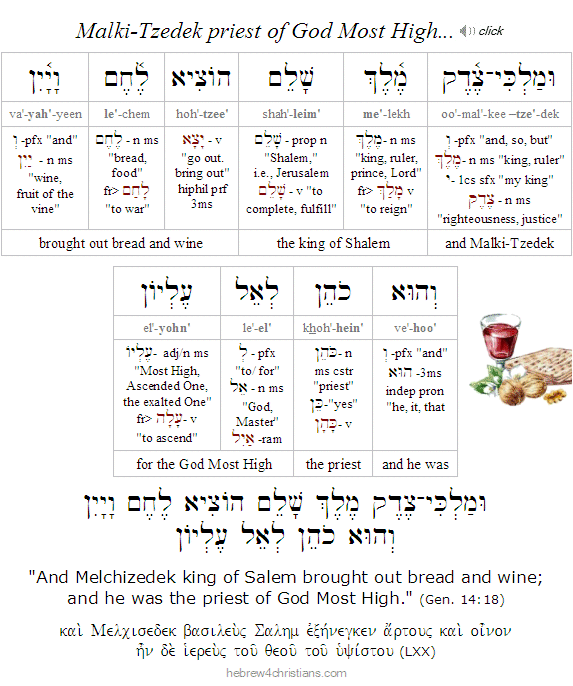 |
For more information, see the Yom Kippur pages.
Atonement and Healing...

[ The holiday of Yom Kippur (Day of Atonement) begins Tuesday, October 4th at sundown... ]
09.30.22 (Tishri 5, 5783) Atonement is about righting the wrong that separates us from God, repairing the breach caused by our sin, and being healed from the curse of death. We all desperately need this healing, yet our own hearts are the source of the trouble (Matt. 15:19-20). The holiness and justice of God (אלהִים) requires that sin be punished by death, but God is also merciful and gracious (יהוה), and therefore He instituted a system of animal sacrifices and blood rituals to provisionally "atone" for sin (i.e., restore the broken relationship with God). Since the life of the flesh is in the blood (Lev. 17:11), and the penalty for sin is death, the shedding of blood represents atonement (i.e., kapparah: כַּפָּרָה) for sin.
With regard to the chatat ("sin offering") or asham ("guilt offering"), a person would bring a kosher animal (korban) to the entrance of the Tabernacle and place both hands on the animal's head to identify with it (Lev. 4:29). This act of "semikhah" (סְמִיכָה) symbolically (i.e., ritually) transferred the penalty of sin and guilt to the sacrificial animal. Then, the person would slay the animal and confess that his sin caused the innocent to be slain in his place (Menachot 110a). The elaborate sacrificial system was intended to depict this "life-for-life" principle: God accepted the blood of a sacrifice in exchange for the life of the sinner...
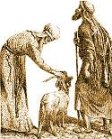
The sacrificial system of the Tabernacle (and later the Temple) was a temporary arrangement until the coming of Messiah, the Promised Deliverer (Gal. 3:24-25; Rom. 10:4; Heb. 9:1-12). The redemption obtained by animal sacrifices was provisional and symbolic, "for it is impossible for the blood of bulls and goats to take away sins" (Heb. 10:4; Micah 6:6). For eternal remedy, for the spiritual life of the soul, something far greater was needed, namely, the sacrifice of God Himself. Consequently, when Yeshua came into the world, he said, "Sacrifices and offerings you have not desired, but a body have you prepared for me," and "'Behold, I have come to do your will, O God, as it is written of me in the scroll of the book" (Heb. 10:5,7).
All this is profoundly mysterious, of course. After all, if the Kohen Gadol (High Priest) could enter the Holy of Holies only once a year to present sacrificial blood upon the kapporet, invoking the Divine Name YHVH, and interceding for God's mercy on behalf of the people, how much more mysterious is Messiah's intercession for us as he willingly shed his own blood and died in exchange for the curse of our sins (Gal. 3:13)? It was there - in the true Holy of Holies, the "greater and more perfect tabernacle not made with hands" (Heb. 9:11), where the blood of Yeshua was poured out to pay the penalty for our sins, and it was there that we are given eternal life and healing (2 Cor. 5:21). Yeshua is the true Temple of God and the Central Sacrifice of God given on our behalf. In ways we simply cannot fathom, the sacrificial death of Yeshua redeems us from the curse of death and makes us alive together with God. We draw near to God through Him alone; he alone is the true High Priest of God, the One who finishes the work of redemption on our behalf in the Temple of his body...
Beware those who would have you return to the terms of the covenant at Sinai (Gal. 3:1). God made a new covenant, not like the covenant made at Sinai (Jer. 31:31-33). The New Testament teaches that Yeshua came to die "for our sins," to heal us from the plague of spiritual death (Heb. 7:27, 9:26; 1 John 3:5). Our sin separates us from God, but Messiah's sacrifice draws us near (Heb. 7:19). The message of the gospel is that the Voice of the LORD - the very Word spoken from between the cherubim above the kapporet (mercy seat) - "became flesh" and "tabernacled among us" (ἐσκήνωσεν ἐν ἡμῖν) for the purpose of becoming our substitutionary sacrifice for the guilt and defilement caused by our sins (John 1:1,14). Yeshua was "born to die" (Heb. 10:5-7), and his life was lived in relation to His sacrificial death (Mark 8:27-33). As the Apostle Paul put it: This is of "first importance": Yeshua was born to die for our sins, to make us right with God, and was raised from the dead to vindicate the righteousness of God (1 Cor. 15:3-4). His sacrificial death eternally draws us near to God, and we can come boldly before God's Presence on the basis of His shed blood for our sins...
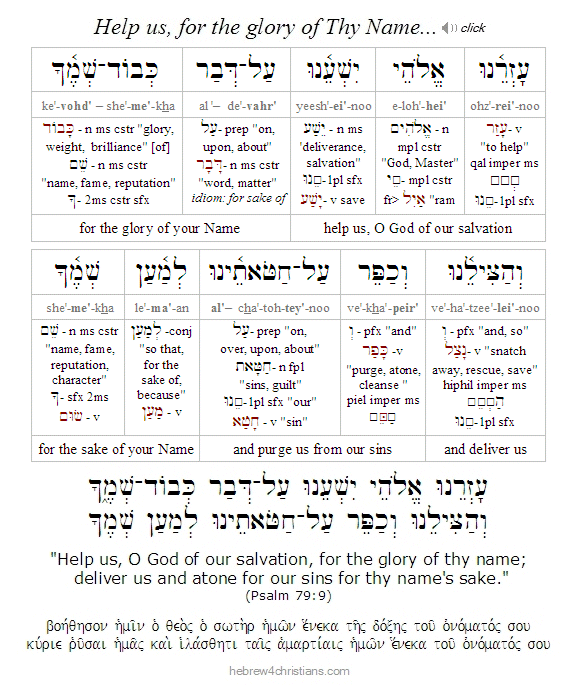 |
The sacrificial system of Torah functions as a parable for us, or a metaphor of God's great redemptive plan revealed in the life and death of Yeshua. The Mercy Seat (kapporet) represents both the Throne of God (Heb. 4:16; 2 Kings 19:15) as well as the cross of Yeshua, where propitiation for our sins was made (Rom. 3:25). The glory of the Torah of Moses was destined to fade away (2 Cor. 3:3-11), just as its ritual center (i.e., the Tabernacle/Temple) was a shadow (σκιά) to be replaced by the greater priesthood of Messiah (Heb. 10:1; 13:10). Yeshua is the Goal and the "Goel" (i.e., גּאֵל, Redeemer) from the curse of the law (Gal. 3:13). "For the law made nothing perfect, but on the other hand, a better hope is introduced, and that is how we draw near (karov) to God" (Heb. 7:19). The sacrificial death of Yeshua caused the parochet of the Temple to be torn asunder, revealing that access to the Presence of God is now available for all who come to God trusting in the finished work of God's Son.
For more on this, see "Why the Sacrifices?" and "Yom Kippur and the Gospel."
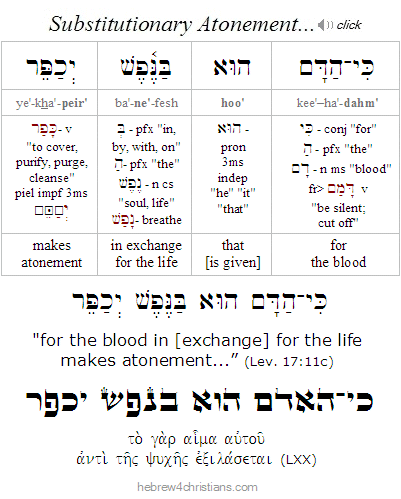 |
The Lamb of Judgment...
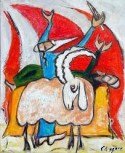
09.30.22 (Tishri 5, 5783) In the Torah we find that the word "love" (i.e., ahavah: אַהֲבָה) first appears regarding Abraham's passion for his son: "Please take your son, your only son Isaac, whom you love (אֲשֶׁר־אָהַבְתָּ), and go to the land of Moriah (מוֹרִיָּה), and offer him there as a burnt offering on one of the mountains of which I shall tell you" (Gen. 22:2). Abraham heard and willingly obeyed, despite being asked to sacrifice his beloved son, the child of promise through whom his descendants would be counted as the stars of heaven.
After journeying three days the place, Abraham told his beloved son Isaac that God would provide a lamb (אֱלהִים יִרְאֶה־לּוֹ הַשֶּׂה), and then they ascended mountain together. Without saying a word, Abraham then carefully bound Isaac, laid him upon an altar, and raised his knife to slay him for a sacrifice to God (Gen. 22:8-10).
At the very last moment, however, the Angel of the Lord called out: "Abraham! Abraham! Do not lay your hand on the lad or do anything to him, for now I know that you fear God, seeing you have not withheld your son, your only son (בֵּן יָחִיד), from me" (Gen. 22:11-12).
Abraham then "lifted up his eyes" (וַיִּשָּׂא אַבְרָהָם אֶת־עֵינָיו) and saw a ram "caught in a thicket" which he then offered in place of his son. Abraham then named the place Adonai-Yireh (יהוה יִרְאֶה), "the LORD who provides" (Gen. 22:14).
The sacrifice of the lamb for Isaac portrayed the coming sacrifice of Yeshua, the great "Lamb of God" (שֵׂה הָאֱלהִים) who would be offered in exchange for the trusting sinner (John 1:29). Indeed the story of how God provided the lamb at Moriah (and later during the Passover in Egypt) foreshadowed the greater redemption given in Messiah at the "Passover cross," and may be understood as the "Gospel according to Moses" (Luke 24:27; John 5:46). Therefore, during Rosh Hashanah, the Day of Judgment (יוֹם הַדִּין), and during Yom Kippur we listen to the shofar (ram's horn) to remind us of the provision of Lamb of God given in place of Isaac.
Hebrew Lesson
Gen. 22:14a Hebrew reading (click):
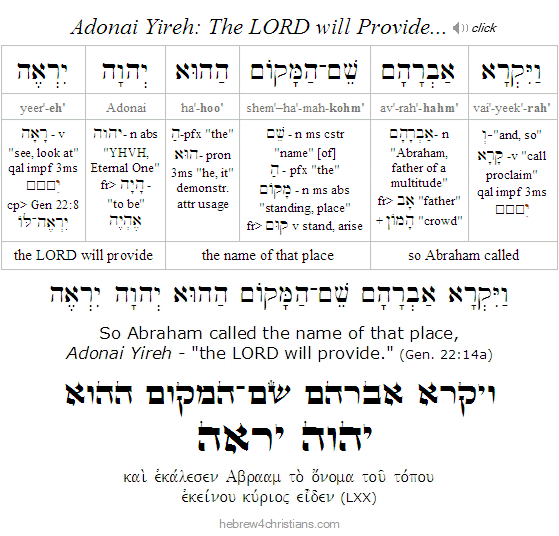 |
Hebrew Lesson
Revelation 5:12 Hebrew reading (click):
Note: For more on this, see "High Holidays and the Gospel."
Choosing to Believe the Good
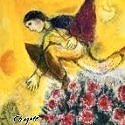
09.29.22 (Tishri 4, 5783) "And now abideth faith, hope, love: these three" (1 Cor. 13:13). The opposite of faith is fear; of hope, despair; and of love, indifference. Fear is the "default mode" of the soul that dwells in darkness. This is because the "fallen" soul regards the empirical world and its flux as ultimately real -- and therefore "sees in order to believe." The life of faith, on the other hand, looks beyond the realm of transient appearance to behold an abiding glory -- and therefore "believes in order to see." How we choose to see is ultimately a spiritual decision for which we are each responsible....
In the geo-political world there are more seemingly good reasons to be afraid today than in any time since the rise of Nazi Germany in the 1930s. Every day the media indoctrinates people about the threats of various plagues (e.g., H5N1, H1N1, SARS, Covid), of economic disasters, of terrorist plots, and so on. In short, living within a "culture of fear" (with its ongoing propaganda campaigns from both the right and left wing perspectives) is to traffic in images and sound bites, inducing a sense of dread and anxiety (as someone once said, "FEAR" is "False Education Appearing Real"). Just as a lie-detector can physiologically sense when people are telling lies, so our souls can sense when we are believing them... There is no neutral ground here, no "transcendent" place of the soul where we can rise above the realm of truth claims: We will either be set free by the truth or else we will live in fear. As Yeshua said, the "Truth shall set you free" (האמת תשחרר אותך).
Of course it isn't easy to be courageous, and the temptation to yield to fear often seems compelling. The test of our faith is of more value to the LORD than our material or emotional comfort, however, and therefore we will all experience tribulation of various kinds. This is the way we obtain heart (i.e., courage). Awhile ago I wrote a Hebrew meditation ("Fear Thou Not") that reminded us that the most frequently occurring commandment in Scripture is simply al tirah (אַל־תִּירָא), "don't be afraid." If living without fear were easy, it would be of little spiritual worth, but since it requires all of our heart, soul, mind, and strength, it is therefore considered precious. It requires, in short, an infinite (and divinely given) passion. And it part of God's plan for us to be "in but not of" the world system, to be alienated, to be misunderstood, to be persecuted... We are called to "take up the cross" and to die daily. Following Yeshua means denying ourselves along the way.
Ultimately fear distills down to the fear of death, or rather, of "the one who has the power of death, namely the devil" (Heb. 2:14-15). If we come to peace with our own finitude, our own mortality, and our eventual end in the Messiah, death has no more power over us. Perhaps this is part of the reason why Christian faith is so hated in communist countries or in other places of absolutist secular ideologies (including "deconstructed" America). If you are free from the greatest threat that man can menace over you, if you are free of the fear of man, then you are free to be a voice crying in the wilderness. The life of truth is something the humanist and atheist can never comprehend.
Fear is the antithesis of faith, though living without fear is certainly not easy. After all, how do we naturally choose to be unafraid of what we in fact fear? Is this power within our conscious control? Only by a miracle are we set free from fear... Indeed, true faith working within the heart is one of the greatest miracles of God. May it please God to impart to each us real courage that comes from Heaven itself. Amen.
Hebrew Lesson:
John 4:18a reading (click):
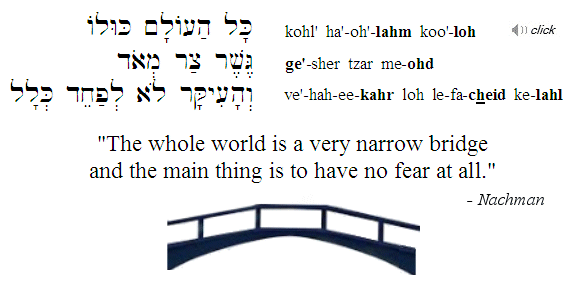
Yom Kippur and Chesed...

[ Yom Kippur begins Tuesday, Oct. 4th an hour before sundown this year... ]
09.29.22 (Tishri 4, 5783) The ten days from Rosh Hashanah through Yom Kippur are known as Aseret Yemei Teshuvah (עֲשֶׂרֶת יְמֵי תְּשׁוּבָה), "the Ten Days of repentance," otherwise called the "Days of Awe" (yamim nora'im) in Jewish tradition. Since man was created for the sake of teshuvah, Yom Kippur, or the Day of "at-one-ment," is considered the holiest day of the year, called "Yom ha-kadosh" (יוֹם הַקָּדוֹשׁ). It is the climax of the 40 day "Season of Teshuvah."
As I've mentioned before, the "Day of Atonement," or Yom Kippur, is actually written in the plural, that is, as Yom Ha-Kippurim (יוֹם הַכִּפֻּרִים), perhaps because the purification process cleansed from a multitude of transgressions, iniquities, and sins. However, the name also alludes to the two great atonements given by the LORD God of Israel - the first for those among all of the nations who turn to Yeshua for cleansing and forgiveness, and the second for the purification of ethnic Israel during Yom Adonai, the great Day of the LORD (יוֹם־יְהוָה הַגָּדוֹל) at the end of days. There is a connection with the holiday of Purim, too, since Kippurim can be read as Yom Ke-Purim, a "day like Purim." Thus the day on which Yeshua sacrificed Himself on the cross is the greatest Purim of all, since through His loving intervention we are eternally delivered from the hands of our enemies...
The Torah refers to Yom Kippur as "shabbat shabbaton" (שַׁבַּת שַׁבָּתוֹן), a time when all profane work is set aside so the soul could focus on the holiness of the LORD. The first occurrence of this phrase is found in Exodus 16:23, regarding the restriction of collecting manna in the desert during the seventh day. This restriction was later incorporated into the law code for the Sabbath day (Exod. 31:15; 35:2). The phrase also occurs regarding Rosh Hashanah (Lev. 23:24), Yom Kippur (Lev. 16:31; 23:32), two days of Sukkot (Lev. 23:39; Num. 25:35), two days of Passover (Lev. 23:7-8), and the day of Shavuot (Num. 28:26). If you add up these days, you will find there are seven prescribed days of "complete rest" before the LORD, and the sages identified Yom Kippur as "the" Sabbath of these other special Sabbath days, that is, "Yom ha-kadosh" (יוֹם הַקָּדוֹשׁ), which occurs on the tenth day of the seventh month of the Torah's holiday calendar. Indeed, the Talmud notes that "seven days before Yom Kippur, we separate the High Priest," corresponding to the seven-day seclusion of Aaron and his sons before the inauguration of the Tabernacle (Lev. 8:33).
All of the Jewish holidays find their origin in the events of the Exodus which were later commemorated as rituals at the Tabernacle. On the first of Nisan, two weeks before the Exodus, the LORD showed Moses the new moon and commenced the divine lunar calendar. This is called Rosh Chodashim. Two weeks later, God was ready to deliver the Israelites from their bondage in Egypt. Earlier that evening the Israelites kept the Passover Seder and sprinkled the blood of the lamb on their doorposts. At the stroke of midnight of Nisan 15 the LORD sent the last of the ten plagues on the Egyptians, killing all their firstborn. On the 6th of Sivan, exactly seven weeks after the Exodus (49 days), Moses first ascended Sinai to receive the Torah (Shavuot). Just forty days later, on the 17th of Tammuz, the tablets were broken. Moses then interceded for Israel for another forty days until he was called back up to Sinai on Elul 1 and received the revelation of Name YHVH (Exod. 34:4-8). After this, he was given the Second Tablets and returned to the camp on Tishri 10, which later was called Yom Kippur. Moses' face was shining with radiance in wonder of the coming New Covenant which was prefigured in the rituals of the Day of Atonement (Exod. 34:10).
 |
Recall that there were two revelations of the Name YHVH, first as "I AM WHO I AM" (a play on the Hebrew verb hayah [הָיָה] given to Moses in Exodus 3:14-15 which was later "incarnated" during the intervention of the Exodus (Exod. 6:1-8)), and the later revelation of YHVH's mercy disclosed after the sin of the Golden Calf (Exod. 34:6-7). It is the later revelation that foretold God's Name of the new covenant, just as the second tablets took the place of the former tablets that were shattered. Ultimately Yeshua is the "wonder" of the covenant of the LORD (Exod. 34:10), the manifestation of the attributes of God's mercy (middot rachamim). For more on this topic see the article, "Yom Kippur and Chesed."
Hebrew Lesson
Exodus 34:6 Hebrew reading (click):
Fearing No Evil...

09.29.22 (Tishri 4, 5783) The devil wants you to be afraid, to be very afraid, and indeed, inciting fear is the primary weapon he uses against us... The devil understands that fear profoundly affects the way the human brain processes images and messages: Fear colors the way we see and hear things. And since the mind and body are intricately interconnected, fear is the root cause of many physiological problems such as heart disease, high blood pressure, clinical depression, and other ailments. Left unchecked, fear can be deadly...
Most of our negative emotions come from fearful thoughts, including anger, frustration, and rage. On a spiritual level, fear and worry can cause people to question God's love, to doubt His promises, and so on. The devil knows that frightening people causes them to be unsettled, off-balance, and therefore vulnerable to all sorts of sickness, manipulation, and deception. Living in fear is a form of slavery (Heb. 2:15).
Logicians call illegitimate appeals to fear argumentum ad baculum, or the "appeal to the stick." When someone plays on your fears, it is wise to discern whether there is any basis in reality for the supposed threat, or if the appeal is simply a rhetorical scare tactic intended to persuade (coerce) you to accept some sort of conclusion. Unscrupulous people such as advertisers, politicians, dictators, community organizers, social activists, and so on, regularly use fear to manipulate public opinion, of course, and they are only too glad to tell you exactly what you should fear. They are delighted to prey upon your anxieties and then offer you their supposed "remedy." You know whom they serve, friends...
The war for truth began in the Garden of Eden, when Satan lied to Eve by saying that she would not die if she disobeyed God (Gen. 3:4). Satan cunningly played on Eve's fear of being deceived to persuade her to disobey. Fear, then, is the emotional center of sin and the opposite of faith. The fearful are referred to as the "unbelieving" and those who "love and make a lie" (Rev. 21:8, 22:15).
God repeatedly tells us not to be afraid – not of man, nor of war, nor of tribulation, nor of various plagues, yea, nor even of death itself (Rom. 8:35-39). Indeed, one of the most frequently occurring commandments in Scripture is simply al-tirah, "Be not afraid."
But how do we overcome our fear? How can we live our faith in the midst of a worldwide cultural slide into deception and insanity? How can we walk in peace while a worldwide tyranny is crafting a globalist police state wherein no one will be able to buy or sell if they are not wholly subservient to the dictates of an unseen power elite? How else but by wholeheartedly trusting that God is with us? The LORD will never leave nor forsake us, even if we are faced with difficult circumstances. The antidote to fear is heartfelt faith in God's love for us (1 John 4:18). God saves us from our fears (Psalm 34:4, 2 Tim. 1:7). When we trust that God personally cares for us, we find comfort and courage to face life without fear.
Hebrew Lesson
Psalm 23:4a Hebrew reading (click):
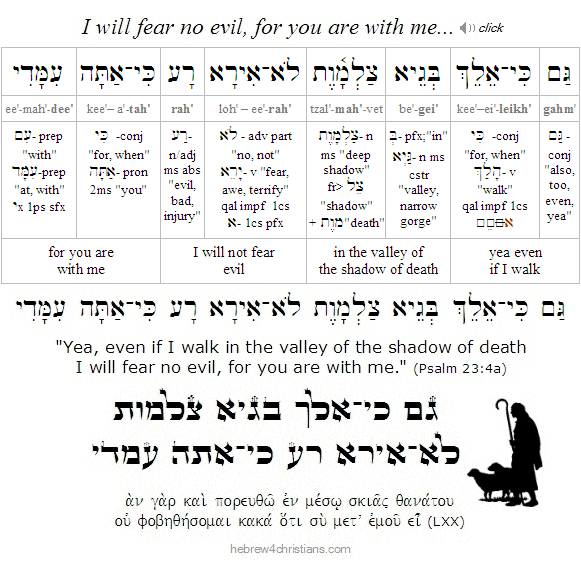 |
Teshuvah of Freedom...
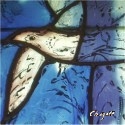
[ "This is the service of men in the world to the very hour of their death: to struggle with the extraneous, and time after time to uplift and fit it into the nature of the Divine Name." - Buber ]
09.28.22 (Tishri 3, 5783) Reading the news of this evil world provides a clear demonstration of Romans 1:28: "Since they did not see fit to acknowledge God, God gave them up to a debased mind to do what ought not to be done." This is the word that describes our godless and brazen generation: "Because they hated knowledge and did not choose the fear of the LORD (יראת יהוה), they refused my counsel and despised my reproof, therefore they shall eat the fruit of their way, and have their fill of their own devices" (Prov. 1:29-1:31). God is patient and loving, of course, though there comes a time when his patience runs out, when -- after repeated warning and appeals -- a culture tragically hardens its heart further and further until God withdraws and people are left to their own vain imaginations and darkened impulses.
A widely accepted maxim of the Talmud is: "All is in the hands of God except the fear of heaven (yirat shamayim)" (Berachot 33b; Niddah 16b). In other words, though God constantly showers the world with grace and light, He does not "force" us to honor His Presence but rather leaves that choice with us. Of course God could overwhelm us all so that we had no choice but to see and fear Him, but He "withdraws" Himself and restrains His influence in our lives so that we can exercise faith. As Blaise Pascal said, "there is enough light for those who want to believe, and enough shadows to blind those who don't." The Hebrew word for seeing (ראה) and the word for fearing (ירא) share the same root. We cannot genuinely "choose life" apart from personally seeing it, but we cannot see it apart from the reverence of God. The reverence of God sanctifies our perception and enables us to see clearly. Therefore the righteous "walk by faith, not by sight" (2 Cor. 5:7).
Hebrew Lesson
Psalm 27:14 Hebrew reading:
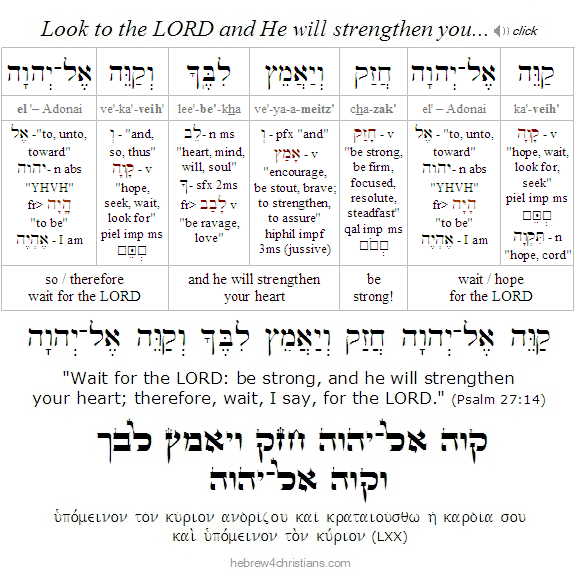 |
Yom Kippur Mercies...

09.28.22 (Tishri 3, 5783) Rosh Hashanah is called Yom Ha-Din (יוֹם הַדִּין), the "Day of Judgment," whereas Yom Kippur is called Yom Ha-Rachamim (יוֹם הָרַחֲמִים), or the "Day of Mercies," which suggests that God is first revealed as our Creator and Judge before He is known as our merciful Savior. This is hinted in the two accounts of creation, where God is first revealed as Elohim (Gen. 1:1), but later is revealed as YHVH (יהוה) when He breathed life into man nishmat chayim, the breath of life (Gen. 2:4). It is somewhat odd, however, that during Rosh Hashanah we do not approach God as our Judge, beating our breast in sorrow during confession of sin, as we do on Yom Kippur. Some say the reason we celebrate, eating special foods, rejoicing, listening to the shofar, is because we rejoice in the kingship of God as His royal children, and only later do we appeal to Him as merciful Judge in light of His revelation as YHVH, our Savior, Redeemer, and Lord. As believers in Yeshua, we have all the more reason to rejoice on Rosh Hashanah, since at the cross Yeshua took upon Himself our judgment to give us everlasting mercy from God. !הַלְלוּ־יָהּ
חסד־ואמת נפגשׁו
צדק ושׁלום נשׁקו
che'·sed ve·e·met neef·gah'·shoo
tze'·dek ve·sha·lom nah·sha'·koo

"Love and truth have met,
justice and peace have kissed."
(Psalm 85:10)

Teshuvah of Messiah...
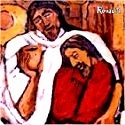
[ "God creates everything out of nothing. And everything which God is to use, he first reduces to nothing." - Soren Kierkegaard ]
09.28.22 (Tishri 3, 5783) "Repent, for the kingdom of heaven has drawn near" (Matt. 3:2). During this "season of teshuvah" (חודש תשובה) it is vital to understand exactly how we are to turn to God to find life.
Some religious people understand "repentance" to mean focusing on themselves, lamenting their sins, and making resolutions to improve their behavior, though this is not the meaning of teshuvah ("repentance") as Yeshua taught, which is turning of the heart in trust of God's love and in the promise of newness of life (John 10:10,28).
"It is no longer 'I' who live but Messiah who lives in me," which means we find life and righteousness in the LORD and not in ourselves -- neither in our resolutions to change, nor in our religious practices, nor even our acts of repentance (Titus 3:5). We are "crucified with" Messiah, and that means the self-life comes to an end (Col. 3:3).
Regarding yourself as separated from God's acceptance will inevitably lead you to the "works of the law" and therefore to the "wheel of sin and death" -- and to despair.
Rightly understood, then, teshuvah cannot be separated from the salvation of the LORD (יְשׁוּעַת יְהוָה), nor can we disregard God's righteousness in the vain attempt to establish our own. Teshuvah receives the miracle of divine exchange: "For our sake he made Him to be sin who knew no sin, so that in Him we might become the righteousness of God" (2 Cor. 5:21).
We do not "reject the grace of God" (Οὐκ ἀθετῶ τὴν χάριν τοῦ θεοῦ) by seeking justification apart from the truth and blessing of Messiah, for He is the one "who loves me and gave himself for me" (Gal. 2:20-21).
The sickness of sin is lethal, and there is no remedy apart from turning to behold Yeshua, the "fiery serpent" lifted upon a stake, the One crucified for our deliverance (Num. 21:8; John 3:14; Gal. 3:13). The teshuvah of God is to turn away from yourself to behold the miracle of God's righteousness given for your sake, and therefore it is a matter of radical faith. "We had the sentence of death in ourselves, that we should not trust in ourselves, but in God who raises the dead" (2 Cor. 1:9). Amen, the verdict of the law condemns us, but God has given us a new covenant (בְּרִית חֲדָשָׁה) in Yeshua the Messiah, "not like the covenant that I made with the fathers on the day when I took them by the hand to bring them out of the land of Egypt" (Jer. 31:31-32), and by means of this new covenant the righteousness of God is given to the one who trusts in sacrificial death of Messiah given on their behalf. "Therefore, if anyone is in Messiah, he is briah chadashah (בְּרִיאָה חֲדָשָׁה), a new creation; the old has passed away; behold, the new has come" (2 Cor. 5:17).
We are told that we must "receive" the life of Yeshua into our hearts, and that is certainly true, but we must also receive his death as well... This is the meaning of "taking up your cross." It is the death of Yeshua in your place that releases you from the tochechah curse of the law (מִקִּלְלַת הַתּוֹרָה), that is, spiritual death, as it is says: "the Messiah has redeemed us from the curse of the law by becoming a curse for us, for it is written, "Cursed is everyone who is hanged on a tree" (Gal. 3:13).
The teshuvah of Yeshua is the miracle of new life; Messiah sets you free from the power of sin and death itself. The repentance of Yeshua is to trust in God's remedy for your sin: "This is the work of God, to believe in the One whom God sent" (John 6:29).
"He saw that there was no man, and wondered that there was no one to intercede; then His own arm brought him salvation, and his righteousness upheld him" (Isa. 59:16). We must turn away from the idea that God demands anything from us other than trust in his love. "Truly, I say to you, unless you turn and become like children, you will never enter the kingdom of heaven" (Matt. 18:3). Stop trying to measure up to his standards. You simply cannot give more than you have the love to give, so you must begin by getting your heart needs met by accepting God's unconditional love. It's not about what you do for God, after all, but about what he does for you. That's the message of the gospel.
Trust that you are rightly related to God because of the salvation of Yeshua, not because of your own efforts at self-improvement. "I tell you the solemn truth, the one who hears my message and believes the One who sent me has eternal life (חַיֵּי עוֹלָם) and will not be condemned, but has passed over (i.e., μετά + βαίνω, lit., "crossed over" [עָבַר]) from death to life" (John 5:24).
We must be careful not to worship an idol, that is, a false concept of God! It is possible to read the Bible, to go to church or synagogue, and yet worship a pagan god. How so? By not knowing the heart of the Father; by not honoring the One who passionately seeks our healing. We know the Father by the Son, that is, in "the language of Son" (Heb. 1:2; Luke 10:21-24). Our heavenly Father is eager to forgive and embrace all of his children.
In Yeshua's famous parable of the "prodigal son," the father saw his child a "long way off" and ran to embrace and kiss him - no questions asked, no explanations needed about his past. When the son nevertheless began reciting his carefully prepared speech of repentance, the father barely listened, and in his overwhelming joy instructed his servants, 'Bring quickly the best robe, and put it on him, and put a ring on his hand, and shoes on his feet. And bring the fattened calf and kill it, and let us eat and celebrate. For this my son was dead, and is alive again; he was lost, and is found...' (Luke 15:20-25).
Hebrew Lesson
Ezekiel 36:26a Hebrew reading (click):
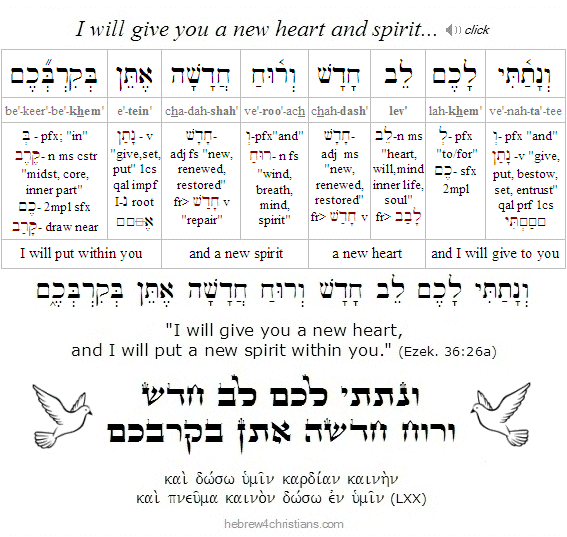 |
Teshuvah of Peace...

09.28.22 (Tishri 3, 5783) It is written in our Scriptures (2 Tim. 1:7) that "God has not given us the spirit of fear (πνεῦμα δειλίας), but of power, and love, and a sound mind" (note that the term "sound mind" comes from the word saos (σάος) "safe," or under the protective restraining influence of the Spirit of God). Understand the connection between fear and confusion, then, and note further the connection between having a sound mind and a heart of peace and courage (Isa. 32:17)... A fearful or shameful attitude, then, enervates your resolve, quells your love, and introduces pain to your thinking. It is the old ruse of the enemy of our souls to lead us to despair, the exile of shame, and cruel bondage to untruth. As always the answer is the same: namely, teshuvah, turning to God and embracing the grace and love given in Yeshua as our deepest reality, our power, our heart, and our mind.
Hebrew Lesson
Psalm 25:2 Hebrew reading (click):
Our Father, Our King...
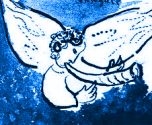
[ "Creation does not merely take place once in the beginning but also at every moment throughout the whole of time." - Martin Buber ]
09.28.22 (Tishri 3, 5783) Both the Torah of Moses and the New Testament attest that Yeshua is "Elohim" (אֱלהִים) -- the Creator of the cosmos: בְּרֵאשִׁית הָיָה הַדָּבָר / "in the beginning was the Word" (John 1:1,14). The Divine Word and Voice cannot be separated from God any more than the Spirit of God can be separated. Yeshua is the Source of all life in the universe: כָּל־הַמַּעֲשִׂים נִהְיוּ עַל־יָדוֹ / "All things were made by Him (John 1:3). The "Word made flesh" is the "image of the invisible God" and the "radiance of the glory of God and the exact imprint (χαρακτήρ, 'character') of his nature" (Col. 1:15). All of creation is being constantly upheld by the word of His power (Heb. 1:3): "All things were created by Him (i.e., Yeshua), and for Him" and in Him all things consist (συνεστηκεν, lit. "stick together") (Col. 1:16-17). As our Creator and Master of the Universe, Yeshua is both our King and our Judge, and therefore both Rosh Hashanah (i.e., Yom Teruah) and Yom Kippur center on Him.
But in addition to God's power and sovereignty as our Creator, we note that the Scriptures begin and end with the redemptive love of God. Yeshua is the Center of Creation - it's beginning and end. As it is written: אָנכִי אָלֶף וְתָו רִאשׁוֹן וְאַחֲרוֹן ראשׁ וָסוֹף / "I am the 'A' and the 'Z,' the First and the Last, the Beginning and the End" (Rev. 22:13). In Hebrew, 'A to Z'' would be rendered as 'Alef to Tav' (את), the direct object marker, the "point" and center of Reality. Indeed, Yeshua is מֶלֶךְ מַלְכֵי הַמְּלָכִים / Melech Malchei Hamelachim: The "King of kings of kings." He is LORD of all possible worlds -- from the highest of celestial glories to the very dust of death upon a cross... יְהִי שֵׁם יהוה מְברָךְ / yehi shem Adonai mevorakh: "Let the Name of the LORD be blessed" forever and ever (Psalm 113:2).
The central point of all true Torah, then, is the redemptive love of God demonstrated in the "first and last" (את) principle of sacrificial life. This was prefigured in the original paradise when Adam and Eve were clothed by the lamb that was sacrificed for their transgression (Gen. 3:21), and the theme continues throughout the Torah, for example, in the account of the sacrifice of Isaac (we blow the shofar on Rosh Hashanah to recall the Lamb of God given in his place), in the visions of Jacob, in the commissioning of Moses, in the redemption from death by the blood of the sacrificed lamb in Egypt, and by the climactic revelation of the altar (מִזְבֵּחַ) given at Sinai (i.e., the Tabernacle). Just as the "korban tamid" of the Temple (i.e., the continual sacrifice of the lamb upon the altar) recalled the original Passover and foretold of the Lamb of God to come, so Yeshua, the "Living Torah" (התורה החיה) embodied the Sacrificial Life itself, the true Lamb of God that was offered upon the stigma of the cross, to demonstrate God's infinite condescension, mercy and love that redeems the world from sin and death. Just as there is no Passover apart from the Lamb, so there is no "Rosh Hashanah" or "Yom Kippur" apart from God's atoning love given in the Messiah... Now THAT is something for us to make a "teruah," or a "joyful noise" in praise to our God!
Hebrew Lesson
Psalm 113:2 Hebrew reading (click):
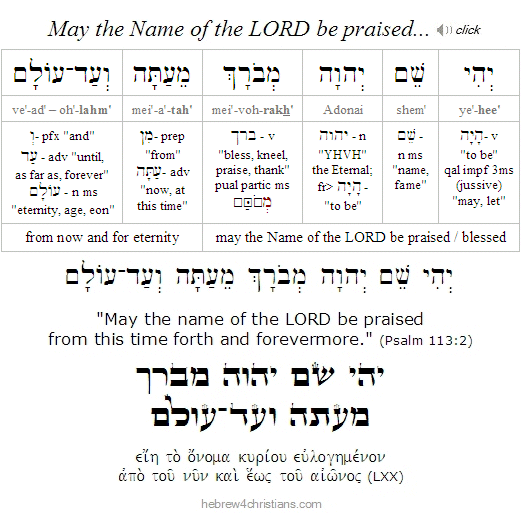 |
Shavuah Tov Podcast:
Parashat Vayeilech...
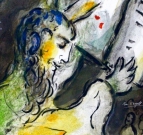
09.27.22 (Tishri 2, 5783) In the "Shavuah Tov" audio broadcast for parashat Vayeilech I take some to discuss both the Jewish High Holidays -- and how they relate to us as followers of Yeshua the Messiah -- as well as themes from the weekly Torah portion. I hope you will find it helpful. L'Shanah Tovah u'Metukah b'Yeshua Meshicheinu, chaverim! - "to a good and sweet year in our Messiah Yeshua, friends."
Parashat Vayeilech (פרשת וילך)
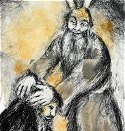
09.27.22 (Tishri 2, 5783) In last week's Torah reading (i.e., parashat Nitzavim), Moses formally gathered the people of Israel together to ratify their covenant with the LORD. Moses then pled with the people bacharta ba'chayim - to "choose life" by pursuing the path of obedience to the Torah and its commandments. If the Israelites would do so, they would be blessed and prosper as God's chosen nation; but if not, they would be subjected to hard exile, persecution, and the threat of utter destruction.
In this week's portion (i.e., parashat Vayeilech), Moses announced his impending death and transferred the leadership of the Jewish nation to Joshua (יְהוֹשֻׁעַ), a type of Messiah who would bring Israel into the promised land. Moses continued his speech but foresaw that despite his appeals, the people would turn away from the covenant, which would cause God's face to turn away: "And hiding I will hide My face (הַסְתֵּר אַסְתִּיר פָּנַי) on that day, because of all the evil they have committed" (Deut. 31:18). The sages note this verse is grammatically unusual because of the double use of the word "hide." If you do not know that God is "hiding," you will not seek for Him; but if you sense within your heart that God is hiding, you are invited to return to Him, as King David said, "When you said to my heart, 'Seek my face;' my heart said to You, 'Your face, LORD, will I seek' (Psalm 27:8).
Hebrew Lesson
Psalm 27:8 reading (click):
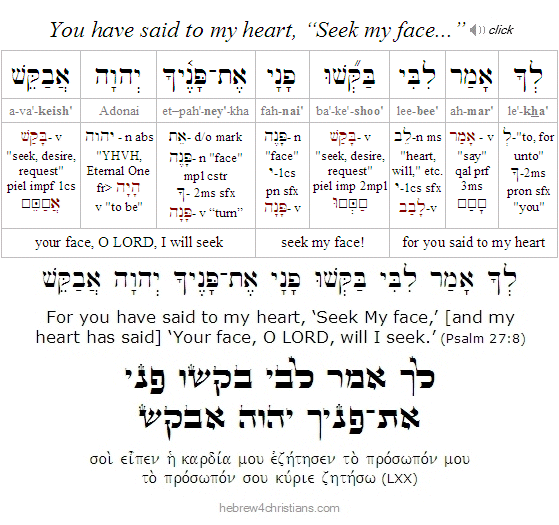 |
In this connection we note that Yeshua often spoke in the form of a parable (παραβολή) to "code" his meaning, to make it accessible only to those who were genuinely willing to make comparisons, to reason analogically, and so on (Isa. 1:18; 1 Cor. 2:13). He used "indirection," allusion, allegory, and "figures of speech" (παροιμία, lit. "[speech] beyond the usual way"), in order to provoke people to explore and ask the hard questions about life... "Truly, you are a God who hides himself, O God of Israel, the Savior" (Isa. 45:15).
"For God so loved the world" that He disguised himself as a bondservant to die in shame upon a cross; "God so loved the world" that he became entirely unesteemed -- "despised and rejected of men, a man of sorrows, acquainted with grief" (Isa. 53:3). Yet even Moses foresaw the stupor of the people in relation to the truth of God (Deut. 29:4). Regarding the "hiding of face," in His sovereign judgment God decreed: "They know not, nor do they discern, for he has smeared their eyes so that they cannot see, and their hearts, so that they cannot understand" (Isa. 44:18). God "gave them over to their stubborn hearts, to follow their own devices" (Psalm 81:12; Rom. 1:24); they went "backward and not forward" (Jer. 7:24). This was not a blindness induced by the "god of this world" as much as it was a darkness induced by the flesh and its apathy toward God. The mind became dull and sleepy because it ceased to believe in the miracle - and to realize that God's truth is always something extraordinary, spectacular, and wonderful...
 |
Shabbat Shuvah - שבת שובה
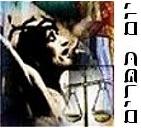
09.27.22 (Tishri 2, 5783) The Sabbath between Rosh Hashanah and Yom Kippur is called Shabbat Shuvah - "The Sabbath of Return." It is called "shuvah" because the Haftarah (Hosea 14:1-9) begins, Shuvah Yisrael ad Adonai Elohekha (שׁוּבָה יִשְׂרָאֵל עַד יְהוָה אֱלהֶיךָ): "Return, O Israel, unto the LORD your God!" Since this Sabbath occurs before Yom Kippur, it is customary to listen to a sermon from an honored Torah sage calling for teshuvah (repentance) at this time. "Seek the LORD while he may be found; call upon him while he is near. Let the wicked forsake his way, and the unrighteous man his thoughts; let him return to the LORD, that he may have compassion on him, and to our God, for he will abundantly pardon" (Isa. 55:6-7).
שׁובה ישׂראל עד יהוה אלהיך
כי כשׁלת בעונך
shoo·vah · yees·rah·el · ad · Adonai · e·loh·hey'·kha
kee · kha·shal'·ta · ba'·a·voh·ne'·kha

"Return, O Israel, to the LORD your God,
for you have stumbled because of your iniquity."
(Hosea 14:1)

Click for a Hebrew reading lesson:
The haftarah portion for Shabbat Shuvah is composed of selections from two books of Prophets: Hosea, and either Joel or Micah (depending on Ashkenazic or Sephardic custom). Ashkenaz read Hosea 14:1-9 and Joel 2:15-27; Sephardim read Hosea 14:1-9 and Micah 7:18-20. Other than the additional haftarah, the service on this Shabbat is not any different from a regular Shabbat, though the theme of teshuvah is of course central.
The Book of Life...

09.26.22 (Tishri 1, 5783) The Scriptures teach that every word we speak and every choice we make are infallibly recorded in "heavenly scrolls," and one day these scrolls will be opened as a testimony about what we did with our lives (Dan. 7:10; Matt. 12:36-37; 1 Cor. 3:13, 4:5). "And I saw the dead, both the great and the small, standing before the throne, and books were opened. Then another book (סֵפֶר אַחֵר) was opened, which is called the Book of Life (i.e., sefer ha'chayim: סֵפֶר הַחַיִּים). And the dead were judged by what was written in the books, according to what they had done" (Rev. 20:12).
In this vision of the great Day of Judgment to come, notice that there was "another book" opened during the judgment called the "Book of Life," and later we learn that only those whose names were found written in this book would be granted access to the glories of the heavenly Jerusalem (Rev. 21:27). But what is this book and how can our names be inscribed in it so that we can partake of the future glory?
The Lamb's Book of Life (סֵפֶר הַחַיִּים אֲשֶׁר לַשֶּׂה) refers to "the record" (i.e., the words and deeds) of Yeshua our Messiah, the true Lamb of God, and therefore the book represents the final attestation - or "sworn testimony" - of the worthiness of God's own righteousness and salvation. In the great plan of God's salvation for the world, Yeshua was "born to die" as our atoning sacrifice for sin (Heb. 10:7-5). "God made the one who did not know sin to be sin for us, so that in him (ἐν αὐτῷ) we would become the righteousness of God" (2 Cor. 5:21). But note that we must be "in him," that is, fully identified with Yeshua so that his sacrificial death becomes counted as our own... Our identification in him means that our sin is "imputed" to his suffering and death upon the cross, just as his righteousness is "imputed" to us through the vindication of his resurrection. This is the essence of the "korban principle" of "life-for-life" - the innocent sacrificed for the guilty - that was the foundation of the sacrificial system of the Temple. By faith, the substitutionary death of Yeshua is "for you."
"Those who feared the LORD spoke with one another. The LORD paid attention and heard them, and a book of remembrance was written before him of those who feared the LORD and esteemed his name. "They shall be mine, says the LORD of hosts, in the day when I make up my treasured possession, and I will spare them as a man spares his son who serves him. Then once more you shall see the distinction between the righteous and the wicked, between one who serves God and one who does not serve him" (Mal. 3:16-18).
Hebrew Lesson
Psalm 39:12 Hebrew reading (click):
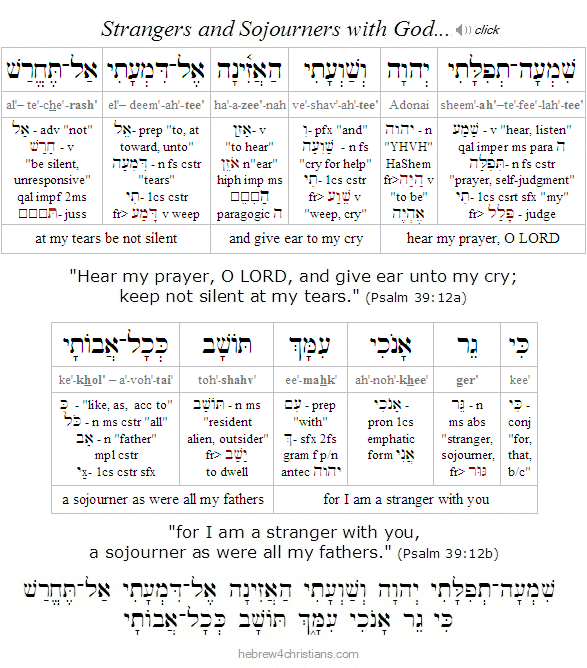 |
Note: For more see, "The Book of Life: Finding your name in the pages of redemption."
Return to Sanity...
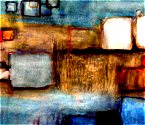
09.26.22 (Tishri 1, 5783) "Hear, O heavens, and give ear, O earth: for the LORD hath spoken, I have nourished and brought up children, and they have rebelled against me.... Ah, sinful nation, a people laden with iniquity, offspring of evildoers, children who deal corruptly! They have forsaken the LORD, they have despised the Holy One of Israel, they are utterly estranged. Why will you still be struck down? Why will you continue to rebel? The whole head is sick, and the whole heart faint. From the sole of the foot even to the head, there is no soundness in it, but bruises and sores and raw wounds... Your country lies desolate; your cities are burned with fire; in your very presence foreigners devour your land; it is desolate, as overthrown by foreigners...." (Isa. 1:2-7).
Jeremiah the prophet cried out on behalf of God: "Hear this, O foolish and senseless people, who have eyes, but see not, who have ears, but hear not. Do you not fear me? declares the LORD. Do you not tremble before me? Therefore "hear, O earth; behold, I am bringing disaster upon this people, the fruit of their devices, because they have not paid attention to my words; and as for my Torah, they have rejected it" (Jer. 5:21-25).
Repentance is a return to sanity which begins with the resolution to question your presuppositions and to change your thinking... There are three requirements for genuine repentance, that is, for turning to God in the truth, namely: 1) seeing eyes; 2) hearing ears; and 3) an understanding heart, ready to be healed (see Isa. 6:10). God alone does the miracle but it is nevertheless our responsibility to believe that the miracle is personally for us. Repentance is the first step of salvation, as Messiah said: "Repent and believe in the good news" (Mark 1:15), and apart from repentance man has no real existence. As Yeshua said, "Truly, truly, I say to you, unless one is born again he cannot see the kingdom of God" (John 3:3). Repentance is the expression of trust in God's love, and by means of it we affirm: "I am ready to exist as a person of worth." Come alive, friends!
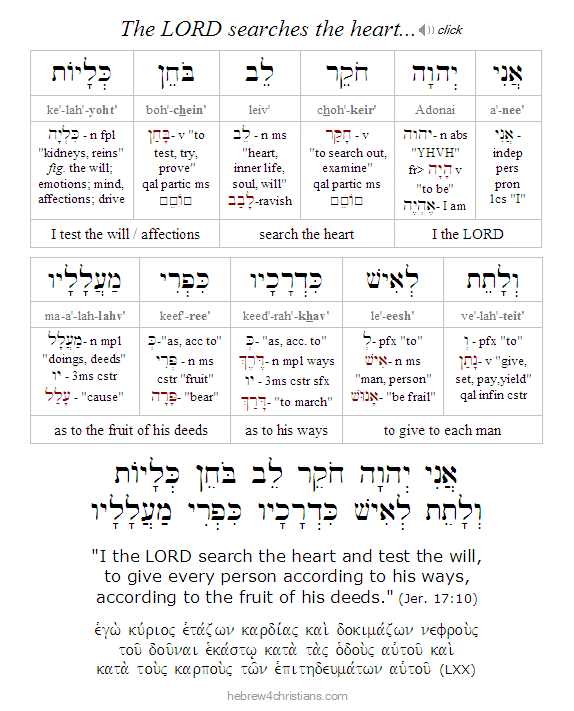 |
About Rosh Hashanah...
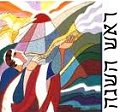
09.25.22 (Elul 29, 5782) Let me begin this entry by quoting a passage of Scripture from the New Testament that admonishes us to remember our shared heritage with the Jewish people: "Brethren, I do not want you to be unaware that all our fathers were under the cloud, all passed through the sea, all were baptized into Moses in the cloud and in the sea, all ate the same spiritual food, and all drank the same spiritual drink. For they drank of that spiritual Rock that followed them, and that Rock was Messiah. But with most of them God was not well pleased, for their bodies were scattered in the desert. Now these things became our examples, to the intent that we should not lust after evil things as they also lusted. And do not become idolaters as were some of them. As it is written, "The people sat down to eat and drink, and rose up to play." Nor let us commit sexual immorality, as some of them did, and in one day twenty-three thousand fell; nor let us tempt Messiah, as some of them also tempted, and were destroyed by serpents; nor complain, as some of them also complained, and were destroyed by the destroyer. Now all these things happened to them as examples, and they were written for our admonition, upon whom the ends of the ages have come. Therefore let him who thinks he stands take heed lest he fall" (1 Cor. 10:1-12).
"The secret things belong to the LORD our God, but those things which are revealed belong to us and to our children forever, that we may do all the words of this law" (Deut. 29:29).
The very first word of the Bible -- the very first utterance of revelation -- is the Hebrew word "beresheet" (בְּרֵאשִׁית), which is commonly translated as "in the beginning" (Gen. 1:1). Note then that the Bible begins the account of creation using a word about time... That might seem a bit unsurprising or even trite, a little bit like saying "Once upon a time..." but it clearly indicates the significance of time in relation to the divine revelation given to us...
As we learn the Torah, which is the foundation of the other Scriptures of the Bible (including the New Testament), we repeatedly are instructed to sanctify (i.e., honor) certain occasions throughout the year. These are called "appointed times," or mo'edim in Hebrew, from a root word (יָעַד) that means to assemble together, to meet, and even to betroth... The first occurrence of the root occurs in the account of the creation when God said: "Let there be lights in the firmament of the heavens to divide the day from the night; and let them be for signs and seasons (i.e., mo'edim), and for days and years" (Gen. 1:14).
These appointed times were designed by God to be special occasions for human beings to have fellowship with him. Indeed, after God created Adam and Eve in the orchard of Eden, he explained that the Sabbath day was to be set apart in honor of the creation. God also regularly met with Adam and Eve in the "wind of the day" (i.e., לרוּחַ הַיּוֹם, Gen. 3:8) to instruct them about their responsibilities as his stewards of creation. God's teachings to Adam and Eve were later preserved as traditions within the godly line of Seth who had observed the "new moon" of the months and commemorated seasonal transitions. Similarly, the earliest forms of Passover celebrated the beginning of spring, Pentecost celebrated the first spring harvest, Sukkot (i.e., Tabernacles) celebrated the fall harvest, and so on. During these special times sacrifices to God were offered and feasts celebrated.
Moses did not write in a vacuum, of course, and he was quite familiar with the heritage of the godly line of Seth handed down through Noah's son Shem and his descendants. The ancient appointed times were later codified and sanctioned by God when Moses wrote the Torah during the years of the Sinai revelation. Therefore we note the Torah's calendar is divided into 360 days, 54 weeks, 12 months, 4 seasons, and 2 half-years.
There are two distinct "new years" on the Torah's calendar: one in the spring, on the first day of the month of Nisan, called "Rosh Chodashim" (Exod. 12:2; Deut. 16:1), which marks the season of the redemption from Egypt, and the other in the fall, precisely six full months later, on the first day of the month of Tishri, called "Yom Teruah" (Num. 29:1), a day to be celebrated by shouting (teruah) and the sounding of shofars and trumpets (Lev. 23:24).
Now the new year in the spring remembers the Exodus from Egypt (Passover) and the crossing of the sea, culminating in the 49 day (seven week) countdown to the giving of the law at Sinai (Shavuot / Pentecost), whereas the new year in the fall remembers God as our Creator, our Judge, the one who purifies us from sin (Yom Kippur), as well as the one who restores us to fellowship and surrounds us with his love (Sukkot / Tabernacles). (Note that the eight days of Passover in the spring correspond with the eight days of Sukkot in the fall.)
It has been said that the liturgy of the Jew is the calendar, and the two new years, then, serve as two axes upon which turn the theme and tone of the calendar year. For instance, we begin getting ready for the Passover every year just after the holiday of Purim. We then plan our house cleaning, the removal of chametz, and we review the story of the exodus from Egypt to ready ourselves for the Passover. During Passover we abstain from leaven and begin the countdown for seven weeks until we reach the jubilee of Shavuot, or Pentecost - recalling how God gave us the law at Sinai and made covenant with us to be his holy people.
The intervening summer months offer time for reflection, recalling the various tragedies that befell the Jewish people, such as the incident of the Golden Calf (Exod. 32:4) the tragic "Sin of the Spies" (Num. 14:22-34), and (later) the destruction of the Holy Temple (2 Kings 25; Jer. 52:12-16). The summer culminates in the sixth month of the calendar, called the month of "Elul." During this month we focus on "teshuvah" or turning back to God in repentance... Sermons are given admonishing us to repent; our Torah portions warn of the "great rebuke" (i.e., tochachah) that Moses warned would come if we turned away from God, and so on.
Because of this, Rosh Hashanah (another name for Yom Teruah) became associated with the time of divine judgment - the advent of Yom Adonai, or the "Day of the LORD" - wherein each soul would be examined by God in relation to his or her teshuvah and the decree established whether their soul would live or die in the forthcoming year.... Customs arose about making amends with others and joining in corporate confession of sin at this time.
According to Jewish tradition, on Rosh Hashanah the destiny of the righteous, the tzaddikim, are written in sefer ha'chayim, the Book of Life, and the destiny of the wicked, the resha'im, are written in sefer ha'mavet, the Book of Death. However, most people will not be inscribed in either book, but have ten days -- until Yom Kippur -- to repent before sealing their fate. Hence the term "Aseret Yemei Teshuvah" (עֲשֶׂרֶת יְמֵי תְּשׁוּבָה) - the Ten Days of Repentance arose in the tradition. On Yom Kippur, then, everyone's name will be sealed in one of the books.
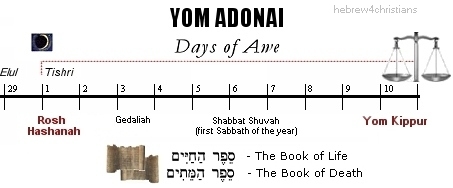 |
So from Rosh Hashanah until Yom Kippur there are ten days which provides a "last chance" to turn to God for forgiveness and reconciliation. Just five days after Yom Kippur, the joyous occasion of Sukkot begins - an eight day festival that rejoices over God's care and forgiveness of us, and that looks forward to the blessings of the world to come in heavenly Zion.
The intervening months of winter include the holiday of Chanukah, calling us to rededicate our lives to God, kindling lights during the darkest season to recall God's victory over the powers of darkness. Later the holiday of Purim occurs exactly one month before Passover, thereby restarting the cycle of the calendar for the advent of the new year of spring once again...
Yeshua observed the calendar given in the Torah, of course, and his ministry expressed its deeper meaning for those he came to save. The spring holidays (i.e., Passover, Firstfruits, and Shavuot) foretold his coming as "Mashiach ben Yosef," the Suffering Servant, who would die for our sins, be raised from the dead, and would commission the Spirit of God to write the law upon our hearts (Jer. 31:33). These things have been fulfilled in his first coming. The fall holidays will be fulfilled in his second coming as "Mashiach ben David," the Son of David, who will overthrow the oppressor Satan and establish the kingdom of God upon the earth.
We are presently living in the "summer of harvest" (John 4:35) when all the nations are given opportunity to turn to the Lord and be saved. These are also called days of Messiah's grace... The Shofar blast of Yom Teruah signifies the "catching away" of God's people, collectively called "the Bride of Christ," for the time of Sheva Berachot (seven "days" of blessing that follows the marriage ceremony). Then will come the Great Tribulation and the Day of the LORD.
Rosh Hashanah has prophetic significance for us, then, since it commemorates both the creation of the universe by God as well as the "calling up" of the new creation at the behest of Yeshua, when the sound of the heavenly shofar inaugurates the anticipated End of Days (1 Cor 15:51-54; 1 Thess. 4:15-18). It also prefigures the coming Day of the LORD (יוֹם יְהוָה) and Great Tribulation period that marks God's judgment on an unbelieving world... Maranatha.
Hebrew Lesson
Numbers 29:1 Hebrew reading (click):
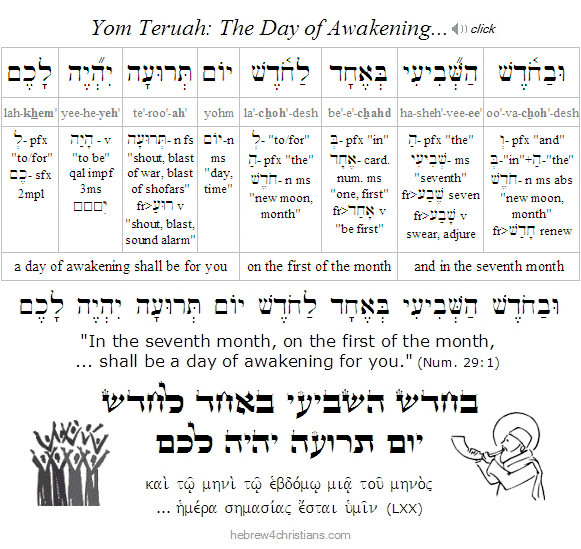 |
The Shofar and Teshuvah...

09.23.22 (Elul 27, 5782) The shofar (ram's horn) is often used as an instrument of spiritual warfare, though it is primarily used to rouse the soul to face reality... Maimonides writes: "There is a hidden message we are supposed to infer by listening to the shofar. It suggests to say: 'Sleeping ones! Awaken from your sleep! Slumbering ones! Awaken from your slumber! Examine your deeds. Remember your Creator and do teshuvah." This idea was earlier stated in the New Testament writings: "Awake, O sleeper, and arise from the dead, and Messiah will shine on you" (Eph. 5:13-14). This theme of "awakening from sleep" is used elsewhere in the Scriptures (e.g., John 11:11, Rom. 13:11, 1 Thess. 5:6, Dan. 12:1-2, Psalm 78:65, etc.). The sound of the shofar calls us to return to the LORD and seek His face. And since finding God is our greatest joy, King David rightly wrote: "Happy is the people who know the teruah [i.e. the shofar blast]" (Psalm 89:16).
Indeed, the word shofar (שׁוֹפָר) comes from a root (שָׁפַר) that means to "amend" or "reform," alluding to the beautification of our ways as we turn to God in teshuvah. "In this month (i.e., the seventh month of Tishrei) you shall amend (shapperu) your deeds. The Holy One, blessed be He, said to Israel: 'If you will amend (shippartem) your deeds I shall become unto you like a horn (shofar). As the horn takes in the breath at one end and sends out at the other, so will I rise from the Throne of Judgment and sit upon the Throne of Mercy and will impart for you the Attribute of Justice (Elohim) into the Attribute of Mercy (YHVH).' (Vayikra Rabbah: 29:6)
Hebrew Lesson
Psalm 89:15 Hebrew reading (click):
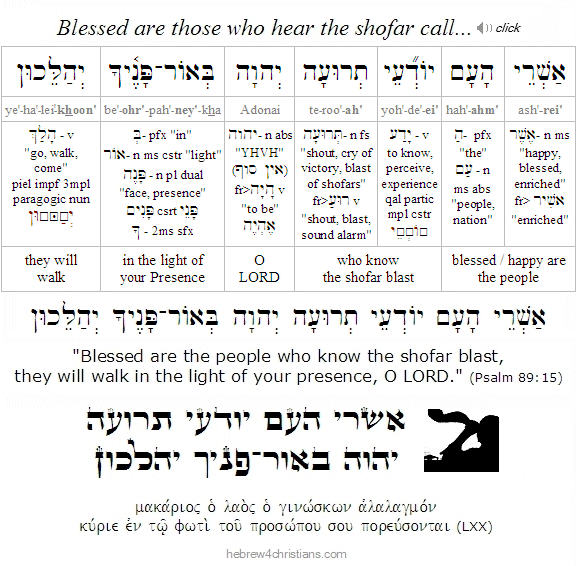 |
Note: For more on this subject see: "The Significance of the Shofar."
From Faith to Faith...

09.23.22 (Elul 27, 5782) If you were ask to God for just one thing, what would it be? Our deepest yearnings are like prayers. Whatever the heart genuinely seeks, it will find. The person who pursues righteousness will find it, just as evil comes to the person who searches for it (Prov. 11:27). Therefore the voice of wisdom cries out, "I love those who love me, and those who seek me diligently find me" (Prov. 8:17), and the prophet shouts, "Seek the LORD while he may be found, call upon him while he is near" (Isa. 55:6). God is near to us in Yeshua, who said, "Ask, and it will be given to you; seek, and you will find; knock, and it will be opened to you. For everyone who asks receives, and the one who seeks finds, and to the one who knocks it will be opened." As you believe, so you will receive (Matt. 21:22).
This is the "like for like" principle of faith. Forgive us as we forgive; judge us as we judge; love us as we love; make us righteous as we take hold of righteousness, give us courage as we believe, and so on. As Isaiah said to fearful king Ahaz: "If you will not be firm in faith, you will not be firm at all" (Isa. 7:9). Your "amen" echoes the "amen" of heaven: "Let it be done for you according to your faith" (Matt. 9:29).
The principle of "let it be according to your faith" is profound and is a two-edged sword, since it applies not just to matters of velleity and hope, but also to murmurs of the heart and discontent. The sages said that the manna in the desert would taste good or bad depending on the heart attitude of the person. Likewise, when the people arrived at Marah, they could not drink the water because it was "bitter" (מָרָה), though the Hebrew text allows us to read that it was the people themselves who were bitter - ki marim hem (כִּי מָרִים הֵם), and their bitterness made the waters seem bitter as well (Exod. 15:23).
Hebrew Lesson
Prov. 21:21 Hebrew reading (click):
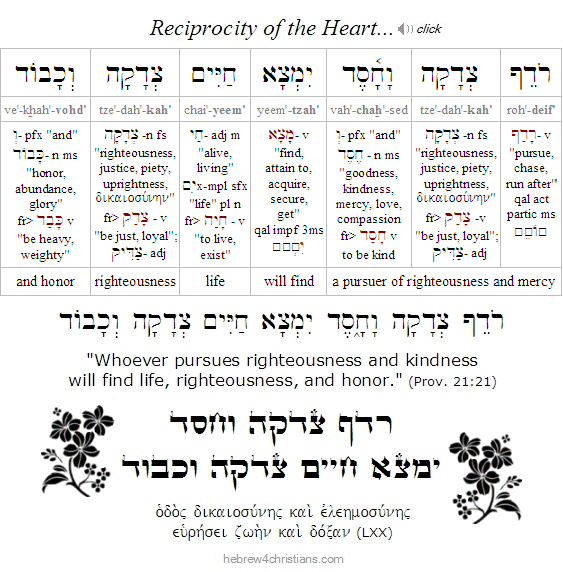 |
"Whoever pursues righteousness and kindness will find life, righteousness, and honor" (Prov. 21:21). Notice that the subject of this verse is a participle that comes from the verb radaf (רָדַף), which means to follow after, or to pursue, as in a chase or a hunt. This same verb is used when King David exclaimed, "surely goodness and love will pursue me (יִרְדְּפוּנִי) all the days of my life" (Psalm 23:6). King David understood that as he pursued God, so God's love would pursue him! In other words, as we seek, so we are sought by God; as we draw near to God, so He will draw near to us (James 4:8).
Notice further the repeated use of the word "righteousness" (i.e., tzedakah: צְדָקָה) in this verse. When we pursue God's righteousness, we will find it, and we will be declared righteous (i.e., tzaddik: צַדִּיק) and given life (i.e., chayim: חַיִּים) and honor (i.e., kavod: כָּבוֹד). "In the path of righteousness is life, and in its pathway there is no death" (Prov. 12:28). Therefore Yeshua calls us to "seek first the kingdom of God and His righteousness, and all these things will be added to you" (Matt 6:33).
The prophet expresses hope: "Let us know; let us press on to know the LORD; his going out is sure as the dawn; he will come to us as the showers, as the spring rains that water the earth" (Hos. 6:3). Salvation is "of the LORD." May God help us pursue him b'khol levavkha - with all our heart - because the He has promised, "You will seek me and find me, when you seek me with all your heart" (Jer. 29:13).
Personal Note: We sincerely wish you "shanah tovah u'metukah ba'Adoneinu Yeshua ha-Mashiach" - a good and sweet year in our Lord Jesus the Messiah! May the LORD God heal you, body and soul; may He ease your pain, increase your strength, and release you from all your fears... May blessing, love, joy, and true shalom surround you and fill you with ongoing wonder and thanks. And above all, may you be inscribed and sealed in the Lamb's book of life (סֵפֶר הַחַיִּים אֲשֶׁר לַשֶּׂה) for good, friends! Shabbat Shalom and Amen.
 |
Gift of Holy Desperation...
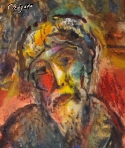
[ Those who know themselves as hopeless are not without hope; those who do not know themselves as hopeless are so indeed... ]
09.23.22 (Elul 27, 5782) Do you have the "gift of holy desperation"? That's the special blessing of needing God so viscerally that you will fall apart or even self-destruct apart from His daily intervention in your life... "Find God or die." You pray because your very life depends on it; you believe because without God, you would be swallowed up in darkness. "Blessed are the poor in spirit," Yeshua said, "for theirs is the kingdom of heaven" (Matt. 5:3). Note that the term translated "the poor" (οἱ πτωχοι) is derived from a word that means "to crouch as a helpless beggar." This word provides an image of someone in abject poverty, totally dependent on others for help. The "poor in spirit" are those who are painfully aware of their exile and need for help from God:
"Give me yourself, O my God, give yourself back to me. Lo, I love you, but if my love is too mean, let me love more passionately. I cannot gauge my love, nor know how far it fails, how much more love I need for my life to set its course straight into your arms, never swerving until hidden in the covert of your face. This alone I know, that without you all to me is misery, woe outside myself and woe within, and all wealth but penury, if it is not my God... O Lord my God, tell me what you are to me. Say to my soul, I am your salvation. Say it so that I can hear it. My heart is listening, Lord; open the ears of my heart and say to my soul, I am your salvation. Let me run toward this voice and seize hold of you. Do not hide your face from me: let me die so that I may see it, for not to see it would be death to me indeed." - Augustine of Hippo
The fire on the altar was to be kept burning at all times (Lev. 6:12-13) symbolizing the "inner fire of the heart." How blessed it is to be full of the fire of this inner need, this relentless groaning, this constant hunger and thirst for God and his righteousness! Even more wonderful is how the korban tamid - the daily whole burnt sacrifice of the lamb - represents Yeshua's ongoing and wholehearted passion for you to come alive to God's love... How blessed we are to receive the bread of life from the hand of our heavenly Father.
Hebrew Lesson
Psalm 51:7 Hebrew reading (click):
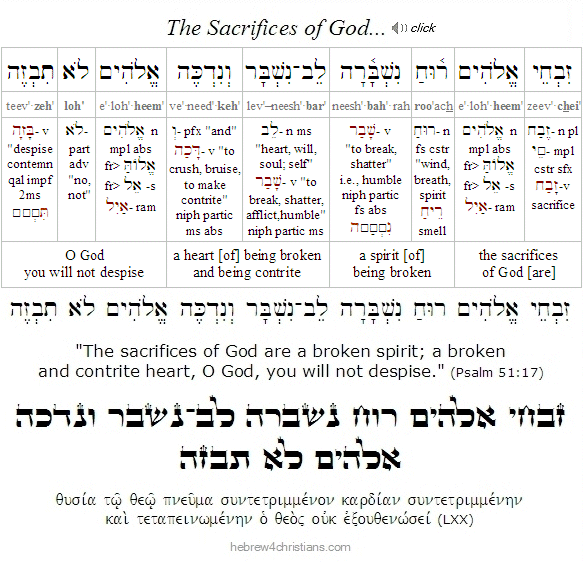 |
Spirituality often enough involves a sense of irremediable brokenness, a feeling that you are not whole, that you are a mess, and that your need for God's healing is constant and relentless... Contrary to the ideals of proud humanism, spirituality is a state of "blessed neediness," of being "afflicted in spirit," a desperate ache for God's power of healing. Those who humbly cry out to the LORD understand their great need for deliverance, "Woe is me, for I am ruined..." (Isa. 6:5). As Yeshua said, "Everyone who exalts himself will be humbled, but the one who humbles himself will be exalted" (Luke 18:14).
Soren Kierkegaard said "to need God is our highest perfection." Ponder how your heart's need impels you to reach out for life, for connection, and for healing:
"In a beautiful sense the human heart will gradually (the grace of God is never taken by force) become more and more discontented -- that is, it will desire more and more ardently, it will long more and more intensely, to be assured of grace. See, now everything has become new, everything has changed.
With respect to the earthly, one needs little, and to the degree one needs less, the more perfect one is. A pagan who knew how to speak only of the earthly has said that the deity is blessed because he needs nothing, and next to him is the wise man, because he needs little.
In a human being's relationship with God, however, the matter is inverted: the more he needs God, the more deeply he comprehends that he is in need of God, and then the more he in his need presses forward to God, the more perfect he is. Therefore, the words "to be contented with the grace of God" will not only comfort a person, and then comfort him again every time earthly want and distress make him, to speak mundanely, needful of comfort, but when he really has become attentive to the words they will call him aside, where he no longer hears the secular mentality's earthly mother tongue, the speech of human beings, the noise of shop keepers, but where the words explain themselves to him, confide to him the secret of perfection: that to need God is nothing to be ashamed of but is perfection itself, and that the saddest thing of all is if a human being goes through life without discovering that he needs God."
Soren Kierkegaard: Upbuilding Discourses
Dangers of False Humility...
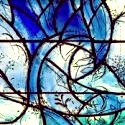
[ "Our relationships live in the space between us which is sacred." - Martin Buber ]
09.23.22 (Elul 27, 5782) Isaac of Thebes was visiting a community when he saw a brother sin. Isaac condemned him in his heart. Later, when he returned to his room for the night, he discovered an angel barring the doorway. "God has sent me to ask you where he is to put the fallen brother whom you have condemned." Isaac was immediately contrite: If God did not judge the sinner, how could he? (Sayings of the Desert Fathers)
If you call yourself a sinner, be sure you understand the implications... If you say, "I know that I am the problem, that my heart is foolish, that I am hotheaded, and that my troubles are my own doing," then examine your anger and disappointment with others in your life... The genuineness of your humility may be revealed by how you handle disappointment, frustration, being disregarded, and so on. If you say that you are "just a poor sinner saved by grace," then test whether you really believe this is true....
There's an old native American story about a young boy who died of a snake bite. The poison took away his life, and his grieving parents carried his body to the holy man and laid it before him. And the three of them sat around the body sadly for a long, long time. The father finally rose from his grieving, went over to his child, stretched out his hands over the feet of the child and said, "In all my life I have not worked for my family as I should have." And the poison left the feet of the child. Then the mother arose and said, "In all my life I have not loved my family as I should." And the poison left the heart of the child. And the holy man stretched out his hands over the head of the dead boy saying, "In all my life I have not believed the words I have spoken." And the poison left the head of the child. The child then rose up, and the parents and the holy man rose up, and the village greatly rejoiced that day.
Hebrew Lesson:
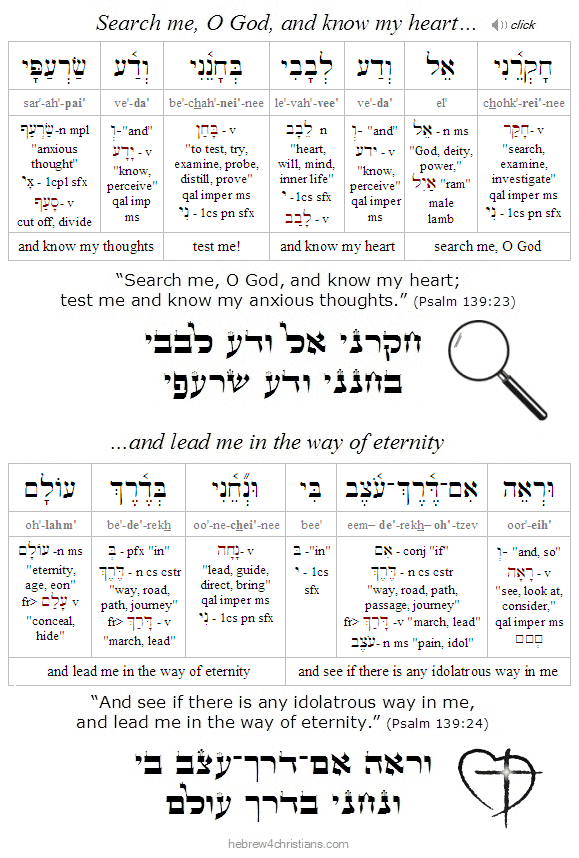 |
The Blessing of Struggle...
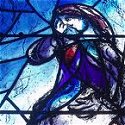
[ The following is related to the month of Elul and the "Season of Repentance"... ]
09.22.22 (Elul 26, 5782) Recently I mentioned that we are part of a seemingly endless journey of falling down and getting back up once again. It is this struggle, this "good fight of faith," that eventually ennobles the heart and establishes character... The hidden blessing of our repeated failure, then, is that we attain genuine humility as we rely on God for the miracle of deliverance. When we draw near to God in confession of our weakness, we may discover that our struggle disguises unacknowledged need within. For example, we might wrestle with sexual lust, but this may come from refusing to trust others or because we are harboring resentment... "Hurt people hurt people," which means that often our sins come from a place of inner pain of abandonment. When we confess the truth we are enabled to draw close to God - the God of Truth - to discover his mercy. Those things you believe make you unlovable are the very means by which God manifests the glory of His compassion and love for you. "It is not judgment that breaks the heart, but mercy and love."
This is why during the month of Elul and the High Holidays we recite prayers for forgiveness (i.e., selichot) in the plural, listing all the sins from "A" to "Z" that we (collectively) have committed. We use plural pronouns out of a sense of compassion... We are one body. When some part of the body is sick, the whole body is sick; when one of us sins, he hurts all the flock (1 Cor. 12:26). Therefore the traditional selichot prayer mentions all the possible sins in the order of the Hebrew alphabet: Ashamnu, "we have sinned," begins with the letter Aleph; Bagadnu, "we have been false," begins with Bet; Gazalnu, "we have robbed," begins with Gimmel, and so on... Just as Yeshua taught us, "Avinu She'bashamayim" - our Father, forgive us of our sins, so "all Israel is responsible one for another." "Compassion" means that others' sins and failures don't make them different from us, but rather more like ourselves. It is "feeling with" the heart for the sake of the other in empathy....
Click for a Hebrew reading lesson:
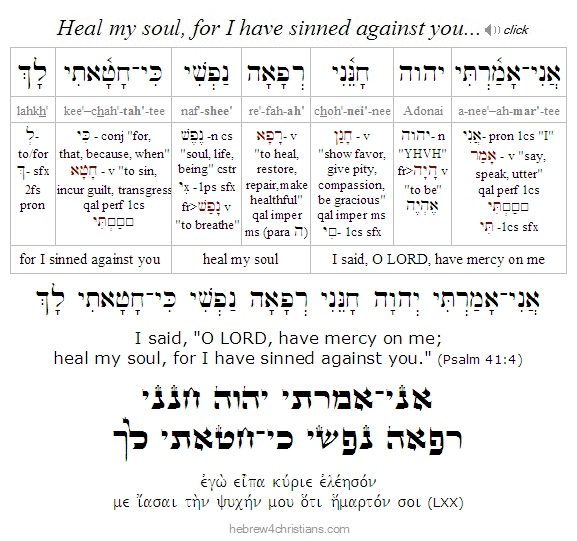 |
The Rabbi of Lelov said to his Hasidim: "A man cannot be redeemed until he recognizes the flaws in his soul and tries to mend them. A nation cannot be redeemed until it recognizes the flaws in its soul and tries to mend them. Whoever permits no recognition of his flaws, be it man or nation, permits no redemption. We can be redeemed to the extent to which we recognize ourselves. When Jacob's sons said to Joseph, "We are upright men," he answered: "That is why I spoke to you saying, 'You are spies.'" But later, when they confessed the truth with their lips and with their hearts, and said to one another, 'We are verily guilty concerning our brother,' the first gleam of their redemption dawned. Overcome by compassion, Joseph turned aside and wept." - Martin Buber (Tales of the Hasidim)
A Matter Very Near to you..
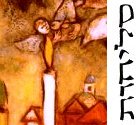
[ Yom Teruah (i.e., "Rosh Hashanah") begins this coming Sunday Sept. 25th at sundown... ]
09.22.22 (Elul 26, 5782) Our Torah reading for this week, parashat Nitzavim (פרשת ניצבים), is always read on the Shabbat immediately before the solemn holiday of Rosh Hashanah, and therefore it is the last portion read before the new Jewish year (see Exod. 23:16). In many synagogues, the opening and concluding paragraphs of parashat Nitzavim are also read during the Yom Kippur morning service.
The portion begins: "You are standing here today, all of you, before the LORD your God (אַתֶּם נִצָּבִים הַיּוֹם כֻּלְּכֶם לִפְנֵי יְהוָה אֱלהֵיכֶם) ... so that you may enter into the sworn covenant of the LORD your God, which the LORD your God is making with you today, that he may establish you today as his people, and that he may be your God, as he promised you, and as he swore to your fathers, to Abraham, to Isaac, and to Jacob" (Deut. 29:10-13). To partake of the covenant, however, required the earnest decision to turn (lashuv) to the LORD. Teshuvah (i.e., turning) is always a matter of the heart and will: "For this commandment (of teshuvah) is not hidden from you, and it is not far away. It is not in heaven...nor across the sea.... Rather, the matter is very near you - in your mouth and your heart - so you can do it" (Deut. 30:11-14; cp. Rom. 10:8-13).
Hebrew Lesson
Deut. 30:14 Hebrew reading (with commentary):
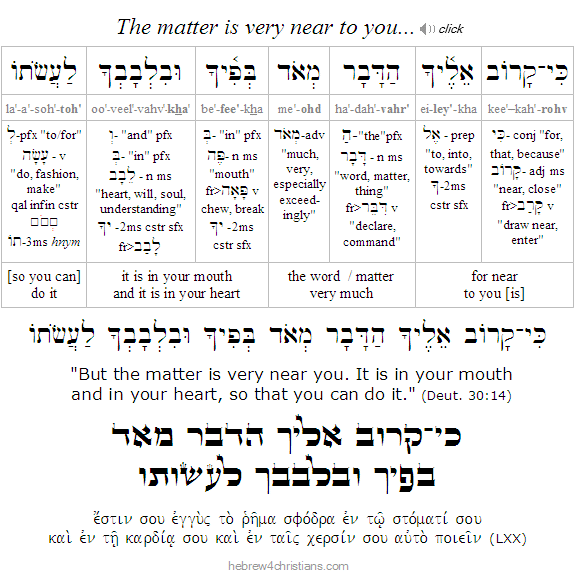 |
Moses then went on to review Israel's history and prophetic future -- i.e., the great prophecy of the Diaspora and the eventual return of the people -- and then solemnly appealed for the people to turn to the LORD for life: "I call heaven and earth to witness against you today, that I have set before you life and death, blessing and curse. Therefore choose life, that you and your offspring may live" (Deut. 30:19).
Hebrew Lesson
Deut. 30:19b Hebrew reading (click):
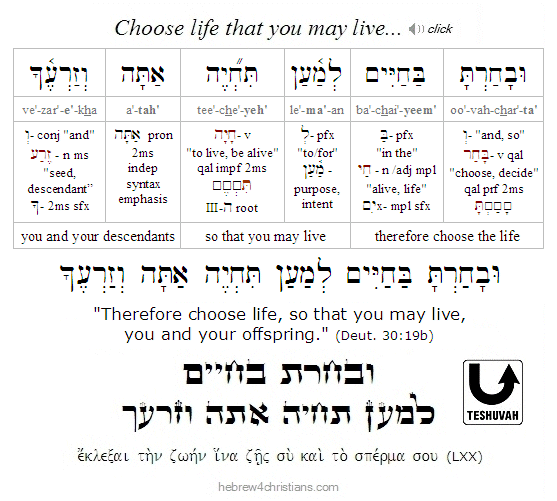 |
But why this seemingly topsy-turvy process of teshuvah? Why do the Jewish people have to go through this long period of suffering, tribulation, and scattering, only to be finally regathered one day in the future? Moses himself gives us the answer (as does the Apostle Paul in the Book of Romans): "The secret things (ha-nistarot) belong to the LORD our God (הַנִּסְתָּרת לַיהוָה אֱלהֵינוּ), but the things that are revealed (ha-niglot) belong to us and to our children forever, that we may do all the words of this law" (Deut. 29:29). Part of the "secret things" concerns the mystery the suffering of the Jewish people, since it is clear that God particularly afflicts those whom he loves through testing, and indeed part of the meaning of being am segulah (a "select people") implies dealing with God - by means of blessing or by curse (Heb. 10:31). In the end, however, God's plan for Israel will decisively demonstrate His wisdom, power, and glory, so much so that that Paul commented on ethnic Israel's future by exclaiming, "Oh, the depth of the riches and wisdom and knowledge of God! How unsearchable are his judgments and how inscrutable his ways" (Rom. 11:33).
We are closer than ever, chaverim.... We must not put our trust in man or in this moribund world system (κοσμος). We are undoubtedly living close to the "end of days." God's judgment has begun in earnest. It is time for us to choose whether we will be shaken or if we will walk in the trust of the LORD God of Israel. Choose this day.
Teshuvah and Desire...

09.22.22 (Elul 26, 5782) What are you seeking today? (John 1:38) The Spirit of the Living God calls out, "Seek Me and live" (Amos 5:4). If you are feeling empty today, ask God to feed you with His life-giving food. Ask Him for energy, power, and strength... Seek the LORD and His goodness. He is faithful and true and will surely answer the sincere cry of the heart: "You will seek me and find me, when you seek me with all your heart" (Jer. 29:13).
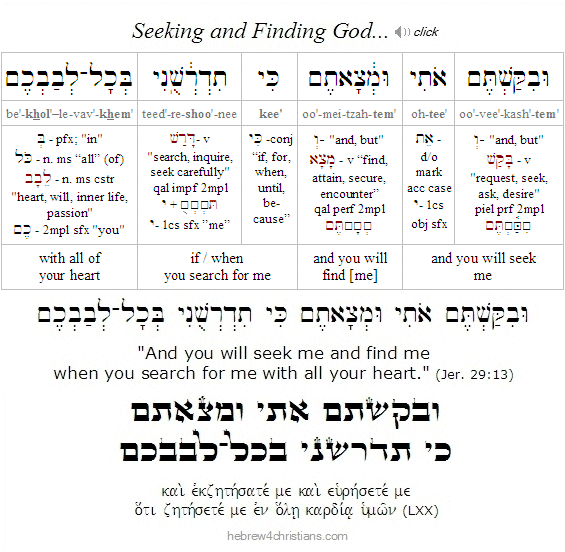 |
Note that this verse includes the implication that we will discover that the LORD is the answer to our heart's cry for love, significance, purpose, etc., when we search for Him bekhol levavkhem - with all our hearts (but not the other way around). In other words, if we do not search for God authentically - with the full passion of our hearts - then we will not find Him, since God only reveals Himself in the truth of reality. Some things in life are only known in the passion of faith... things like love, beauty, honor, and so on. As Pascal once said, "The heart has its reasons that reason knows not of..."
The problem with many of us is not that we are so hungry, but rather that we are not hungry enough... We settle for junk food when God spreads out his banqueting table before us. There is a "deeper hunger" for life, and I pray we are all touched by such hunger pangs; there is a "blessed hunger and thirst" that feeds our heart's cry for God (Matt. 5:6); there is a "divine discontent" that leads to a deeper sense of contentment for the heart...
In the end, if we cannot say we have lived well, then nothing else matters... Seeking God is a process, a "how" of life, not a recipe or formula, no matter how venerated. Seeking God is the goal of life, and in the world to come, I am afraid that most of us will regret that we did not pursue the Eternal with all our hearts while we had the opportunity to do so...
 |
Torah of Life and Death...

[ "The true meaning of love one's neighbor is not that it is a command from God which we are to fulfill, but that through it and in it we meet God." - Martin Buber ]
09.21.22 (Elul 25, 5782) Did you know that, according to 2020 death statistics released by the CDC, the leading cause of death in the United States -- by a wide margin -- is not heart disease, not cancer, not stroke, not Covid-19, nor any other disease, but ABORTION, which demonstrates that the leading cause of death is a spiritual sickness that disregards life...
The National Institute of Health (NIH) reports that nearly 100,000 people in the USA died last year due to drug overdose -- another tragic death toll that is the result of spiritual sickness and despair... And suicide is nothing less than a national epidemic today. According to Save.org, the statistics are gut-wrenchingly sad indeed...
The problem is a spiritual one. The United States -- as with many other nations on the world -- has abandoned spirituality and rejected the idea of moral truth. The idea that people are endowed by their Creator with a conscience to discern right and wrong, and that God has revealed moral truth in the Scriptures so that people have a duty to respect life and to do what is morally righteous before the eyes of heaven, is scoffed at and repudiated by today's so-called "woke" culture. Look, if you really want to "wake up," then realize that everything you say, everything you do, and everything you believe, will be brought before the bar of truth as you stand before the LORD God Almighty to give account for your life... And that great day is coming sooner than any us fully realize...
The Hebrew word for truth (i.e., emet: אֱמֶת) is composed of the first, middle, and last letters of the alphabet, whereas the three letters that spell "falsehood" (i.e., sheker: שׁקר) stand next to one another. Truth creates a firm foundation, secure, strong, and trustworthy, while falsehood is unstable... As it is written, "truth stands forever, falsehood has no legs."
Truth is the foundation of reality, and lying is therefore a form of denial of reality – a dangerous denial - since reality invariably proves self-authenticating (John 3:18). "The lip of truth will stand forever; but a lying tongue is but for a moment" (Prov. 12:19).
The lie is a type of violence. Martin Buber once said, "What is accomplished through lies can assume the mask of truth; what is accomplished through violence can go in the guise of justice, and for a while the hoax may be successful. But soon people realize that lies are lies at bottom, that violence is violence - and that both lies and violence will suffer the destiny history has in store for all that is false."
May God help us never to "trifle" with Him, to play "religious games," and thereby fool ourselves... "God chose you from the beginning for salvation through sanctification by the Spirit and faith in the truth (πίστει ἀληθείας) - 2 Thess. 2:13. It is the truth that sets us free, and for the truth Yeshua gave Himself up for us: "For this purpose I was born and for this purpose I have come into the world -- to bear witness to the truth. Everyone who is of the truth listens to my voice" (John 18:37). May it please the LORD our God to fill us with the Spirit of Truth and to help us be honest with ourselves at all times. Amen.
 |
The Last Sabbath of the Year...

[ Yom Teruah ("Rosh Hashanah") begins this coming Sunday, Sept. 25th at sundown... ]
09.21.22 (Elul 25, 5782) The last month of the Jewish calendar (counting from Tishri) is called Elul (אֱלוּל), which began this year August 26th (at sundown). Traditionally, this final month of the calendar marks the beginning of a forty day "Season of Teshuvah" that culminates on the solemn holiday of Yom Kippur (i.e., Day of Atonement). The month of Elul is therefore a time set aside each year to prepare for the Yamim Nora'im, the "Days of Awe," by getting our spiritual house in order.
The haftarah for parashat Nitzavim (i.e., Isa. 61:10-63:9) is the last of the seven readings from the Hebrew prophets that are consecutively read before Yom Teruah (otherwise called "Rosh Hashanah"). These "haftarot of comfort" foretell of the restoration of the Jewish people and of the coming of the Messianic Era.
In this week's reading -- designated for the very last Sabbath of the current year -- the future salvation of the nation of Israel is described. The LORD promises to shine His glorious light upon the Jewish people and to reveal His glory, despite the hour of darkness and tribulation that comes upon the earth.
"I will greatly rejoice in the LORD; my soul shall be glad in my God. For he has clothed me with the garments of salvation; he has covered me with the robe of righteousness, like a bridegroom who decks himself as a priest with beautiful headdress, and like a bride adorns herself with jewels. For just as the ground produces its crops and a garden yields its produce, so the sovereign LORD will cause deliverance to grow, and give his people reason to praise him in the sight of all the nations. (Isa. 61:10-11)
The great Day of the LORD and time of judgment on the nations draws near, and Zion's deliverance is fully assured. All of the covenant promises of God given to Israel will be fulfilled. God will finish the work of redemption promised to the Jewish people.
Hebrew Lesson:
Waking Up to Reality...
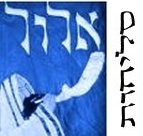
[ The following is related to the month of Elul and the theme of spiritual renewal... ]
09.20.22 (Elul 24, 5782) It is vital to remember that one of the main tactics of the devil is to cast a spell over you to induce a sense of forgetfulness and apathy... The devil wants you to forget that you are a child of the King. The entire venture of teshuvah (repentance) presupposes that you are created b'tzelem Elohim - in the image of God - and therefore you have infinite value and dignity. This is all the more evident in light of the awesome ransom that Yeshua paid to reconcile your soul with God. So what is the greatest sin you can commit in your life? To forget what God has done for you... Remaining asleep, unmindful of your true identity is one of the most tragic things of life. Therefore Rosh Hashanah is sometimes called Yom Ha-Zikaron - the "Day of Remembrance" (Lev. 23:24). The blast of the shofar is meant to jolt us from our sleep... We are to remember who we really are -- to remember that God is our King. The person who says, "Tomorrow I will do teshuvah" really is saying, "Not now." And then tomorrow comes and he says, "Not now." And in this way his entire life passes by, saying, "Not now." Finally one day he wakes up only to find himself already dead. May God help us wake up to the Reality that is set before us.
During this season (and always) we make a conscious effort to turn back to reality: first, we turn back to God and to ourselves (i.e., self-examination and confession); second, we turn to others we have harmed (i.e., asking for forgiveness), and third, we turn to others in need (i.e., giving tzedakah). I realize that we are to do teshuvah every day, of course (Psalm 16:8); though the "Season of Teshuvah" provides us with an opportunity to again remember the importance of these matters. As Yisrael Salanter wisely said: "Consider every day as if were an Elul day, and Elul itself is of course Elul."
The appointed hour draws near; the "footsteps of the Messiah" are approaching. Let us then heed the admonition of our Savior: "when you see these things taking place, you know that the time is near, right at the door" (Mark 13:29), and let us encourage one another to wake up and come alive: "Awake, O sleeper, and arise from the dead, and Messiah will shine on you!" (Eph. 5:14). The message of teshuvah (repentance, "turning back to God") is always, "Wake up - you are living a nightmare." There is only one remedy, and that is discovered by coming to the Divine Light by opening your heart to the love and very real presence of God.
Hebrew Lesson
2 Sam. 22:32 Hebrew reading (click):
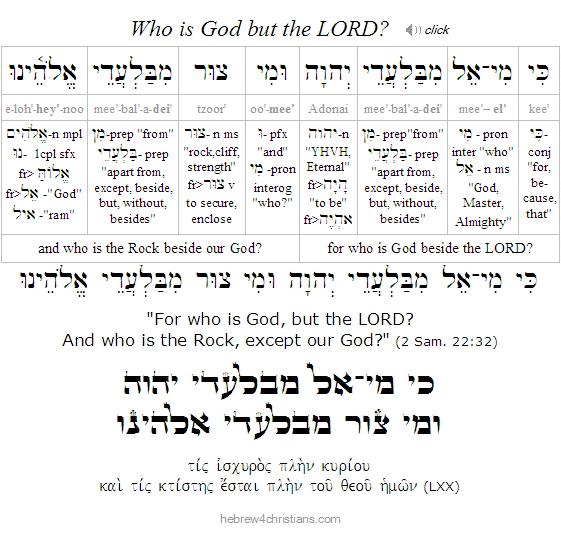 |
Note: It's important to keep in mind that we don't "get there" by trying to change ourselves, but rather by surrendering to God's salvation, that is, by accepting his love and trusting in his power to make crooked things straight within our hearts. Salvation is God's work of deliverance given on our behalf, our responsibility -- our teshuvah -- is to turn to God by faith and trust Him to do the miracle within us so that we bring glory to His Name. Amen.
This is the Day...

09.20.22 (Elul 24, 5782) God's Name is "I-AM-with-you-always," imanu-El (עִמָּנוּ אֵל) - always in the midst of you, your heart, your Center (Matt. 28:20; Isa. 41:10, Psalm 23:4, etc).... The LORD is so named because he is never without his own, and we are who we are in relation to his presence in our lives. Yeshua is not simply the Lord of the past or the Lord of the future, but the Lord of this moment, this "here" and this "now." He is the same yesterday, today, and forever - the breath of life, our sustaining hope, the Shepherd of our souls... Whatever else may come of this day, this is the day that the LORD has made, and we find peace in God's Presence... Let us look to Him in this hour!
Hebrew Lesson
Psalm 118:24 Hebrew reading (click):
Turning back to God...

09.19.22 (Elul 23, 5782) The theme of the High Holidays is teshuvah (תְּשׁוּבָה), a word often translated as "repentance," though it is more accurately understood as turning back (i.e., shuv) to God. In spiritual terms, teshuvah may be regarded as a practical turning away from evil and a turning toward the good, though it is simpler to regard turning to God as the means by which we turn away from evil. Indeed the Greek word translated repentance (i.e., μετάνοια) means going beyond our habitual thinking, changing our mind, and learning to see from a radically new perspective. As we turn to God, we see that "everything is new."
Teshuvah, or "repentance," believes that the kindness of God can give life to our dead hearts, and therefore it is first of all a matter of faith, trusting God to perform the miracle for us. However, even though it is a great gift from heaven, repentance requires honesty and acknowledgment of the truth. We must confess our inner poverty, our neediness, and mourn over the loss and harm caused by our sin (Matt. 5:2-8). Repentance turns away from our attempts to defend or justify ourselves and instead turns to God to heal our separation from Him (Rom. 8:3-4). Teshuvah buries our old nature by being made into a new creation.
It is no small thing to believe the message of Yeshua, and indeed, it involves a passionate inwardness that "scandalizes" the rational mind. Our father Abraham is extolled as the model of righteous faith, but he was tested to sacrifice the moral law (e.g., "thou shalt not murder") when he lifted up the knife to slay his beloved son Isaac. Faith requires you to change your everyday thinking, to go beyond natural expectations, to "walk on water." In the case of Yeshua, we are confronted with the "Absolute Paradox," namely, the God-Man, the Infinite-made-Finite, the Holy-made-Profane, the Sinless-made-Sin, who says to you: "I AM the resurrection and the life. Whoever believes in me, though he die, yet shall he live, and everyone who lives and believes in me shall never die. Do you believe this?" (John 11:25-26). You will never die; you will never hunger; you are made whole through my brokenness; you will be cleansed by my defilement, and so on. It's not just hard to believe, it's impossible, which is why it is a miracle of God to be saved (Matt. 19:26). "It is the Spirit that gives life; the flesh is no help at all" (John 6:63). The difference is Yeshua: "Salvation is of the LORD." We are enabled to love and know God by means of his inner life and spirit, not by means of good intentions or religious zeal. Faith itself is a miracle, the power of God.
Hebrew Lesson
Isa. 55:6 Hebrew reading (click):
"Let everyone cry out to God and lift his heart up to him, as if he were hanging by a hair, and a tempest were raging to the very heart of heaven, and he were at a loss for what to do, and there were hardly time to cry out. It is a time when no counsel, indeed, can help a man and he has no refuge save to remain in his loneliness and lift his eyes and his heart up to God, and cry out to him. And this should be done at all times, for in the world a man is in great danger" (Martin Buber: The Ten Rungs)
Torah and Rosh Hashanah...
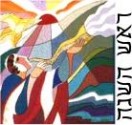
[ The holiday of Rosh Hashanah begins this coming Sunday, Sept. 25th at sundown... ]
09.19.22 (Elul 23, 5782) Though the term "Rosh Hashanah" (ראש השנה) does not explicitly occur in the Torah, the beginning of the 7th month (i.e., Tishri 1) is clearly to be set apart as "Yom Teruah" (יום תרועה), a day of shofar blowing (see Lev. 23:24-25, Num. 29:1-2). When we consult Jewish tradition for some additional insight about what this means, we discover that the sages and great commentators of the Torah universally regarded the number seven as the number of completeness. Just as the seventh day of the week was considered sacred, so too is the seventh month of the year. Therefore the sages reasoned that since each new moon (rosh chodesh) is regarded as a sacred time (see Num. 10:10), it's logical that the seventh new moon (counting from Nisan in the spring) should acquire special sanctity. This conclusion seems especially justified in this case because God directly commanded Israel to sanctify the seventh month as a solemn day of "remembrance and shofar blowing" (זִכְרוֹן תְּרוּעָה). Therefore while it is clear that the new moon of the seventh month is to be observed as "Yom Teruah," it nevertheless has a somewhat "concealed" significance, suggestive of the absence of the moon on that date itself...
 |
Note, however, that the Torah calls the end of the harvest year (in the fall) the "end of the year" (i.e., חַג הָאָסִף בְּצֵאת הַשָּׁנָה, see Exod. 23:16), which implies both the start of a new year and the symmetry of the calendar: the fall festivals "mirror" the spring festivals and correspond to one another. Just as there is a "new year" in the spring, on the new moon of Nisan, so there is in the fall, on the new moon of Tishri, the seventh month... The Psalmist likewise regarded the new moon of the seventh month as especially significant (Psalm 81:3-4). And after the return of the exiles, Ezra the Scribe gathered the people at the Water Gate in Jerusalem on the first of Tishri to read the Torah before the people (see Neh. 8:1-9). Ezra's action may have been the precedent among the later sages for investing Tishri 1 with its distinctive status. That is why we make a "teruah" shout of thanks to God in anticipation of the fulfillment of God's promises and redemptive purposes during the End of Days.
The question about Rosh Hashanah has to do with the authority of Jewish tradition itself. Does the Jewish community have sanction to establish the date of Hebrew calendar? To establish the start of the month? To determine if a year was shemittah (a sabbatical year)? To sound the shofar and declare a Jubilee? According to Moses, the answer is a qualified "yes." After all, it's clear that Moses established judges and courts to determine such matters and to develop case law based on the precepts of the Torah (e.g., see Deut. 16:18). This "chain of authority" was later codified by the sages of the Mishnah, who said it was given by God first to Moses, then Joshua, then to the 70 elders, then to the prophets, and then to Ezra and the men of the Great Assembly (Pirke Avot 1:1). And according to "mainstream" Jewish tradition, Tishri 1 has been established as a "rosh hashanah" from at least the time of the return of the exiles (4th century BC). This is further attested by Flavius Josephus (first century AD) who wrote: "Moses ... appointed Nisan ... as the first month for the festivals ... the commencement of the year for everything relating to divine worship, but for selling and buying and other civil affairs he preserved the ancient order [i. e. the year beginning with Tishri]" (Antiquities 1.81). Even Yeshua Himself endorsed Ezra's division of the Scriptures into the "Law, Writings, and the Prophets" and said that not a "jot or a tittle" (kotzo shel Yod) would pass from the Torah until all was fulfilled (Luke 24:44; Matt. 5:18).
That said, there are undoubtedly a lot of Rabbinical "additions" that have accrued to the holiday over the centuries, especially since the destruction of the Second Temple. Despite this, hovever, let me suggest that many of the traditions of Rosh Hashanah can be genuinely helpful for us. For instance, undergoing self-examination and doing teshuvah are commanded by God and inherently valuable exercises for followers of Yeshua (see Lam. 3:40; Haggai 1:5; Psalm 119:59; Matt. 7:3-5, Gal. 6:3-4, 1 Cor. 11:28, 2 Cor. 13:5, James 5:16, 1 John 1:8-9, etc.). Setting aside 40 days each year to help us turn away from sin is a healing custom, especially if it's done in light of truth of the gospel message. After all, Christians will stand before the Throne of Judgment (kisei ha-din) to give account for their lives to God (see 2 Cor. 5:10). As it is written: "Every man's work shall be made manifest: for the day shall declare it, because it shall be revealed by fire; and the fire shall try every man's work of what sort it is" (1 Cor. 3:13). The foundation of every true work of God comes from trusting in the finished work of Yeshua the Messiah, and the work of our faith will be tested and judged. We have great consolation in our testings, friends: if we are honest with the Lord and appeal to Him for help, He promises to be there for us (Heb. 4:15-16).
For more on this subject, see Is Rosh Hashanah Biblical?
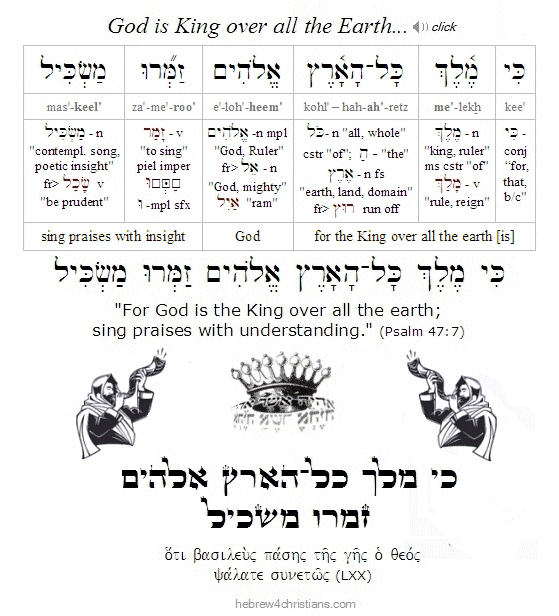 |
Spelling out "Teshuvah"

09.19.22 (Elul 23, 5782) Taken as a whole, the central message and ultimate point of the Scriptures is to turn to God for life... Rabbi Sussya once said: "There are five verses in the bible that constitute the essence of the Torah. These verses begin in Hebrew with one of these letters: Tav (תּ), Shin (שׁ), Vav (ו), Bet (בּ), and Hey (ה), which form the word for repentance, namely,"teshuvah" (תְּשׁובָה). The five verses are: 1) Tamim tiheyeh (תָּמִים תִּהְיֶה): "Be wholehearted before God" (Deut. 18:13); 2) Shiviti Adonai (שִׁוִּיתִי יְהוָה): "I have set the LORD always before me" (Psalm 16:8); 3) Va'ahavta lere'akha (וְאָהַבְתָּ לְרֵעֲךָ): "Love your neighbor as yourself" (Lev. 19:18); 4) Bekhol derakekha (בְּכָל־דְּרָכֶיךָ): "In all your ways know Him" (Prov. 3:6); and 5) Higgid lekha (הִגִּיד לְךָ): "Walk humbly with your God" (Micah 6:8). In other words, the way of teshuvah, of answering God's call for you to return to Him, is to sincerely set the LORD before you, to love others, and to walk out your days in heartfelt gratitude.
Hebrew Lesson
Micah 6:8 Hebrew reading (click):
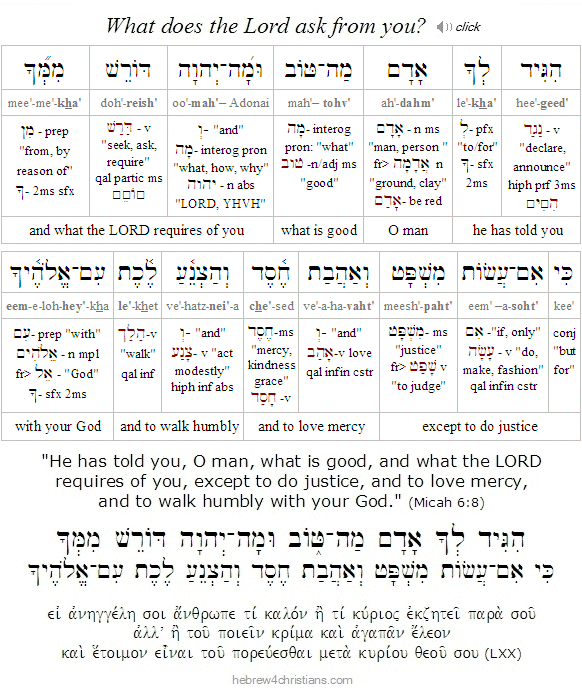 |
In other words, "teshuvah" (repentance) is an acronym that stands for being whole, seeing God, loving others, knowing God in all your journey, and walking in humility...
Nitzavim and Rosh Hashanah...

[ Yom Teruah (or "Rosh Hashanah") begins this coming Sunday, Sept. 25th at sundown... ]
09.18.22 (Elul 22, 5782) Our Torah for this week, parashat Nitzavim (פרשת ניצבים), is always read on the Sabbath before Rosh Hashanah, serving as a prelude to the holiday. The sages found an allusion to Rosh Hashanah in the opening verse: "You are standing today all of you before the LORD your God" (Deut. 29:10), where "today" refers to Rosh Hashanah, when "all of you" shall stand before the LORD your God in judgment. The "last" shofar blast refers to Rosh Hashanah when the dead shall be raised (Rosh Hashanah 16b), whereas the "great" shofar blast is sounded at the end of Yom Kippur, after Israel has received the atonement.
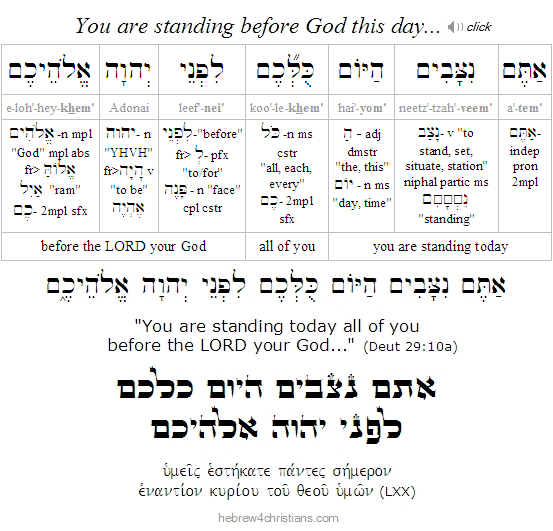 |
Rosh Hashanah has long been associated with the Day of Judgment (יום הדין) in Jewish tradition. According to many of the sages, the time immediately preceding the appearance of the Messiah will be a time of testing (nisayon) in which the world will undergo various forms of tribulation called chevlei Mashiach (חֶבְלֵי הַמָּשִׁיחַ) - the "birth pangs of the Messiah" (Sanhedrin 98a; Ketubot, Bereshit Rabbah 42:4, Matt. 24:8). Some say the birth pangs are to last for 70 years, with the last 7 years being the most intense period of tribulation -- called the "Time of Jacob's Trouble" / עֵת־צָרָה הִיא לְיַעֲקב (Jer. 30:7). The climax of the Great Tribulation is called the great "Day of the LORD" (יוֹם־יהוה הַגָּדוֹל) which represents God's wrath poured out upon a rebellious world system. On this fateful day, the LORD will terribly shake the entire earth (Isa. 2:19) and worldwide catastrophes will occur. "For the great day of their wrath has come, and who can stand?" (Rev. 6:17). The prophet Malachi likewise says: "Surely the day is coming; it will burn like a furnace. All the arrogant and every evildoer will be stubble, and that day that is coming will set them on fire,' says the LORD Almighty. 'Not a root or a branch will be left to them'" (Mal. 4:1). Only after the nations of the world have been judged will the kingdom of God (מַלְכוּת הָאֱלהִים) be established upon the earth. The remnant of Israel will be saved and the 1,000 year reign of King Messiah will then commence (Rev. 20:4). For more information, see "As the Day Draws Near."
Shavuah Tov Podcast:
Parashat Nitzavim..
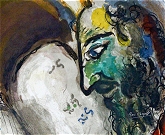
Firstfruits and Blessing...
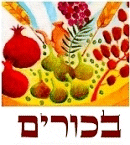
09.16.22 (Elul 20, 5782) From our Torah portion this week (Ki Tavo) we read: "You shall take some of the first of all the fruit of the ground, which you harvest from your land that the LORD your God is giving you, and you shall put it in a basket, and you shall go to the place that the LORD your God will choose, to make his name to dwell there" (Deut. 26:2). This is called the mitzvah of "bikkurim" (בִּכּוּרִים), or "firstfruits," a thank offering (זֶבַח הַתּוֹדָה) that was given to the priests in recognition of God's faithful love. In a special Shavuot ceremony, a basket filled with the first samples of the spring harvest was presented before the altar at the Temple as the worshiper recited a passage from Torah (Deut. 26:5-12) that retold the basic story of Exodus from Egypt and how the LORD had faithfully brought the people into the Promised Land, "a land flowing with milk and honey" (i.e., eretz zavat chalav u'devash). The point of the yearly bikkurim ritual was to instill a sense of gratitude, or "hakarat tovah" (הַכָּרַת טוֹבָה), a phrase that means "recognizing or being conscious of the good" (indeed, the word "Jew" (יְהוּדִי) comes from wordplay on the verb yadah (יָדָה), meaning to acknowledge and give thanks). Therefore, the firstfruits offering teaches us to use the "good eye" to appreciate God's kindness and love. Doing so will yield a harvest of blessing in our lives, as it says: "Honor the LORD with your substance and with the firstfruits of all your produce; then your barns will be filled with plenty, and your vats will be bursting with wine" (Prov. 3:9-10). "Bless the LORD, O my soul, and all that is within me, bless his holy name; Bless the LORD, O my soul, and forget not all his benefits" (Psalm 103:1-2).
בָּרֲכִי נַפְשִׁי אֶת־יְהוָה
וְכָל־קְרָבַי אֶת־שֵׁם קָדְשׁוֹ
bah·ra·khee · naf·shee · et-Adonai
ve·khol-ke·rah·vai · et-shem · kohd·shoh

"Bless the LORD, O my soul,
and all that is within me, bless his holy name"
(Psalm 103:1)

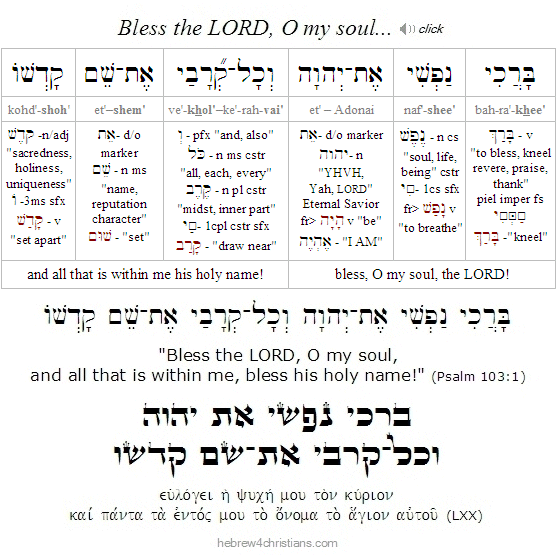
The bikkurim ritual testifies that God has redeemed us so that we will produce fruit in our lives to His glory (John 15:7-8). Shabbat shalom and love to you, chaverim...
Identified with Him...

09.16.22 (Elul 20, 5782) Our faith affirms that Yeshua's death was "for you," that he died "in your place," that when he died, you died with him, and furthermore that when he rose from the dead, you also rose with him.... "For you have died, and your life is hidden with Christ in God" (Col. 3:3). In other words, He has identified you with who he is. But how are we to understand all this? What is the nature of this "life-for-life" (and death-for-death) exchange? How are we "identified" with Yeshua and His death and resurrection?
Recall that the climax of the giving of the Torah was the revelation of the mercy seat at the Tabernacle. It was on Sinai that Moses received the "pattern" of the heavenly altar of God. The purpose of the sacrifices was to draw us near (karov) to God, and the blood of sacrifice was the purifying agent that enabled the worshipper access to the Divine Presence. The sacrificial system enshrined the korban principle of "life-for-life" identity: God accepted the sacrificial substitute in place of the offender.
 |
To overcome the alienation caused by sin and guilt, the worshipper would bring a defect-free animal (korban) to the entrance of the Mishkan and place both his hands on the animal's head, leaning on it to identify it with himself (Lev. 4:29). This act of "semikhah" (סְמִיכָה) did two things: First it spiritually transferred the person's sin to the sacrificial animal, and secondly it transferred the innocence of the animal back to the person. It was an "exchange" or "substitute," one life for another. Then, the offerer himself would slay the animal and confess that his sin caused the innocent victim to be slain in his place (Menachot 110a). In this way atonement with God was made possible...
We are told that we must "receive" Yeshua into our hearts, and that is certainly true, but we must also receive his death as well... This is the meaning of "taking up your cross." It is the death of Yeshua in your place that releases you from the curse of the law (which is death). By faith we "lay hands" on Yeshua and "lean into" his death, confessing our guilt and sin and identifying Yeshua's sacrifice as offered up for our sake... We accept that our sins are msyteriously transferred to Yeshua in his death, just as we accept that his righteousness is "imputed" or transferred back to us. This is the ground of our "justification," -- "just-if-i'd" never sinned, and "just-if-i'd" always obeyed... As it is written, "God made the One who did not know sin to be sin for us, so that we would become the righteousness of God (δικαιοσύνη θεοῦ) in Him" (2 Cor. 5:21). It is the righteousness of God, not our own. We receive the "death benefits" of Yeshua, who has bequeathed to us the great inheritance of everlasting salvation and heaven itself... Our identification with Yeshua's death makes us free from the law, not in the sense that we are free to continue to sin, but rather free to live in the victory of Yeshua's resurrection life power. "I have been crucified with the Messiah: It is no longer I who live, but Messiah who lives in me. And the life I now live in the flesh I live by faith in the Son of God, who loved me and gave himself for me. I do not nullify the grace of God, for if righteousness were through the law, then Messiah died for no purpose" (Gal. 2:20-21).
 |
 |
As Oswald Chambers once wrote, "Get alone with Jesus and either tell Him that you do not want sin to die out in you - or else tell Him that at all costs you want to be identified with His death." Amen, that sums up our side of the salvation issue nicely...
No longer "Under the Law"
The Apostle Paul used the analogy of the laws of marriage to help us understand our relationship with the law (Rom. 7:1-4). A married woman is bound to her husband as long as he is still living, and during that time she is not free to form another attachment. If her husband dies, however, she is released from the terms of the ketubah (marriage contract) and may lawfully marry another. In this example, Paul states:
1. A woman is married to a man;
2. the man dies, and (therefore)
3. the woman is then free to marry another.
When Paul then explained how this case applies to our relationship with the law, however, he seems to have switched the terms of the analogy. He says:
1. You were under the law;
2. you died, and (therefore)
3. you are then free to marry another.
But just who died - you or the law? The analogy would seem to identify the believer with the woman and the law with her husband, but that would imply that the law died, something which Paul would never suggest (the law of God is not the cause of sin but rather the "messenger" of sin's presence; you cannot blame an x-ray machine for the detection of a tumor, after all). The main point, however, is that the death of one of the two parties in a contract absolves the terms of that contract and ends the obligation. You "died to the law" through the death of Yeshua for the sake of being in a new covenant with God - "so that we would belong to another, to him who has been raised from the dead, in order that we may bear fruit for God" (Rom. 7:4). Note further, however, that we are delivered from the curse of the law, but not the law itself! The Torah is holy, just, and good; it is written on our hearts through the agency of the Holy Spirit, in accordance with the promise of the New Covenant of God (see Jer. 31:33). The believer cries out, "O how I love thy law!" (Psalm 119:97).
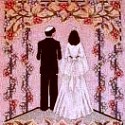 |
This is the "bikkurim" connection with this week's Torah portion. The whole point of the great Passover and the Exodus from Egypt was to bring us into our inheritance and make us fruitful before the LORD. The fruit of the Spirit (פְּרִי הָרוּחַ) is the result of a new union or relationship with God, a "new covenant" given "apart from the law" (Rom. 3:21). We now serve the LORD in a new way - by the power of the Holy Spirit, not by following legal ordinances or other rules (2 Cor. 3:6). "If you are led by the Spirit, you are not under the law" (Gal. 5:18), that is, you are no longer in a "legal" relationship with God based on the terms of the Sinai covenant and its curses.... As Paul further wrote: "Sin will have no dominion over you, since you are not under law but under grace" (Rom. 6:14). The grace and love of God is what enables us to fulfill the inner intent of the law by means of the invincible power of Yeshua's resurrection life.
Hebrew Lesson
Psalm 119:71 Hebrew reading (click):
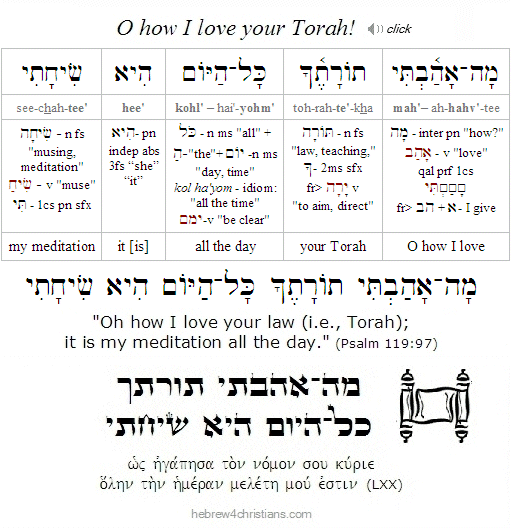 |
The Torah of Mercy...
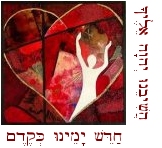
09.16.22 (Elul 20, 5782) It has been said that grace is getting what you don't deserve, whereas mercy is not getting what you do... Yeshua said, "Blessed are the merciful, for they shall receive mercy" (Matt. 5:7). This is not a reciprocal law like karma, i.e., you get in return what you first give, since we cannot obtain God's mercy as reward for our own supposed merit (Rom. 4:4). No, we are able to extend mercy to others only when we are made merciful ("full of mercy"), that is, when we first receive mercy as the gift of God (Eph. 2:8; Rom. 5:15). After all, you can't give away what you don't have, and if we have no mercy for others, it is likely that we have not received it ourselves, as the parable of the Good Samaritan reveals (Luke 10:25-8). Your forgiveness is your forgiveness, that is, as you forgive, so you reveal your heart. What you do comes from what you are, not the other way around. We are first transformed by God's grace and then come works of love. We are able to judge others mercifully, with the "good eye," because we come to believe that we are beloved by God.
When Yeshua rebuked the "holier-than-thou" attitude of some people, he said: "Go and learn what this means, 'I desire mercy, and not sacrifice.' For I came not to call the righteous, but sinners" (Matt. 9:13). The pattern therefore abides: First you realize you are broken, impoverished of heart, and you mourn over your sinful condition (Matt. 5:3-4); then you hunger and thirst for God's righteousness, that is, for his healing and deliverance, and finally you learn to trust the mercy of God, that is, you come to accept that you are accepted despite your unacceptability (Matt. 5:5-6). As you begin "suffer yourself" and forgive your own evil, you are enabled to extend this mercy to others (Matt. 5:7). In this way you begin to see God in your relationships and obey the heart of truth (Matt. 5:8; 1 Sam. 15:22).
Though we love and honor truth, we must be careful never to use it as a weapon to judge or wound others. The failure to extend mercy, to demand your "rights" or hold on to grudges, implies that you are relating to God as Judge rather than as Savior (James 2:13). If we condemn what we see in others, we have yet to truly see what is within our own hearts; we have yet to see our desperate need for God's mercy for our lives. If you don't own your own sin, your sin will own you. Being merciful is a response to God's love and therefore is essential to genuine teshuvah (repentance). Walking in love is the deepest expression of truth, since love heals untruth and embraces hope for what is presently broken (1 Cor. 13:7). In light of this, take a moment to ask the LORD to help you relinquish the pain of your past by being full of mercy toward yourself and others. Honor God's love for you by forgiving yourself and showing compassion and mercy to others in your life...
Hebrew Lesson
Hosea 6:6 Hebrew reading (click):
Through a Glass Darky...
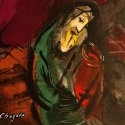
[ Please don't despise me when I confess that I sometimes wrestle with depression, inconsolable grief, and loneliness. It's very old pain, from the earliest dawn of life, fracturing my heart and driving me into exile. Nevertheless I still believe, for my melancholy cries out for God's heart. ]
09.16.22 (Elul 20, 5782) In this present world it's a struggle not to be afraid... We see through a glass darkly; our heart's desire is often thwarted; we encounter uncertainty; our prayers may seem to go unanswered. There are tribulations, sorrows, and pains; we are grieved and often feel lonely; we sometimes struggle to hold fast to our confession and hope; we feel alarmed over the insanity and depravity that pervades the culture around us; we feel powerless to stop the juggernaut of unrestrained evil, yea, we lament most of all over the battle within our own hearts -- our own inner fears, outrage, and wretchedness. We may wonder why God does not directly intervene to help in the midst of our plight; we may pray anguished prayers beseeching heaven's intervention to deliver us from evil. Many of our brothers and sisters around the world are undergoing persecution, being murdered for the sake of their faith; others languish in prison or "reeducation" camps, being labeled as "enemies of the State," brutalized, ostracized, marginalized, rejected, and forsaken of the common welfare of others. We shed tears over the burning of churches; we are repulsed by acts of violence against God's people; we protest that Christians are regarded as political enemies for honestly questioning the logic and veracity of governmental mandates or protesting their duplicity. We are often misunderstood, or worse, vilified for honoring the truth. We are made outsiders, segregated outside the camp, maligned as lepers and deplorables... Indeed, the world system hates us, and for the sake of our faith "we are being killed all the day long; we are regarded as sheep to be slaughtered" (Psalm 44:22; Rom. 8:36).
We may sometimes wonder where God is in the midst of our alienation and tribulation. As followers of Yeshua we are called to walk in the truth, to do justice, and to walk humbly with our God. More: we are to die to ourselves, to love our enemies, and to be faithful to God even in martyrdom. In these darkened days, however, this means walking through the darkness of the valley of the shadow of death, for it is apparent that worldly culture has decisively rejected the truth of God and regards those who esteem it as its enemies. "The kings of the earth set themselves, and the rulers take counsel against the Lord, and against his Messiah, saying 'Let us break their bonds apart and cast away their cords from us'" (Psalm 2:3-4). Prophetically, we know what is on the horizon; we foresee the terrors of the "End of Days."
The test of faith in our circumstances, as has always been for God's people, is to remain steadfast in our conviction of God's love despite the darkness that surrounds us (Isa. 50:10). The test is summed up by C.S. Lewis this way: "We're not doubting that God will do the best for us; we're wondering how painful the best will turn out to be" (Collected Letters). We can't stay in the limbo of such questioning forever, however; we must repudiate our misgivings and find settled determination to press on in faith: Our Lord has a crown and a kingdom prepared for us, and he will give us what we need in the way to attain unto it.
There is a difference between knowing God in your head and knowing God in your heart... Unlike a merely intellectual idea of faith that merely assents to certain theological idea or creeds, trusting in the Lord (i.e., bittachon: בִּטָחוֹן) is an emotional commitment to God's presence in the midst of the sorrows of our lives; it is the struggle of hope that affirms we are not finally alone, abandoned, and helpless... Trust goes beyond the "head knowledge" to engage God personally, existentially, from within the whirlwind of harrowing pain and pain's fearful loneliness. Authentic theology is "dialogical" -- a conversation of the heart with God - seeking, yearning, protesting, lamenting, and struggling with life's inscrutabilities and unfathomable questions as it appeals to God for the assurance and comfort of the Holy Spirit. Trust finds courage to voice to our sorrow and fears, inviting God into the midst of our brokenness, often yielding to tearful silence in unknowing expectation. As Dorothy Soelle wrote: "Prayer is an all-encompassing act by which people transcend the mute God of an apathetically endured reality and go over to the speaking God of a reality experience with feeling in pain and happiness" (Soelle: Suffering). This is perhaps the deepest meaning of the Shema - to listen for God's heart in the midst of your struggle; learning to encounter God's love in the place of your brokenness and need (Job 13:15). Amen.
Hebrew Lesson:
Psalm 23:4a Hebrew reading (click):
 |
Reflecting on the role of suffering in the heart of faith, Dietrich Bonhoeffer (1906-1945) - who was executed by the Nazis - once wrote: "Here is the decisive difference between Christianity and all religions. Man's religiosity makes him look in his distress to the power of God in the world: God is the deus ex machina [i.e., "quick fix"]. The Bible [on the other hand] directs man to God's powerlessness and suffering: only a suffering God can help" (Letters and Papers from Prison). Bonhoeffer's comment alludes to the difference between an "Elohim" (אֱלהִים) conception of God as the omnipotent power and Judge of reality, and the "YHVH" (יהוה) conception of God as the compassion Source and Breath of life - the Suffering God who empties himself to partake of our condition - to know our pain, to bear our sorrows, to heal us from the sickness of spiritual death, and to touch us in the loneliness of our exile... The Spirit enables us to "groan" in compassion, directing us away from the impulse to "kill the pain" to accept it as part of our lament and need for connection with God.
 |
The Torah of your Life...

09.15.22 (Elul 19, 5782) The underlying assumption at work behind the call to do teshuvah is that your life matters and your actions carry profound significance - both in this world and in the world to come. Sin is so dangerous because it damages our very essence, and if unremedied, such damage will be irreversible. Therefore today is the day to seek healing, for your days are numbered in this world and every day you live ratifies the end of your life. The sages say "mitzvah goreret mitzvah" (מצווה גוֹרֶרֶת מְצוּוֶה) - "the reward for a mitzvah (i.e., blessing) is another mitzvah" (Avot 4:2), though of course the logical corollary is also true, "the reward for a sin is another sin."
"It is a serious thing to live in a society of possible gods and goddesses, to remember that the dullest most uninteresting person you can talk to may one day be a creature which, if you saw it now, you would be strongly tempted to worship, or else a horror and a corruption such as you now meet, if at all, only in a nightmare. All day long we are, in some degree [going] to one or the other of these destinations. It is in the light of these overwhelming possibilities, it is with the awe and the circumspection proper to them, that we should conduct all of our dealings..." (C.S. Lewis: Weight of Glory)
In the Talmud (Makkot 2:6) we read, "They asked of Wisdom: 'What is the sinner's punishment?' It replied, "Evil pursues the sinners" (Prov. 13:21). They asked Prophecy: 'What is the sinner's punishment?' It replied, "The soul that sins shall die" (Ezek. 18:4). Then they asked the Holy One, blessed be He, 'What is the sinner's punishment?' He replied, "He should turn to me and be forgiven. This is the meaning of the verse, "Therefore he guides sinners in the way" (Psalm 25:8) - God guides sinners to do teshuvah in order for them to find life.
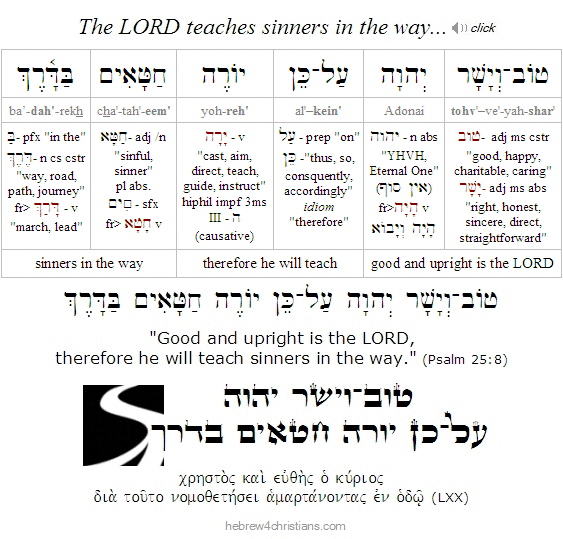 |
What is God like - what is His heart - is the first question, and how we answer that will determine how we deal with all the other questions that come up in theology... What do you feel inside when you stare up at the ceiling before you go to bed? In light of the ambiguity and heartaches of life we might wonder if God is there for us. Does God care? Is He angry at me? Does He really love me? This is the raw place of faith, where we live in the midst of our questions. The Name YHVH (יהוה) means "He is present," even when we are unconscious of His Presence in the hour of our greatest need.
The Courage to Believe...

09.15.22 (Elul 19, 5782) In order to trust God, you must believe that you are valuable to Him and that He genuinely desires a relationship with you. You must accept that God has redeemed you to elevate your soul so that you could know and love Him. The spies could not transcend their slave mentality and therefore were unable to overcome the pain of their past; they continued to define themselves as victims... After scouting out the promised land, they confessed their sense of inadequacy: "we looked like grasshoppers to ourselves" (Num. 13:33). The spies felt small because they had forgotten the very reason for their redemption - they had overlooked their new identity as God's children. Their lack of self-respect made them feel unworthy of the inheritance. The sin of the spies was not that they doubted they could overcome the "giants in the land," but rather they doubted that God was really with them... Sadly the spies view of themselves was more real to them than God's view of them, and that is why they added, "and so we were (like grasshoppers) in their eyes."
In this connection Henri Nouwen keenly wrote: "There are two realities to which you must cling. First, God has promised that you will receive the love you have been searching for, and second, God is faithful to that promise. You must believe the "yes" that comes back when you ask, "Do you love me?" You must choose this "yes" even when you do not experience it (Voice of Love). Amen. You have to trust the place that you are is solid, despite any anxiety about living in perilous times. God is our refuge and strength; a very present help in times of trouble.
Hebrew Lesson
Isaiah 43:1b Hebrew reading (click):
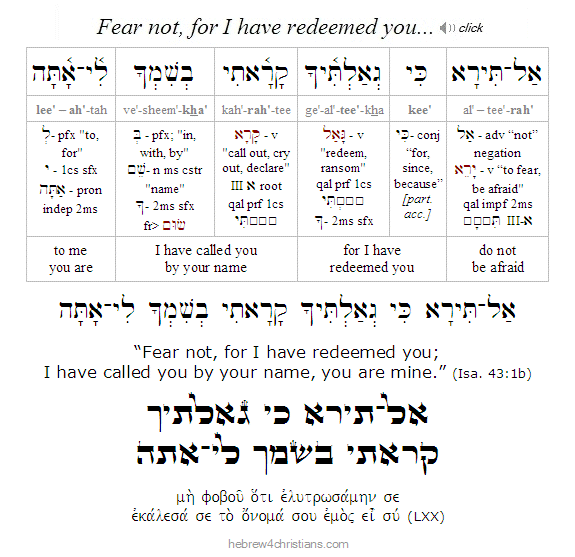 |
Exile and Joy...
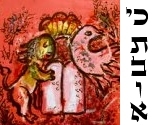
09.14.22 (Elul 18, 5782) In our Torah portion this week (Ki Tavo) we are warned of exile if we fail to express simchah (joy) for the fruit of our lives (see Deut. 28:45-47). We are to offer our bikkurim (first fruits) from an inward store of gratitude, from a heart that recounts the history of God's deliverance (Deut. 26:1-11). We don't superficially enter into the land. Instead of attaining joy by keeping the commandments, we keep the commandments by attaining joy, which is another way of saying that faith is the essence of all true Torah. "If we do not fulfill a mitzvah with joy, we do not understand the meaning of a mitzvah."
A Chassidic story, undoubtedly influenced by the New Testament, says that Rabbi Shmelke and Rabbi Moshe Leib of Sassov were traveling on a ship when a dangerous storm arose that threatened to destroy the vessel. Rabbi Shmelke went over to the Sassover and saw that he was engaged in a joyful dance. "Why are you dancing?" asked Shmelke. "I am overjoyed at the thought that I shall soon arrive in the mansion of my Father." "I shall join you, then," said Shmelke. But the storm spent its force, and the ship reached port in safety.
Inner joy comes from entirely trusting that God loves, forgives, and accepts you... Joy and peace spontaneously arise when you realize that God knows your "story" and promises you a "happy ending." It is faith in God's personal love for you...
Hebrew Lesson
Psalm 136:1 reading (click):
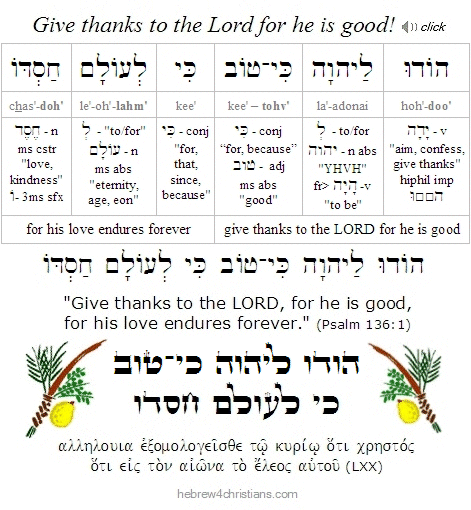 |
Relentless Blessings...

09.14.22 (Elul 18, 5782) From our Torah portion for this week (Ki Tavo) we read: "And all these blessings shall come upon you and overtake you, if you hear (shema) the Voice of the LORD your God" (Deut. 28:2). The language here is unusual, as if these blessings would seize you like an army takes an enemy stronghold. The sages comment that God's blessings can "overtake" you in a way that may hide their true purpose for your good (Rom. 8:28). At such times we do not understand they are a concealed mercy (רַחֲמִים נִסְתָר) designed for our benefit. Therefore king David affirmed his confidence despite being surrounded by trouble. Where it is written, "Surely goodness and mercy shall follow me all the days of my life" (Psalm 23:6), the verb translated "shall follow me" (i.e., יִרְדְּפוּנִי) comes from a root word that means "to pursue," as a hunter chases after his prey. David was sure that God's lovingkindness would "hound" him as he made his way through this world - even in the dark places, even in "the valley of the shadow of death" (בְּגֵיא צַלְמָוֶת) - where God's rod and staff would there comfort him and shepherd his way (Psalm 23:4). Therefore we we pray: "May your love, O LORD, be upon us, even as we hope for You."
יְהִי־חַסְדְּךָ יְהוָה עָלֵינוּ
כַּאֲשֶׁר יִחַלְנוּ לָךְ
ye·hee'-chas·de·kha · Adonai · ah·ley'·noo
ka·a·sher · yee·chal'·noo · lakh

"May your love, O LORD, be upon us,
even as we hope for You" (Psalm 33:22)

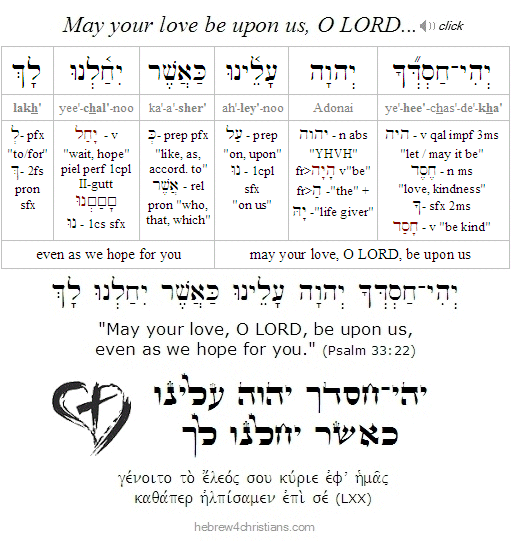
Whatever the heart seeks, it will find. We are constantly "asking, seeking, and knocking" (Matt. 7:7), even if we are often unaware of our heart's search. The one who pursues righteousness will find it, just as evil will come to the one who searches after it (Prov. 11:27). As it is written, "Those who worship worthless idols forsake the love (i.e., chesed: חֶסֶד) that could be theirs" (Jonah 2:8). David understood that as he pursued God, God's love would pursue him; as we seek, so we are sought by God; as we draw near to God, so He will draw near to us (James 4:8).
The prophet Hosea likewise cried out: "Let us know; let us press on to know (i.e., נִרְדְּפָה, "pursue after") the LORD; His going out is sure as the dawn; He will come to us as the showers, as the spring rains that water the earth" (Hos. 6:3). May God help us pursue him be'khol levavkha - with all our heart - because He has promised, "You will seek me and find me, when you seek me with all your heart" (Jer. 29:13). And may the love of the LORD indeed be upon us, even as we put our hope in Him. Amen.
 |
The Knowledge of God...
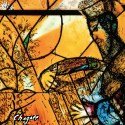
09.14.22 (Elul 18, 5782) The knowledge of God (ידיעת יהוה) is our supreme good and the "chief end of human life." It is our highest blessing, more precious than earthly riches, power, or any of the pleasures this world affords (Jer. 9:23-24; Prov. 3:15; Matt. 13:44-46). Those who do not esteem the true knowledge of God invariably fall into darkness, idolatry, and despair (1 Thess. 4:5; Eph. 4:17; Hos. 4:1-2). The knowledge of God sets us free to receive the inestimable blessing of eternal life given in the Messiah, as Yeshua testified: "And this is eternal life, to know you (לדעת אותך) the only true God (האל האמיתי היחיד), and Yeshua the Messiah (ישוע המשיח) whom you have sent" (John 17:3). Knowing God is the very reason for your existence and nothing can be compared with its superlative excellence (Phil. 3:8). Oh, the depth of the riches and wisdom and knowledge of God! (Rom. 11:33).
Hebrew Lesson
Proverbs 9:10 Hebrew reading (click):
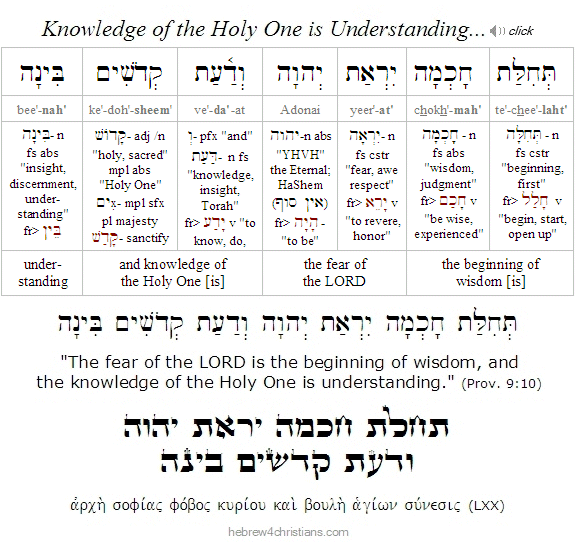 |
We attain the knowledge of God by first of all believing in its possibility. This in itself is a miracle, since only God can make us come alive to "see" and "hear" the truth of the Spirit (John 3:8). We must humble ourselves, confess our need, and ask God for the grace to truly know him. We must be willing to study his word. This involves doing teshuvah - turning to God and trusting that he wants us to have a genuine relationship with Him (Deut. 10:12). We first know God in our need for deliverance, our poverty of spirit, and our inner desperation for life, for without these primary and existential concerns, we will not be actually receptive to the divine presence. As we begin to trust in God, however, holy desire is awakened within us to know Him more deeply. We begin to "enshrine" his Presence within the sanctuary of our hearts, making a "place" for him, affirming his reality as what is most precious and glorious (Exod. 15:2). We discover the "one thing" that King David desired - to dwell in God's Presence all his days, beholding the beauty of the LORD and inquiring in his palace (Psalm 27:4). Amen.
 |
Put your Trust in Him...
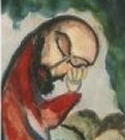
09.13.22 (Elul 17, 5782) Left to our own devices, we can't deal with the evil influences of this fallen world nor handle the raging impulses and fears of our sinful nature. Confess your need for God to fight for you, to shine his light in your darkness. Yeshua has conquered sin and death on the cross and now intercedes for you; therefore call upon his name for life - even if you want to scream out and cry! The LORD has promised to never leave nor forsake those who honestly seek him. (Psalm 9:10).
Courage and Change....

09.13.22 (Elul 17, 5782) As human beings, we experience everything in terms of spatio-temporal relationships. We can't help it. Whatever you experience is "framed" within boundaries of space and time. Language itself is embedded into this framework, since it is rhythmic (time-based) and intentional (space-based); that is, it attempts to correlate a sequence of human sounds with events in the world (the grandiose attempt to "transcend" these limitations has been the dream of metaphysical philosophers for ages, but the task is ultimately self-stultifying and idolatrous).
Look at the sweep of a clock's second hand and consider - if only for a moment - how life and time are intimately connected. If everything in the universe were to become completely motionless, then time itself would not exist. In fact, time is a kind of measurement of motion, and motion is a perception of changing states of affairs and their relationships.
Suffering reveals what is inside us -- it exposes our basic assumptions about life and our expectations about how things are "supposed" to be... Indeed people develop a "normalcy bias" by which they expect the future to resemble the past, though such inductive reasoning never provides deductive certainty of outcomes. Nevertheless, it is a principle of life in this world that everything is in a state of flux (τὰ πάντα ῥεῖ καὶ οὐδὲν μένει) and subject to "corruption" (φθορά), as it says in Romans 8:21. All of creation "sighs" and travails in pain together (Rom. 8:22). People are subconsciously aware of the omnipresent dissolution and feel it within their hearts and our bones - a hidden source of anxiety. You were not the same person you were just a moment ago - something has changed; you are different, you are literally in a new time and a new place; you are inevitably "going somewhere" but you are unsure where that is. If you find tragic the condition of your own frail mortality, you forsake the true condition of life in this world, and you likely will be scandalized by the inevitable suffering that is the common estate of humanity. This is part of revelation of our need for deliverance from the "sickness unto death."
"Perhaps ... experience merely defines, so to speak, the shape of that gap where our love of God ought to be. It is not enough. It is something. If we cannot "practice the presence of God", it is something to practice the absence of God, to become increasingly aware of our unawareness till we feel like men who should stand beside a great cataract and hear no noise, or like a man in a story who looks in a mirror and finds no face there; or a man in a dream who stretches out his hand to visible objects and gets no sensation of touch. To know that one is dreaming is to be no longer perfectly asleep." (C.S. Lewis: Four Loves)
If we are suddenly shocked from our "everydayness" we invariably will ask the question about the meaning or purpose of life. Is everything random, purposeless, pointless, and ultimately vacuous, or is there some goal or point to all the motion of the universe? How can I find a sense of belonging, a sense of place, that will be unshakable and abiding?
God speaks to us today, just as He spoke to the ancient Israelites who were questioning the meaning of their lives. Notwithstanding appearances to the contrary, the God of Israel is in control of history, and His chosen people - even if in exile - need not fear or be dismayed. Yes, there is comfort in the center of the storm: Life rages inscrutably on, but in midst of it you can hear the inner word, "Fear thou not, for I am with thee..." This is the way out of anxiety over death: τῇ γὰρ ἐλπίδι ἐσώθημεν - "for we are saved by hope" (Rom. 8:24). You can hope in the LORD and His ultimate plan for your life. You can trust that your life is eternally significant and meaningful. Every breath you take has been given to you from on High, and every hair on your head is numbered. There is a day soon coming when God will wipe away every tear and bring the fullness of love to your wounded and forlorn heart....
"Am I afraid to die? I am every time I let myself be seduced by the noisy voices of my world telling me that my 'little life' is all I have and advising me to cling to it with all my might. But when I let these voices move to the background of my life and listen to that small soft voice voice calling me Beloved, I know that there nothing to fear, and that dying ... leads me into the eternal embrace of my God whose love is everlasting." (Henri Nouwen: Life of the Beloved).
"Fear thou not, for I am with thee." Surely the LORD God of Israel is the same yesterday, today, and forever (Heb 13:8). Despite your present state of exile, God will neither leave you nor forsake you (Heb. 13:5, John 14:18). Trust now that He will strengthen and help you with "the right hand of His righteousness."
Hebrew Lesson
Isaiah 40:10 Hebrew reading (click):
Anticipating Yom Teruah...

09.13.22 (Elul 17, 5782) The "Feast of Trumpets" (i.e., yom teruah: יוֹם תְּרוּעָה), otherwise known as Rosh Hashanah (ראש השנה) in Jewish tradition, begins Sunday, Sept. 25th at sundown in Israel this year (Num. 29:1). There are worldwide tremors, engineered plagues, nation rising up against nation, men's hearts failing them for fear, worldwide apostasy and godlessness, and the love of many now runs cold... A time of testing is approaching. Look up, for the day of redemption draws near, chaverim.
The Light of Repentance...

[ The following is related to the month of Elul and the theme of teshuvah (repentance)... ]
09.12.22 (Elul 16, 5782) In the Gospel of John it is recorded that Yeshua said, "I am the way, the truth, and the life" (i.e., ᾽Εγώ εἰμι ἡ ὁδὸς καὶ ἡ ἀλήθεια καὶ ἡ ζωή), no one can come to the Father apart from my hand" (John 14:6). The Greek word translated "truth" in this verse is aletheia (ἀλήθεια), a compound word formed from an alpha prefix (α-) meaning "not," and lethei (λήθη), meaning "forgetfulness." Truth is therefore a kind of "remembering" something forgotten, or a recollecting of what is essentially real. Etymologically, the word aletheia suggests that truth is also "unforgettable" (i.e., not lethei), that is, it has its own inherent and irresistible "witness" to reality. People may pretend or even lie to themselves, but ultimately the truth has the final word... "The light shines in the darkness, and the darkness has not overcome it" (John 1:5).
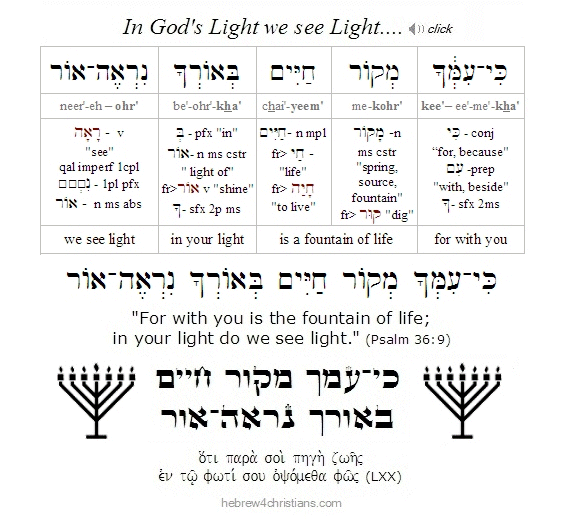 |
In God's light we see light... When you enter a dark room with a lamp, the darkness flees and is overcome by the light. So also with teshuvah: When we turn to the Lord spiritual darkness is overcome by the Divine Radiance. In Yeshua is life, the light of the world; those who receive Him behold ohr ha'chayim (אוֹר הַחַיִּים) - the "light of life."
During this Season of Teshuvah -- and always -- may the LORD God of Israel help us walk in the unforgettable and irrepressible radiance of His glory. May God help us shine with good works that glorify God's Name (Matt. 5:16). "For God, who said, 'Let light shine out of darkness' (יְהִי אוֹר וַיְהִי־אוֹר), has shone in our hearts to give the light of the knowledge of the Glory of God in the face of Yeshua the Messiah" (2 Cor. 4:6).
The High Cost for Apathy...

[ One of the great sins of our age is that of "acedia" (ἀκηδία) sometimes translated as "sloth," but is better regarded as a lack of care... It is a state of being numb, unfeeling, and emotionally disconnected from life. It's a type of heartlessness. Kierkegaard would describe it as a form of despair that refuses to surrender to God, or an attitude that refuses to accept responsibility.... ]
09.12.22 (Elul 16, 5782) From our Torah for this week (i.e., Ki Tavo) we read: "Cursed is anyone who does not uphold the words of this Torah to do them" (Deut. 27:26). This is because 1) God is God; 2) ultimate reality is non-negotiable, and 3) we are eternally accountable for all that we do (Matt. 12:36; Heb. 4:13). "Each person's deeds will become manifest, for the Day will disclose it, because it will be revealed by fire, and the fire will test what sort of deeds each one has done" (1 Cor. 3:13). There is a Scroll that attests the reality of all truth, and the life of every soul created by God is recorded therein (Rev. 20:12).
We are forbidden to add or subtract from Torah, since that is to refashion God's message into one of our own understanding (Deut. 4:2). Reading the tochachah or "rebuke" in our portion (i.e., Deut. 28:15-68) is difficult and painful, though it serves as a bitter medicine to wake us up from our lethal coma. In that sense the tochechah is a great blessing, since it shocks us into experiencing the "gravity of God's grace." This is why Yeshua proclaimed grave warnings about the dangers of forfeiting life and thereby "receiving" hell... Sin is a lethal problem, and we must turn to God for healing or we will die.
The Lord does not allow us to trifle with the truth, neither will he offer us a good that excludes Divine Reality since there simply is no such thing. God does not give us the option of affecting existential indifference toward Him, since apathy is as much a spiritual decision as is outright rebellion and apostasy. "If anyone thinks he has faith yet is indifferent toward this possession, is neither hot nor cold, he can be certain that he does not have faith. If anyone thinks he is a Christian and yet is indifferent toward being that, then he is not really one at all. Indeed what would we think of a person who gave assurances that he was in love and also that it was a matter of indifference to him?" (Kierkegaard). As King David inscribed upon his heart: "Guard me, O God, for in you I take refuge. I say to the Lord, "You are my Lord; I have no good apart from you" (Psalm 16:1-2).
Hebrew Lesson
Psalm 16:2 reading (click):
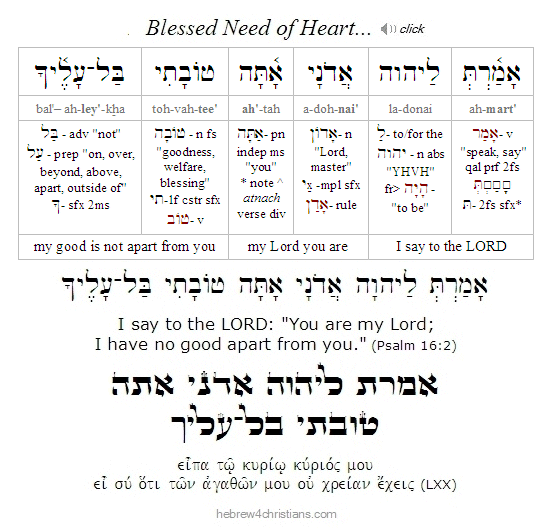 |
Teshuvah of Love...

[ God is love; the cross reveals that God is willing to sacrifice everything for your blessing. "There's no one that God doesn't want..." ]
09.12.22 (Elul 16, 5782) When considering the matter of teshuvah (i.e., returning to God), it is vital to understand that God does not love you based on your obedience, though his love for you will lead you to obedience... It is only after accepting that you are accepted despite yourself -- despite your inherent inability to please God, despite your incurably sick heart, despite your disobedience, sin, and so on -- it is only then that earnest, Spirit-enabled obedience may spontaneously arise within your heart. In that sense "obedience" is like falling in love with someone. It is your love that moves you to act and to express your heart, and were you prevented from doing so, you would undoubtedly grieve over your loss... Therefore the "law of the Spirit of Life in Messiah" is first of all empowered by God's grace and love. We walk by faith, hope, and love - these three. And this explains why the very first step of teshuvah (repentance) is to love God: Shema! Ve'ahavta et Adonai... The first work of faith is to believe in the miracle that God's love is "for-you-love..."
"The Christian is in a different position from other people who are trying to be good. They hope, by being good, to please God if there is one; or -- if they think there is not -- at least they hope to deserve approval from good men. But the Christian thinks any good he does comes from the Christ-life inside him. He does not think God will love us because we are good, but that God will make us good because He loves us; just as the roof of a greenhouse does not attract the sun because it is bright, but becomes bright because the sun shines on it." (C.S. Lewis: Mere Christianity)
If you find yourself operating from a sense of God's conditional acceptance, you will undoubtedly need to repeat the same sins over and over until your heart is finally convinced of its incurably wretched state. You must first be utterly sick of yourself to believe in the miracle of God's deliverance. Only then will the message of find opportunity to speak...
It needs to be added, however, that genuine repentance implies an understanding that sin is dreadfully bad since it separates us from God's love. Some seem to think Yeshua died on the cross for their sins so that could live their lives without regard for sin, but that is of course a perversion of the truth. Yeshua did not suffer, bleed out, and agonize upon the cross for our sins so that we'd be given license to disregard the dreadful horror of sin and God's great cost to remedy our hearts... Indeed, by treating sin lightly we disparage the sacrificial work of Yeshua given on our behalf -- we "crucify the Son of God afresh" and thereby deny God's wrath for sin as well as his severe mercy given to those who trust in him (Heb. 6:4-9).
Hebrew Lesson
Psalm 25:6 reading (click):
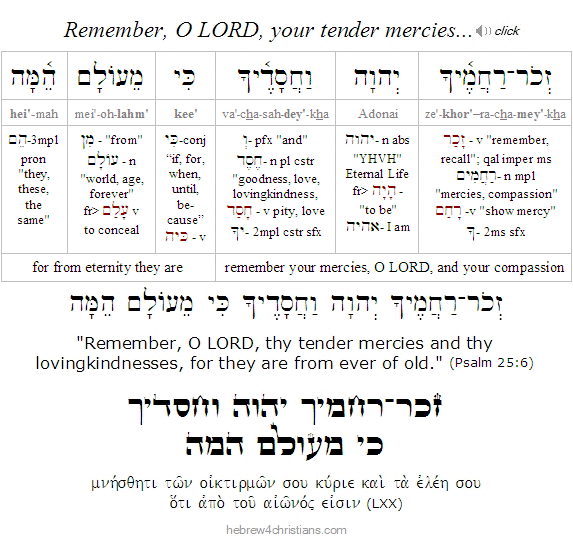 |
"Blessed is the man who walks not in the counsel of the wicked, nor stands in the way of sinners, nor sits in the seat of scoffers, but his delight is in the Torah of the LORD, and in His Torah he meditates day and night" (Psalm 1:1-2). Again, it is a severe mercy, a weighty grace, that is bestowed to us, friends...
Shabbat Kumi Ori - קוּמִי אוֹרִי

[ The following entry concerns this week's Torah reading, parashat Ki Tavo... ]
09.11.22 (Elul 15, 5782) Shalom dear friends. The great holiday of Rosh Hashanah (i.e., "Yom Teruah") will begin in about two weeks (i.e., Sunday, Sept. 25th at sundown). During the time leading up to the High Holidays, it is customary to engage in cheshbon ha-nefesh ("soul searching") and to derive comfort that God is forgiving and loving to those who sincerely turn to Him. Because of this, the Jewish sages chose seven "Haftarot of comfort" to encourage us to make our hearts ready for the upcoming High Holiday Season.
The haftarah for Ki Tavo (i.e., Isa. 60:1-22) is the sixth of the seven readings from the prophets that are consecutively read before Rosh Hashanah. These "haftarot of comfort" foretell of the restoration of the Jewish people and of the coming of the Messianic Era. In this week's reading, the haftarah portion describes the long-awaited future salvation of the nation of Israel. The LORD promises to shine His glorious light upon the Jewish people and to reveal His glory, despite the hour of darkness and tribulation that comes upon the earth:
"Arise and shine (קוּמִי אוֹרִי) for your light has come, and the glory of the LORD (כְּבוֹד יהוה) has risen upon you. For behold, darkness shall cover the earth, and thick darkness the peoples; but the LORD will shine upon you (וְעָלַיִךְ יִזְרַח יהוה), and his glory will be seen upon you (וּכְבוֹדוֹ עָלַיִךְ יֵרָאֶה). And nations shall come to your light, and kings to the brightness of your rising. Lift up your eyes all around, and see; they all gather together, they come to you; your sons shall come from afar, and your daughters shall be carried on the hip" (Isa. 60:1-4).
Sometime during the "plague of darkness" that represents the time of the Great Tribulation (i.e., the Day of the LORD and the judgment of the world, or Yom Adonai), Israel will finally turn to the LORD and receive Yeshua as their long-lost Messiah (Zech. 12:10). The veil will finally be taken away, and all Israel will be saved (Rom. 11:26; Isa. 59:20). The Light of Salvation (אור הישועה) will be revealed and the glory of the LORD (כְּבוֹד יהוה) will radiantly shine (זָרָח) upon the Jewish people. The land of Israel will be like Goshen during the times of the plagues of Egypt as the world powers are all judged and destroyed. Then the survivors of the nations will understand that the LORD is indeed with Israel and will turn to Him in surrender as well. "And the glory of the LORD shall be revealed, and all flesh shall see it together, for the mouth of the LORD has spoken" (Isa. 40:5). Yeshua will return to Zion to establish the Kingdom of God upon the earth (Zech. 2:10-13).
Hebrew Lesson:
Isa. 60:1 Hebrew reading (click):
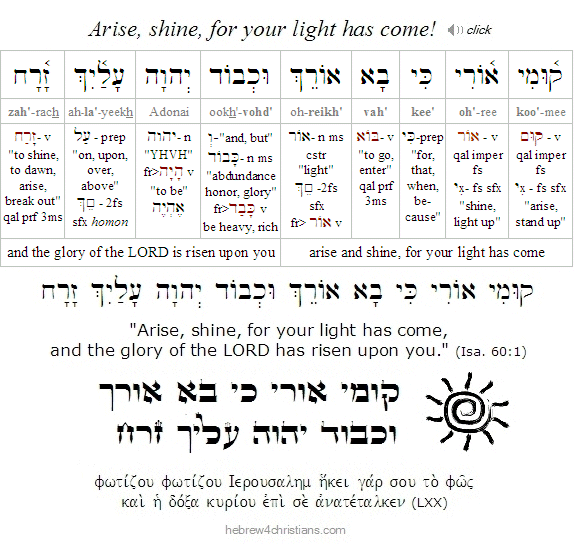 |
The LORD said to Moses from the midst of the shining flame: 'Take off your sandals from your feet, for the place on which you stand is holy' (Exod. 3:5). The Chofetz Chaim comments: We all need to rise higher... Never say, I will be able to lift myself up at another time or different place. By faith see that this place, right now, is holy ground, and awaits your response.
Note: For more on this haftarah see: "The Coming Glory of Zion: Haftarah Ki Tavo."
Shavuah Tov Podcast:
Parashat Ki Tavo..
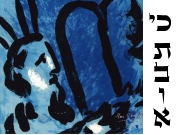
09.11.22 (Elul 15, 5782) In this week's "Shavuah Tov" audio podcast (see the links below) I discuss the the 40 day "Season of Teshuvah" leading up to the Jewish High Holidays as well as the central themes from weekly Torah portion, parashat Ki Tavo, which includes instructions for the people to ratify the Sinai covenant in the promised land by means of a special covenant renewal ceremony performed in the valley between Mount Ebal and Mount Gerazim. During this ceremony blessings for obedience and curses for disobedience would be declared, and Moses warned the people by providing a seemingly endless description of terrible consequences that would befall the Jewish people if they disobeyed the terms of the Sinai covenant (Deut. 28:15-68). I hope you will find it encouraging.
This week's Torah:
Parashat Ki Tavo - כי־תבוא

09.09.22 (Elul 13, 5782) Shalom, chaverim! Our Torah portion this week (Ki Tavo) includes instructions for the people to ratify the Sinai covenant in the promised land by means of a special ceremony performed in the valley between Mount Ebal and Mount Gerazim (later fulfilled by Israel, see Josh. 8:30-35). During this ceremony the blessings for obedience and the curses for disobedience would be declared, and Moses warned the people by providing a seemingly endless description of terrible consequences that would befall the Jewish people if they disobeyed the terms of the Sinai covenant (Deut. 28:15-68). In Jewish tradition this litany of woe is called the "tochachah" (תּוֹכָחָה), a word that means "rebuke" or "reprimand."
Reading the tochachah is difficult and painful, though it serves as a bitter medicine to wake us up and prevent us from falling into a lethal coma. In that sense the tochechah may be regarded as a great blessing, since it shocks us into experiencing the gravity of God's grace. This is similar to Yeshua's grave warnings about the dangers of hell. If we refuse to listen or rush past his words, we are missing the substance of God's lament given through the Hebrew prophets. Sin is a lethal problem, and we must turn to God for healing or we will die. As Blaise Pascal once wrote, "Between heaven and hell is only this life, which is the most fragile thing in the world." Therefore shuvah! -- turn to God and receive the blessing of life!
Hebrew Lesson:
Looking for Home...

09.09.22 (Elul 13, 5782) Our faith in Yeshua brings us into collision with the world and its vanities. We are to be "crucified to the world," and therefore we seek matters above, out of sight of other men. "We do not look at things that are seen, but things that are unseen" (2 Cor. 4:18). We are estranged from the world because we look away from its attractions, heeding the promises of the Eternal Lord, longing for that place that transcends the temporal pleasures and fleeting dramas of this age. God has subjected this world to vanity yet has set "eternity within our hearts" so that we abide in hope.
Meanwhile we regard all things as they relate to the truth of spirituality as taught by our Lord. We recognize God's moral law and the voice of conscience that overrules the vagaries of man's self-serving laws, understanding that all that we say, do, and think will be judged upon our death before the truth of God. We therefore look askance at worldly politics and the machinations of the godless, understanding that we groan in this life and are burdened, earnestly desiring death to be "swallowed up" in life, and that we should be clothed in the immortality of eternal life (2 Cor. 5:4).
Just as you trust and accept that Yeshua was crucified for you, identifying with you, taking your place in judgment, exchanging his life for your own, so you trust and accept that you have been crucified with him, and that your old life was taken away and replaced with a new, indestructible nature of his resurrection life. In other words, a union is created where his "for me" is answered by my "with him." Χριστῷ συνεσταύρωμαι – "I already have been crucified in Messiah" (Gal. 2:20). Indeed the two go together: to trust in the finished work of Messiah for you is to trust in his finished work within you... When he died on the cross for you, which sins didn't he bear on your behalf? which remedy did he leave unfulfilled?
Hebrew Lesson
Psalm 73:24 reading (click):
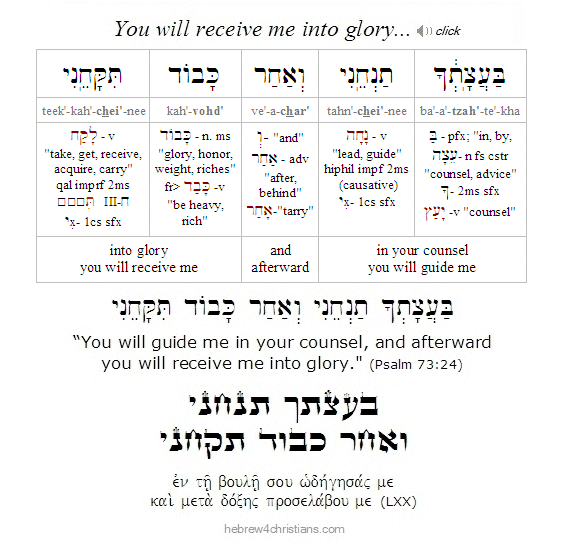 |
Shabbat shalom, friends. I appreciate your prayers for our family, especially at this time. Thank you and may the Lord bless you always. - John
The End of Brokenness...

[ The following is related to the month of Elul and the "Season of Repentance"... ]
09.09.22 (Elul 13, 5782) Spirituality is lived now, in this world... "I do not ask that you take them out of the world, but that you keep them from the evil one" (John 17:15). We are "in but not of" the world; we are part yet also not part of it... This is the tension of living in the realm of the "already-not-yet." We are haunted by a sense of incompletion - a yearning for the fulfillment of our salvation, an inner ache that helps focus the heart's affections...
A paradox of the spiritual life is that we must descend to ascend... We all sin; we all fall short. First we must accept our own "dark side" -- our own sinful nature -- before we can ever come to know the light... This is the path of confession - acknowledging the truth about who we really are, which is the only way we can learn to "endure ourselves" and eventually let go of our shame. We find ourselves when we give up our defenses and take hold of God's compassion. We all have our sins; now we must find our courage in God's love.
כִּי־פְשָׁעַי אֲנִי אֵדָע
וְחַטָּאתִי נֶגְדִּי תָמִיד
kee-fe·shah·ai · a·nee · ei·dah
ve·chat·tah'·tee · neg·dee · tah·meed

"For I know my transgressions,
and my sin is ever before me"
(Psalm 51:3)
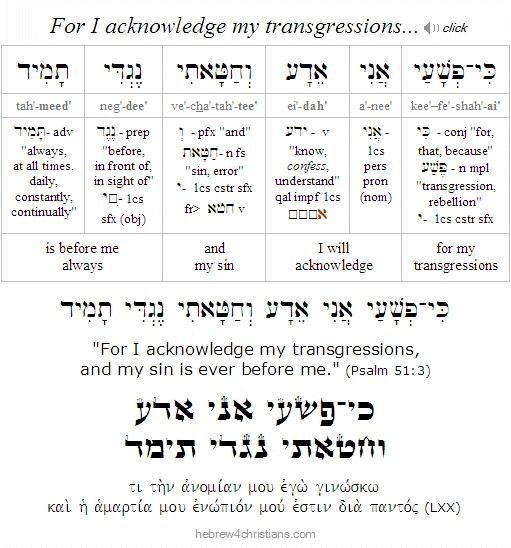
We must learn to "endure ourselves..." We can't deny who we are; we can't pretend to be what we are not. The root of shame is self-rejection. This is the hidden anguish of heart that leads many of us astray. As Henri Nouwen said, "There are two extremes to avoid: 1) being completely absorbed in your pain and 2) being distracted by so many things that you stay far away from the wound you want to heal." We don't come to the cross to destroy ourselves but to find deliverance and life: our brokenness is a means to this greater end. We "take up the cross daily," which means learning to forgive and endure ourselves... As theologian Paul Tillich once insightfully said: "The courage to be is the courage to accept oneself as accepted in spite of being unacceptable..." (Tillich).
In this age, we are part of a seemingly endless journey of falling down and getting back up once again. It is this struggle, this "good fight of faith," that eventually ennobles the heart and establishes character... In light of this, we must refuse to lose heart when things appear to be going badly, and likewise we must remain vigilant when things seems to be going well. The goal of the process is always to be in heartfelt, genuine, and earnest relationship with the LORD. As Madame Guyon once wrote, "You are born into the world like an illegitimate child who has no idea who his father is. But God comes and draws you out of your old life. He cleanses you and gives you back your innocence."
 |
Holy Introspection....

[ The unexamined life is not worth living, and indeed it is merely a facsimile of a worthwhile life... The following is related to the month of Elul and the theme of teshuvah (repentance)... ]
09.09.22 (Elul 13, 5782) Shalom friends... We are all on a spiritual journey, writing the "Book of our Life." To help us in the "writing" process, the Jewish sages decided that the entire month of Elul should be set aside as a season for cheshbon hanefesh (חֶשְׁבּוֹן הַנֶּפֶשׁ) - "making an account of the soul." This means that we attempt to engage in honest self-examination about our behavior and ask where we have been and where we are going. After all, what is the essence of teshuvah (i.e., "repentance") if it is not honesty with yourself? "For everyone who does wicked things (lit., ὁ φαῦλα, that which is "easy," "worthless," or "vain") hates the light and does not come to the light, lest his works should be exposed" (John 3:20). Therefore we make some time to reflect about our lives from the previous year. We ask searching questions like, "How did I get to this place in my life?" "Where am I now?" "Am I where I should be?" We engage in this process of self-examination with an aim to grow -- to let go of the pain and mistakes of the past in order to move forward. Confession (i.e., homologia: ὁμολογία) means bringing yourself naked before the Divine Light to agree with the truth about who you are. Indeed, the related verb word "homologeo" (ὁμολογέω) literally means "saying the same thing" - from ὁμός (same) and λόγος (word). We need to confess the truth if we are to be healed from the pain of the past (James 5:16). When King David wrote, יְהוָה אוֹרִי וְיִשְׁעִי מִמִּי אִירָ֑א - "The LORD is my Light and my salvation; whom shall I fear? (Psalm 27:1), he implied that he should even be free of fear of himself and of his past.
Of course we need God's help to do any of this, since it is easy enough to deceive ourselves, to deny the truth, in an attempt to protect our ego from shame. However being honest with ourselves is absolutely essential for any sort of authentic spiritual life... "No person is saved except by grace; but there is one sin that makes grace impossible, and that is dishonesty; and there is one thing God must forever and unconditionally require, and that is honesty" (Kierkegaard). Confession means "saying the same thing" about ourselves that God says - and that means not only acknowledging our various sins, transgressions, and iniquities, but also affirming our new identity as the beloved children of God. Saying that God doesn't love you is a lie as damning as denying His very existence...
Hebrew Lesson
Psalm 139:23-24 Hebrew reading (click):
 |
Victory over Evil...

09.09.22 (Elul 13, 5782) This week's Torah portion (Ki Teitzei) begins: "When you go out to war over your enemies" (i.e., כִּי־תֵצֵא לַמִּלְחָמָה עַל־איְבֶיךָ), which would seem to make more grammatical sense were it to say, "When you go out to war against your enemies..." The sages comment that the Torah is here saying that when we go out to war, we start out "over" our enemies, that is, in a state of victory by God's grace (Exod. 14:14).
Now today we do not engage in physical warfare to take possession of the promised land, and therefore we must understand our enemies to be the three enemies of the soul, namely, our own lower nature (yetzer ha'ra), the devices of Satan, and the godless philosophy of this present world of darkness (Eph. 2:2-3; 1 John 2:15-17; Eph. 6:10-11). Nevertheless we are assured victory over these by faith, understanding that "no good thing does the LORD withhold to those who are trusting in Him" (Psalm 84:11). In the midst of the battle, then, offer up praise (Psalm 18:3). God works all things together for your good (Rom. 8:28). "You are the God of my salvation (אֱלהֵי יִשְׁעִי), and in You do I hope all the day (Psalm 25:5). Barukh attah Adonai, shomei'a tefillah: (בָּרוּךְ אַתָּה יהוה שׁוֹמֵעַ תְּפִלָּה) – "Blessed are You, O LORD, who listens to prayer." Because of the victory of Yeshua at the cross, we do not work toward a place of victory against our enemies, but rather from the place of His victory (1 Cor. 15:57).
Blessed is our LORD Yeshua, the Killer of death; the Slayer of the Serpent; the final Victory of God's awesome love for us! We are made more than conquerors (ὑπερνικῶμεν, lit. "hyper-conquerors," "overcomers") through Him that loved us (Rom. 8:38). Therefore "thanks be to God, who in our Messiah leads us in a perpetual victory parade" (2 Cor. 2:14).
Hebrew Lesson
Psalm 84:11b Hebrew reading (click):
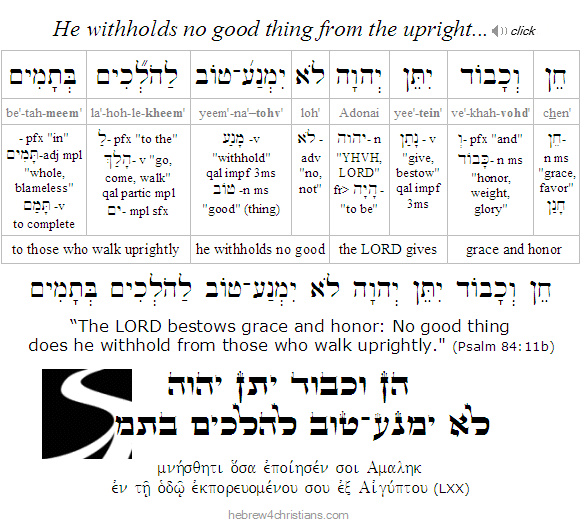 |
תורת האמונה
The Law of Faith ...
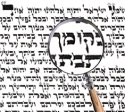
[ The following entry concerns this week's Torah reading, parashat Ki Teitzei, which contains more commandments than any other Torah portion... ]
09.08.22 (Elul 12, 5782) When asked how many commandments are in the Torah, most Jewish scholars will answer 613, based on Jewish tradition (the number 613 is sometimes called "taryag" (תריג), an abbreviation for the letters Tav (400) + Resh (200) + Yod (10) + Gimmel (3) = 613). Despite several attempts made over the centuries, however, there has never been a definitive list of these commandments, and of those who tried to compile such, no two agree... Some say the number 613 comes from a fanciful midrash that teaches that since there are 365 days in a year (corresponding to the 365 negative commandments) and 248 "parts" of the body (corresponding to the positive commandments), each day we should use our body to serve God.
Regardless of the exact count, however, the Talmud (Makkot 23b-24a) says, "Moses gave Israel 613 commandments, David reduced them to eleven (Psalm 15), Isaiah to six (Isaiah 33:15-16), Micah to three (Micah 6:8), Isaiah reduced them again to two (Isaiah 56:1); but it was Habakkuk who gave the one essential commandment: v'tzaddik be'emunato yich'yeh, literally, "the righteous, by his faithfulness - shall live." In the New Testament, the apostle Paul had (earlier) distilled the various commandments of the Torah to this same principle of faith (see Rom. 1:17, Gal. 3:11, and Heb. 10:38).
This small phrase, consisting of just three words (וְצַדִּיק בֶּאֱמוּנָתוֹ יִחְיֶה), is perhaps the pivotal axis upon which our salvation turns, since it distills the requirement that we are justified by our faith in God, and not by "works of righteousness which we have done" (Titus 3:5). In other words, salvation is "of the LORD," it is his righteousness given to us through his love...
All the Torah's commandments may be derived from the Ten Commandments given at Sinai, the most basic of which is the very First Commandment, namely, "I AM the LORD your God (אָנכִי יְהוָה אֱלהֶיךָ) who brought you out of Egypt, out of the house of slavery" (Exod. 20:2). This is the starting point for the law, namely to believe that God exists and has personally redeemed you from the slavery of your past. This is the very first step of Torah, since until you personally believe that the Lord is your God who redeems you, none of the other commandments will have any traction within your heart... Amen, Yeshua taught us the law of faith in God's love (תורת האמונה), which preempts, overrules, and informs all the others...
Hebrew Lesson
Habbakuk 2:4 Hebrew reading (click):
Teshvuah of Wisdom....
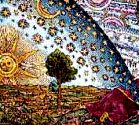
[ The following is related to the month of Elul and the theme of teshuvah (repentance)... ]
09.08.22 (Elul 12, 5782) Moses prayed to God: "teach us to number our days," that is, help us understand how to make our days count for eternity, to have a weight of glory that will shine in the world to come... The sages say on the day of death, one considers one's life as if it had been a single day. Life goes by so quickly, and we never know when our personal Rosh Hashanah will come. "No one knows the day or hour..." That's why it is so vital to be healed and to turn to God while there is still time. So turn to him today and bacharta ba'chayim – "choose life!" "For this commandment (of turning to God in teshuvah) is not hidden from you, and it is not far away. It is not in heaven... nor across the sea.... Rather, the matter is very near you - in your mouth and your heart - to do it" (Deut. 30:11-14; cp. Rom. 10:8-13).
לִמְנוֹת יָמֵינוּ כֵּן הוֹדַע
וְנָבִא לְבַב חָכְמָה
leem·noht · yah·me'·noo · kein · hoh·da
ve·nah·vee · le·vahv · chokh·mah

"Teach us to number our days
that we may get a heart of wisdom."
(Psalm 90:12)

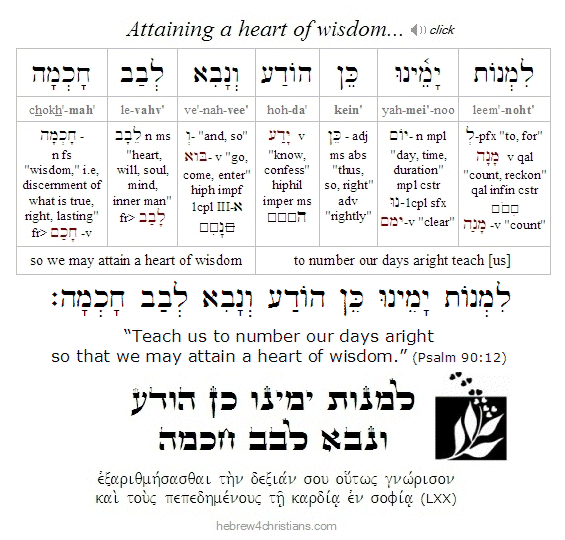
Despite the frailty and brevity of our days, may it please God to shine the power of His radiance upon us and to establish our works for His praise. May He help us to "number our days" so that we may obtain levav chokhmah (לְבַב חָכְמָה) - a heart of wisdom to live according to His will (James 1:5). Above all else, may the "God of our Lord Yeshua the Messiah, the Father of Glory (אֲבִי הַכָּבוֹד), impart to you a spirit of wisdom and of revelation in the knowledge of Him, having the "eyes of your hearts" (ὀφθαλμοὺς τῆς καρδίας) enlightened, that you may know what is the hope to which he has called you" (Eph. 1:17-18). May you be strong, resolute, and fully focused on our LORD, chaverim. Amen.
The Exigency of Repentance...
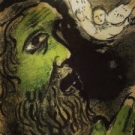
09.08.22 (Elul 12, 5782) In the Gospel of Luke we read that some people once came to Yeshua to share the terrible news that Pontius Pilate had murdered several Jews from Galilee as they were offering sacrifices at the Temple (Luke 13:1). Apparently Pilate even mingled the blood of these Galileans with their offerings! Horrible. Dreadful. How could this have happened? Why would God allow such a thing?
We are unsure why these people shared this awful news with Yeshua. Were they testing him? Perhaps they hoped he would openly identify with the Zealots who sought to overthrow the Romans, or perhaps they wanted him to say that the Galileans deserved retribution for some sort of wickedness -- or perhaps they just shared out of morbid concern -- but regardless of their motive, Yeshua replied by asking them a question: "Do you think these Galileans were worse sinners than all the other Galileans, because they suffered these things?" And then he added: "I tell you, no; but unless you repent you will all likewise perish" (Luke 13:2-3). Now that was unexpected. Why did he say that the same sort of fate would befall them? Yet to reiterate his point, Yeshua recalled the sudden death of several people when the Tower of Siloam fell: "Those eighteen who were killed when the tower in Siloam fell on them, do you think they were worse offenders than all the others who live in Jerusalem? I tell you, no; but unless you repent you will all likewise perish" (Luke 13:4-5). There's no mention of the reaction of the people when Yeshua said this, but it was likely one of shock, anger, and fear.
What was Yeshua trying to teach by his response to these tragedies? Was he being cruel to point out that unless people repent, they would suffer tragedy in their lives? Well first it is likely that he was countering the assumptions behind the thinking of his listeners, namely, the idea that unexpected death happens only to people who are notoriously bad and therefore deserve judgment from heaven. On the contrary, trouble often befalls the righteous, while worldly success and comforts often are gained by the wicked. Yeshua therefore rejects simplistic answers as to why death happens, and he instead consigns tragedies, suffering, and trouble to be an inescapable part of life in a broken and fallen world. Death is the inheritance of all the children of Adam, and humanity is under the divine curse until it would be removed by the atonement of the Yeshua upon the altar of the cross (Gal. 3:13). If there is a deeper reason as to why particular tragedies occur, we are not privy to such information. Yeshua, however, warns us from thinking that some people deserve judgment more than others, but on the contrary, that all people are sinners in need of salvation (Rom. 3:23).
The lethal consequence of the fall of Adam extends beyond acts of human sinfulness, to natural disasters and matters of sickness, disability, and physical death, however. For example, when the disciples encountered a man who had been born blind they asked Yeshua: "Rabbi, why was this man born blind? Was it because of his own sins or his parents' sins?" Yeshua then answered: "It was not that this man sinned, or his parents, but that the works of God might be manifest in him" (John 9:1-3). Though we naturally assume that there must be a reason for whatever happens, we are not given explicit explanations, and therefore we should be cautious when making inferences. It is a matter of trust that God will bring about a wonderful end for us -- even if we presently may experience pain, sorrow, and various kinds of suffering in our lives. That's part of the consummation of our redemption, after all. However, it is written: "We must through much tribulation enter into the kingdom of God" (Acts 14:22) and "Unless a grain of wheat falls into the earth and dies, it remains alone; but if it dies, it bears much fruit" (John 12:24). We are both redeemed people but we live within fallenness...
Sadly people often die with little warning and for no clearly identified reason. Life is precarious, fragile, and poignant. Yeshua does not defend God's governance of the universe; he knows His heavenly Father is loving, just, and righteous in all his ways. He groans over our suffering and indeed tastes death for every one. He was born to die. "My God, my God, why have you forsaken me?" was his cry on the cross, in the hour of his abandonment and utmost grief. Yeshua entered in the depths of our sin and embraced it as his concern and passion to remedy on our behalf. He was alone in the dark cloud to intecede for us...
In light of the unpredictable perils of life, then, Yeshua wants all people to understand their great need for teshuvah, or repentance. This was the burden of his ministry to us, the very reason he came. And indeed teshuvah is first word of his proclamation: "The time is fulfilled, and the kingdom of God is at hand. Repent, and believe in the gospel" (Mark 1:15). Yeshua wants everyone to know their need for deliverance and his power to save them from death...
The central problem for human beings - both the so-called good as well as the bad - is that of spiritual death, that is, the destruction of one's soul. The danger is real for all of us. Each of us may be unprepared for sudden death, and therefore it is vital to turn to God for life while we have the opportunity. We must be wary of a false sense of security; we must understand our radical need for healing and turn to God for salvation. Time is running out. Our days are numbered. We must sincerely repent lest we perish in uncertainty and darkness of heart...
But this is not all. Yeshua continued his teaching about the danger of perishing without repenting by giving the "parable of the fig tree" (Luke 13:6-9). A certain man had a fig tree in his vineyard that did not bear fruit. When he decided to cut the tree down, his gardener intervened: "Sir, give it one more chance; leave it another year, and I'll give it special attention and plenty of fertilizer. Then if it bears fruit next year, well and good; but if not, you can cut it down." Among other things this parable teaches that a tree that is fruitless will eventually be destroyed, echoing John the Baptist's warning to turn to the Savior for life: "Even now the ax of God's judgment is poised, ready to sever the roots of the trees. Yes, every tree that does not produce good fruit will be chopped down and thrown into the fire!" (Matt. 3:10). The fruit here is that of teshuvah, or repentance (Luke 3:8). The "fruits worthy of repentance" are those derived from heartfelt trust in God's salvation, resulting in a radical change of direction, an abiding abhorrence over personal sin, and an earnest turning to God to escape from the wrath to come - the wrath that is ready to break forth in fiery judgment upon the earth. True repentance is a change of mind (μετάνοια), "taking down high thoughts and bringing them into obedience to Christ" (2 Cor. 10:5). The parable teaches that a life devoid of teshuvah, and in particular a soul devoid of faith in Yeshua as the Savior and deliverer of the soul, will be unprepared for death. The gardener is patient and does everything he can to rescue the tree, but if the tree continues to be fruitless, it will be removed suddenly and irrevocably. The point of the parable is a great question. Will fruit emerge in time before the tree would be felled in judgment? How much time remains for the tree before its day of reckoning comes?
Why does God want us to face the truth about death? Why does Moses ask God to teach us to "number of our days?" (Psalm 90:12). Why does David pray: "LORD, make me to know mine end, and the measure of my days, what it is; that I may know how frail I am" (Psalm 39:4)? The reason is that by nature people deny the reality of death - they hide their eyes from it, ignore it, and pretend it's not there - so they can continue to live under the illusion that they are in control of their lives, that they are the center, that they are immortal little "gods." Death threatens the ego and humbles us to confess the truth about life, namely that we are not in control, that we cannot choose to be immortals, that we do not have power to exist in ourselves, and therefore we need life from a different source - spiritual life - wherein we receive a new identity and a new being found in relation to God.
So in light of all this, what can we learn about repentance? Far more than moral reformation or "self-improvement," the word teshuvah means turning to God in our brokenness, regretting the sin of our life, and fundamentally changing the way we think. Most of all it means trusting in God, believing in the miracle of resurrection life, and relying upon his promises despite the transience, jeopardy, and uncertainty of our lives in this world. Repentance is the confession of our fragility and of our need for God to carry us through the darkness into the presence of his glorious light; it means finding faith to be healed from the sickness of spiritual death and to exist as a new creation for God's glory. It believes that one day we will be home in the house of God's unending love... Repentance is a heart that won't let go of God's love.
Hebrew Lesson
Psalm 39:4 Hebrew reading (click):
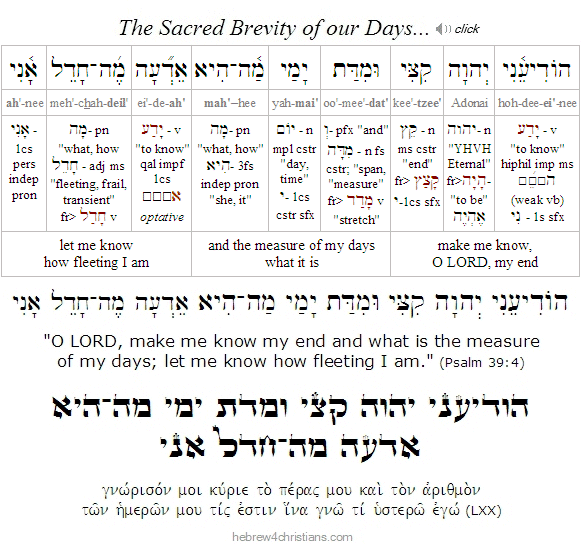 |
Restoring what is lost...
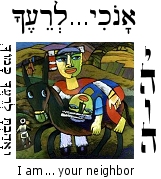
09.07.22 (Elul 11, 5782) In our Torah reading for this week, parashat Ki Teitzei, we read: "Do not ignore the loss of your brother... you shall restore it to him" (Deut. 22:1-3). This indicates that we have a moral duty to return lost items to others, and on a spiritual level that includes restoring honor and dignity to those who have lost sight of their value in the eyes of God... For even greater reason we must make restitution to those whom we have harmed.
Making amends is part of the teshuvah process. We hurt ourselves when we hurt others, and we hurt others when we hurt ourselves. The way out of that circle is through making amends. As Yeshua taught: "If you are offering your gift at the altar and there remember that your brother has something against you, leave your gift there before the altar and go. First be reconciled to your brother, and then come and offer your gift" (Matt. 5:22-23). "Therefore, confess your sins to one another and pray for one another, that you may be healed. The prayer of a righteous person works great power" (James 5:16). Ultimately, confession of the truth is not optional for anyone.
Indeed, regarding the duty to restore what is lost to our brother mentioned above, the Torah adds, "and you are not to ignore it," which literally reads, "you are unable to hide it" (לא תוּכַל לְהִתְעַלֵּם). Rabbi Abraham Twerski notes that the Torah is not giving us a command as much as stating a fact: You are unable to hide from a wrongful act. In other words, the problem with "getting away with it" is that you get away with it, that is, you take it with you. Such self-deception sears your conscience, makes you numb inside, and deadens the heart. Making amends to others is life-giving, helping you let go of what you've done wrong to restore inner peace. We must be vigilant not to let our hearts die because of either shame or rationalization. May the LORD help us walk in the Spirit of Truth.
Hebrew Lesson
Lev. 19:18a Hebrew reading (click):
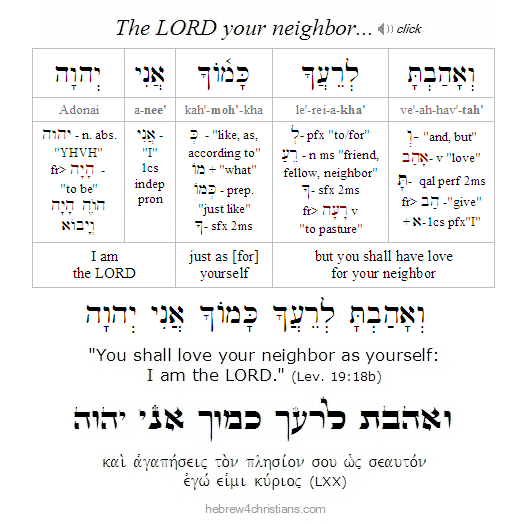 |
Fighting Spiritual Blindness...

[ "I have not lost faith in God. I have moments of anger and protest. Sometimes I've been closer to him for that reason." - Elie Wiesel ]
09.07.22 (Elul 11, 5782) Our Torah portion this week (Ki Teitzei) commands us to remember what the Amalekites did to the Jewish people just after they left Egypt during the time of the Exodus (Exod. 17:8-16; Deut. 25:17-19). Paradoxically God commanded the Israelites to "blot out the remembrance" of Amalek while swearing to fight Amalek "from generation to generation" (Deut. 17:16). In this connection note that the name "Amalek" (עֲמָלֵק) begins with the letter Ayin (symbolizing the eye) and equals 240 in gematria -- the same value for safek (סָפֵק), the Hebrew word for doubt. Amalek therefore symbolizes "the eye of doubt," or even "the severed eye" (the Hebrew verb מָלָק means "to chop" or "sever" in reference to the "eye" of Ayin). The power of Amalek therefore represents spiritual blindness as it acts in the world. We are never to forget that the light of God overcomes the darkness of this world, and that light is found in Yeshua our LORD....
Hebrew Lesson
Deut. 25:17 Hebrew reading (click):
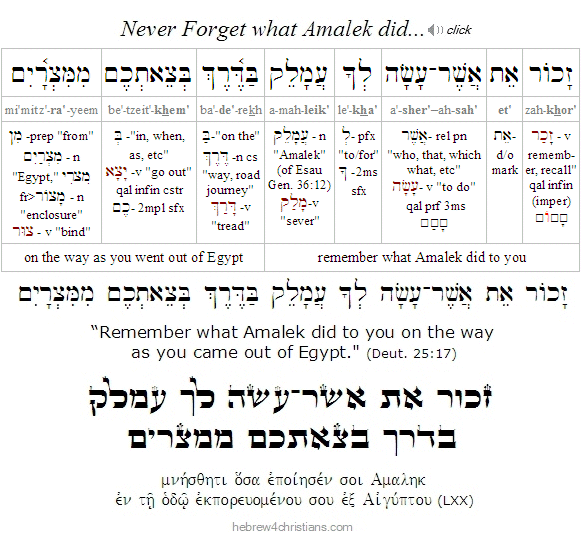 |
The Blessing of Letting Go...

[ The following is related to the month of Elul and the Forty days of Teshuvah... ]
09.07.22 (Elul 11, 5782) "And he opened his mouth and taught them, saying... "Blessed are the lowly and humble, for they shall inherit the earth" (Matt. 5:5). Those conscious of their inner poverty, who mourn over their sinful condition, and who are afflicted with themselves, can let go of the need to "manage appearances," to be in control, or to seek validation from others, and therefore they are free to surrender their lives to God's care. They "flow" with the Father's will as a "gentle breeze," no longer resisting or striving, but simply trusting in God's care. When they are wronged, they seek neither revenge nor vindication, but only healing and restoration (1 Pet. 2:23). Paradoxically, it takes strength to be genuinely "lowly of heart," but such is found in the Spirit of God (Zech. 4:6). Indeed, the Spirit leads us to our inheritance: "the humble shall inherit the land and delight themselves in great peace" (Psalm 37:11). The fruit of the Spirit is the outgrowth of God's miraculous life with us, and we partake of that life when we live in Yeshua (John 15:1-5; Gal. 5:22-23).
Hebrew Blessing:
בָּרוּךְ אַתָּה יהוה שֶׁעוֹזֵר לִי לְהַרְפּוֹת
bah-rookh · a-tah · Adonai · she'-oh-zeir · lee · le-har-poht

"Blessed are you, LORD, who helps me to let go."

God "opposes the proud but gives grace to the humble." The LORD our God dwells with those "of a contrite and lowly spirit, to revive the spirit of the lowly, and to revive the heart of the contrite" (Isa. 57:15). True greatness is found in outside of the self, beyond the instincts of the carnal ego. Those who seek to exalt themselves and to "gain the world" do not understand that the very reason for their life is to be sacrificed for the sake of love. Obeying God's call to love is not a burden, but rather sets the heart free. As Yeshua said, "Come to me, all who labor and are heavy laden, and I will give you rest. Take my yoke upon you, and learn from me, for I am gentle and lowly in heart, and you will find rest for your souls. For my yoke is easy, and my burden is light" (Matt. 11:28-30).
Hebrew Lesson
Matt. 5:5 Hebrew reading (click):
The Truth Matters...

09.06.22 (Elul 10, 5782) Truth matters. I don't mean "opinion" here, but real, objective, hard-core truth. Truth reveals reality. Aristotle defined it this way: "To say of what is that it is not, or of what is not that it is, is false, while to say of what is that it is, and of what is not that it is not, is true" (Metaphysics). Genuine knowledge (γνῶσις), as opposed to illusion, depends on truth, since knowledge constitutes true belief, whereas illusion (and opinion) does not. The Greek word for truth is aletheia (ἀλήθεια, from α[not] + λήθω [to hide]) which implies being awakened to the revelation of being. The Hebrew word for truth is emet (אֱמֶת), which is related to the idea of fidelity or correspondence with reality (אָמַן).
How you think about life has implications. You are responsible to think clearly. God's hidden attributes are clearly apprehended by the mind so that people who deny spiritual reality are without excuse (Rom. 1:19-20). If you think a map will faithfully guide you to the right place, you will use it; if you think it leads to an opposite end, you will not. Thinking one way leads you to success, whereas the other way leads to failure. The Scriptures state: "there is a way that seems right to a man, but its end is a way of death" (Prov. 14:12).
Hebrew Lesson
Prov. 14:12 Hebrew reading (click):
Truth (אֱמֶת) apart from God who is Alef (א) leads to death (מֵת). Sincerity of conviction is no test of truth since you can be sincere and sincerely wrong. How many have perished in this world because they believed they were on the right course when in fact they were not? Yeshua made bold the claim that there was no way to know the heart of God apart from him... there is salvation is no other. Either he spoke the truth or he did not; either he can be trusted for the direction (תּוֹרָה) of your life or he cannot; either he expresses the Salvation of God or he does not. The issue of truth demands that we must choose whom we will serve...
Shavuah Tov Podcast:
Why then the Law?
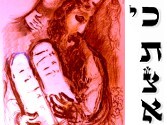
09.06.22 (Elul 10, 5782) Our Torah reading for this week (i.e., Ki Teitzei) identifies 74 of the Torah's 613 commandments -- more than any other Torah portion -- which again raises the question of whether we are obligated to follow the lawcode of Moses or not... In this Shavuah Tov broadcast, I explore how we are to understand the law in light of the salvation given in Yeshua the Messiah. I hope you will find it both provocative and helpful.
Strength of His Praise...

09.06.22 (Elul 10, 5782) If you are having a tough day today, or if you feel oppressed, lonely, or heavy of heart, let me encourage you to praise God anyway... Offering thanks to the LORD is a powerful weapon for announcing God's triumph over the darkness of the present hour (2 Cor. 10:4). Indeed, the Lord is "enthroned" by the praises (תְּהִלּוֹת) of His people (Psalm 22:3). Therefore give voice to your hope and confidently affirm: "Behold, God is my salvation (i.e., my yeshua, my "Jesus"); I will trust, and will not be afraid; for the LORD God is my strength and my song, and he has become my salvation" (Isa. 12:2).
Hebrew Lesson
Isa. 12:2 Hebrew reading (click):
Therefore "do not be grieved (even over yourself), for the joy of the LORD is your strength" (Neh. 8:10). Affirming the love, goodness, faithfulness, compassion, and salvation of God is a powerful way to defeat the enemy of our souls, who regularly seeks to discourage us. King David constantly asked God to help him in his spiritual struggles. "Though I walk in the midst of trouble (בְּקֶרֶב צָרָה), you preserve my life; you stretch out your hand against the wrath of my enemies, and your right hand delivers me" (Psalm 138:7). "For the enemy has pursued my soul; he has crushed my life to the ground; he has made me sit in darkness like those long dead. Therefore my spirit faints within me; my heart within me is appalled" (Psalm 143:2-3). Though we must fight through the stubborn darkness and yet endure ourselves, "the LORD is near to the brokenhearted and saves the crushed in spirit (Psalm 34:18). Indeed, the Lord God is far greater than your heart's sin and will one day entirely deliver you of sin's effect and influence. Amen, and let it be, LORD...
Behold the goodness and kindness of our God! Where it is written: "Know Him in all your ways" (Prov. 3:6), this of course includes the way of your struggles and the way of your transgressions... Acknowledge these ways before Him, too, and trust that God will help you overcome fear and depart from your sin (Prov. 28:13). As it is said, "Because he is devoted to Me I will deliver him; I will keep him safe, for he knows My Name. When he calls to Me, I will answer him; I will be with him in trouble; I will rescue him and honor him. With long life I will satisfy him and show him My salvation" (Psalm 91:14-16).
Hebrew Lesson
Psalm 28:7 Hebrew reading (click):
Endurance and Healing...

09.06.22 (Elul 10, 5782) Though our promised healing assuredly will come to us, it remains the exclusive prerogative of God to allow trials in our lives for our ultimate good. Therefore faith is the key here: Steadfastly affirm your healing even in the midst of your anguish, because your suffering is a test designed to teach you to trust God and to receive the blessing apart from any empirical evidence (2 Cor. 4:18). As the Torah declares of our father Abraham: והאמן בּיהוה ויּחשׁבה לו צדקה -- "And he believed in the LORD, and He counted it to him for righteousness" (Gen. 15:6); and also of Job's faith in the midst of his agonizing struggle: הֵן יִקְטְלֵנִי לוֹ אֲיַחֵל -- "Though he slay me, I will hope in him" (Job 13:15).
Sometimes all we can do is cry out to the LORD for deliverance... Our heart's cry does not question God's goodness to us, though we may silently wonder about the extent to which affliction may be required to mend our hearts. As C.S. Lewis once said, "We are not necessarily doubting that God will do the best for us; we are wondering how painful the best will turn out to be" (Letters of C.S. Lewis, 1964). There is a trust issue in suffering, and an intimacy that comes through its fires. Do not jump to conclusions; resist any insinuation that the Lord is being unjust! As Kierkegaard reminds us, "It is one thing to conquer in the hardship, to overcome the hardship as one overcomes an enemy, while continuing in the idea that the hardship is one's enemy; but it is more than conquering to believe that the hardship is one's friend, that it is not the opposition but the road, is not what obstructs but what develops, is not what disheartens but ennobles" (Four Upbuilding Discourses, 1844).
The difficulty of intense personal suffering is deeply existential: how do you keep hope in the midst of this tension? "Lord I believe; help my unbelief" (Mark 9:24). How do you affirm that your heavenly Father will heal you but at the present hour you must continue to endure suffering? Do you then devise a "soul-building theodicy" to explain your struggle – providing a narrative to answer the "why" of your suffering -- or do you attempt to sanctify suffering as a means of healing others by the grace of the Messiah (Col. 1:24)? When Yeshua victoriously proclaimed, "It is finished" just before he died on the cross, he foreknew that his followers would experience a "purging process," a "refining fire," and time on the "potter's wheel" to perfect their sanctification. At the cross of Yeshua death itself was overcome – and all that it implies – and yet it is nevertheless true that we will suffer and die ourselves and that death persists an enemy (see 1 Cor. 15:26). While we celebrate the reality of the final redemption, the "instrumentality of our sanctification" needs to be willingly accepted and endured. I say "endured" here because I don't think we will ever have a complete answer to the question of "why" we undergo the various tests we face in this life. Our disposition in the midst of this ambiguity, in the midst of seemingly unanswered prayers, is where our faith is disclosed: will we despair of all temporal hope or not? Will we console ourselves with the vision of a future without tears and loss - a heaven prepared for us -- or will we resist the present darkness and seek to find deliverance in this hour? Do we trust God with our pain and submit to his will, or will we "die" inside – losing hope and despairing of all remedy?
As King David once wrote, "At an acceptable time, O God, in the abundance of your steadfast love answer me in your saving faithfulness. Deliver me from sinking in the mire; let me be delivered from my enemies and from the deep waters. Let not the flood sweep over me, or the deep swallow me up, or the pit close its mouth over me. Answer me, O LORD, for your compassion is life; in the abundance of your mercies turn to me" (Psalm 69:13-16).
ענני יהוה כי־טוב חסדך
כרב רחמיך פנה אלי
a·nei'·nee · Adonai · kee-tohv · chas·de'·kha
ke·rohv · ra·cha·mey'·kha · pe·neh · e·lai

"Answer me, O LORD, for your compassion is life;
in the abundance of your mercy turn to me."
(Psalm 69:16)

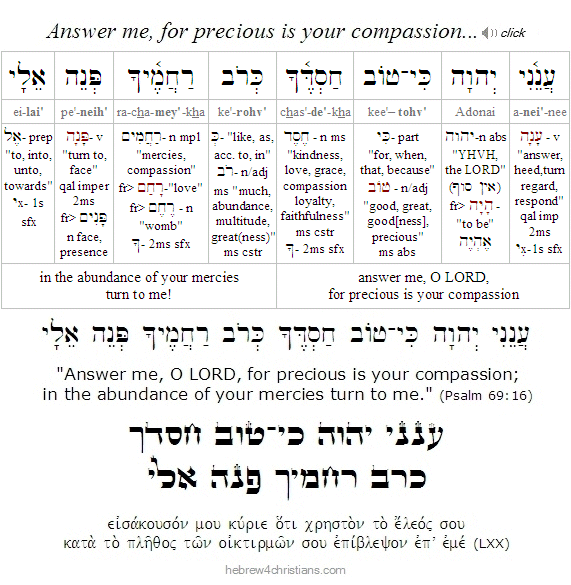
"But You, O GOD my Lord, do Thou for me for your own Name's sake; because your steadfast love is good, deliver me" (Psalm 109:21). "Do thou for me" is the confession that God alone has the power to help. Asking God to bring glory to His own Name -- to honor and magnify His Name -- is the theme of all true intercession.
Suffering has a way of focusing the heart and mind, reminding us that "today is the tomorrow of yesterday." Life is short, and our need is great to turn to the LORD and take hold His promises. We take comfort that God is for us the God of salvation: "Blessed be the Lord, who daily bears us up; God is for us our salvation. Selah. Our God is a God of salvation (יְשׁוּעָה), and to GOD, the Lord, belong deliverances from death" (Psalm 68:19-20).
Be encouraged, beloved brothers and sisters in the Lord. All those who are "fathered by God" conquer the world, since God imparts to us the victory of faith by means of His powerful Spirit (1 John 5:4). Therefore the heart of faith steadfastly affirms, "In all these things [afflictions, tribulations, etc.] we are 'more than conquerors' (lit., "hyper-conquerors," i.e., ὑπερνικῶμενfromὑπέρ, "hyper" + νικάω, "to overcome") through Him that loved us (Rom. 8:37).
 |
Teshuvah of Humility....
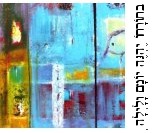
09.05.22 (Elul 9, 5782) Only Yeshua imparts eternal life to the trusting soul, enabling the heart to truly and radically change. However, to receive this utmost blessing, we must settle the question of our profound need for deliverance from our corrupt inner nature. We simply cannot hear the message of the gospel if we do not feel hopelessly trapped within the consciousness and conviction of our sin. If we believe that we must justify our own existence by means doing good or by means of religious practices, for example, we will likely turn against God by regarding him a taskmaster who demands too much from us. If however, we realize that we cannot please God apart from his merciful intervention in our hearts, we learn to let go and abandon ourselves to his mercies. Those who cannot fathom the grace of God, however, are consigned to go back "under the law" again and again until the question of their powerlessness is settled. Until that miraculous moment of awakening comes, however, the message of Yeshua will make little traction within the heart.
Grace often comes in disguise because the ego has to be humbled for the heart to confess its need. When the veil is pulled back, and we discover with a shock that we ourselves are evil, and that despite our ideals we need deliverance from our inner wretchedness, we begin to turn to God not merely for mercy, but for the miracle of transformation - a new kind of life, a new heart, a new spirit - freedom from the soul sickness that haunts us in our secret shame and self reproach.... It is when we are at the "end of ourselves" -- when we know in our bones that we must "find God or die" -- that we can turn to Yeshua for life.
It is hard for the "rich" to enter the kingdom of God; it is hard for those who are self-satisfied, who regard themselves as moral, righteous, and who pray: "Thank you God that I am not like other men" (Luke 18:11). Yeshua speaks to the "poor in spirit" and to those who mourn over their lost condition. Those who are blessed realize their great need for God's intervention in their lives. They understand that it is in brokenness that we find divine healing; it is in our weakness we find God's strength.
Hebrew Lesson
Psalm 34:18 Hebrew reading (click):
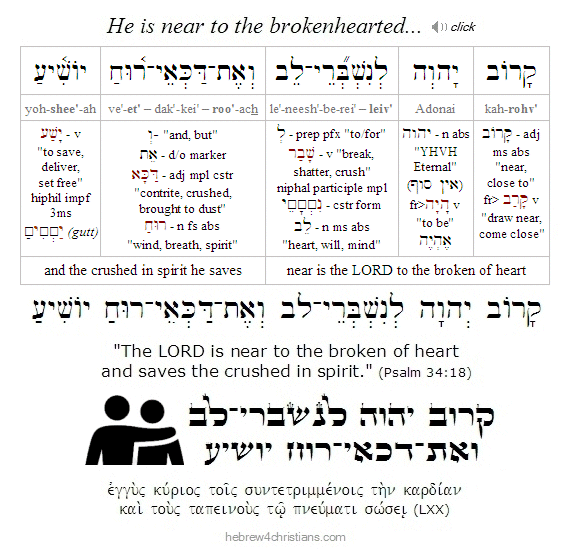 |
"God became a man to turn creatures into sons, not simply to produce better men of the old kind but to produce a new kind of man. It is not like teaching a horse to jump better and better, but like turning a horse into a winged creature" (Lewis: Mere Christianity). Amen. The divine name associated with teshuvah, or repentance, is ehyeh (אהיה), "I will be." The LORD imparts a holy and divine nature within us when are are reborn as his children. As it is written in our Scriptures: "Therefore, if anyone is in Messiah, he is a new creation (בריאה חדשׁה); the old has passed away; behold, the new has come" (2 Cor. 5:17).
Torah of Adversity...

09.05.22 (Elul 9, 5782) How we choose to deal with trouble and suffering (i.e., tzuris) makes all the difference. We may be tempted to bitterness over our lives, but then what? To paraphrase Soren Kierkegaard, the way of life is "how" more than it is "what." You may be powerless to control reality, but you are nevertheless responsible for how you respond to it. Check your attitude. Do you chose to live in lament over a healing that has not yet happened, or perhaps to regard yourself as a hapless victim? Or will you attempt to justify your suffering as a means of personal atonement, accepting it passively as a "good child" or martyr? Does your suffering stretch your heart, or does it cause you to shrink back in fear or self-pity?
In this connection, recall that when the Jews came to Marah, they "could not drink the water because it was bitter" (Exod. 15:23). The Hebrew, however, could be read, "they could not drink the water because they (i.e., the people) were bitter (כִּי מָרִים הֵם). The problem is often not "out there" but within the heart (Matt. 15:19-20). How we choose to see, in other words, says more about us than it does the external world. If you make the mistake of reading the daily news and taking it seriously, you will see only ugliness, and you run the risk of becoming hardhearted. Worldly despair eclipses apprehension of the Presence of God....
The Apostle Paul was afflicted with ongoing suffering in his life, despite being a faithful follower of Yeshua. God gave him a "thorn in the flesh" to help him persevere in humility. When Paul prayed three times for the affliction to depart from him, the LORD told him: "My grace is sufficient for you (דַּי לְךָ חַסְדִּי), for My strength is made perfect in weakness (כִּי בַּחֻלְשָׁה תֻּשְׁלַם גְּבוּרָתִי)." The persistence of Paul's struggle proved to be a blessing to him as it caused him to rely all the more on God's strength: "I will boast all the more gladly of my weaknesses, so that the power of Christ may rest upon me" (2 Cor. 12:9).
Yeshua taught us to pray to the Father: "Let your will be done on earth as it is in heaven," which is an appeal for us to find acceptance (or peace) by surrendering or "aligning" our will with God's will. Of course this is not always easy to do, and some situations are perplexing: "God, why must I go through this suffering?" Sometimes it feels as if our prayers are unanswered or disregarded: "How long, O Lord, will you forget me forever?" Other times we feel overwhelmed: "I am weary with my groaning; all the night make I my bed to swim; I water my couch with my tears" (Psalm 6:6). "Rabbi, who sinned, this man or his parents, so that he was born blind?" Yeshua answered, "It was not that this man sinned, or his parents, but that the works of God might be revealed in him" (John 9:2-3). This word of our Lord provides solace to our hearts: The trouble we face, inexplicable and painful though it may be, is intended to ultimately reveal the power of God's love to us...
We must learn to use ayin tovah, "a good eye," whenever we encounter the inevitable (and ubiquitous) adversities of life. Instead of seeing ourselves as victims of undeserved trouble, we must learn to accept adversity in the light of faith that teaches us lessons about finding endurance, resilience and hope. Faith affirms that adversity has an end that is ultimately good. Faith will not bow the knee to dark visions and live in dread of worldly fate.
It's been said, "hurt people hurt people," which means that if healing is not found for our woundedness, our pain will likely "leak out" as depression and hostility toward others... Finding inner peace is therefore crucial lest we become poisoned through a "root of bitterness" that defiles many (Heb. 12:15). The worst sort of prison is the one we make for ourselves, by choosing to be taken captive by fear and anger. May the Lord show us mercy and help us grow in grace and in the knowledge of his heart in all things. Amen.
Hebrew Lesson
Psalm 119:75 Hebrew reading (click):
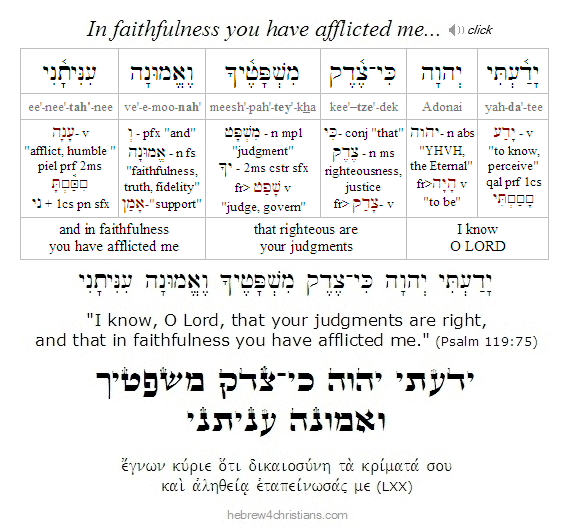 |
Shavuah Tov Podcast:
Parashat Ki Teitzei...

09.04.22 (Elul 8, 5782) Our Torah reading for this week (i.e., parashat Ki Teitzei) identifies 74 of the Torah's 613 commandments (more than any other), covering a wide assortment of laws related to warfare, family life, property laws, the humane treatment of animals, fair labor practices, and honest economic transactions, and more. The portion is always read during the month of Elul, and therefore it provides an opportunity for us to review the importance of the law in relation to the theme of teshuvah (i.e., repentance).
Parashat Ki Teitzei - כי־תצא
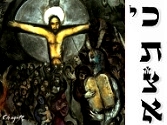
[ This week's Torah reading (parashat Ki Teitzei) is always read during the month of Elul... ]
09.04.22 (Elul 8, 5782) Shavuah tov v'chodesh tov, chaverim. If you've been following the weekly Torah schedule, you will recall that in last week's Torah reading (i.e., Shoftim), Moses defined an extensive system of justice for the Israelites and pointed to the coming Messiah who would be the rightful King of Israel: "The LORD your God will raise up for you a prophet like me from among you, from your brothers -- it is to him you shall listen" (Deut. 18:15). In this week's portion (i.e., Ki Teitzei: כי־תצא), Moses returns to the immediate concern of life in the promised land by providing additional laws to be enforced regarding civil life in Israel. In fact, Jewish tradition (following Maimonides) identifies no less than 74 of the Torah's 613 commandments in this portion (more than any other), covering a wide assortment of rules related to ethical warfare, family life, burial of the deceased, property laws, the humane treatment of animals, fair labor practices, and honest economic transactions.
Of particular interest to us is the statement that a man who was executed and "hanged on a tree" (עַל־עֵץ) is cursed of God (Deut. 21:22-23). According to the Talmud (i.e., Nezakim: Sanhedrin 6:4:3), the Great Sanhedrin (סַנְהֶדְרִין גְדוֹלָה) decided that "a man must be hanged with his face towards the spectators" upon a wooden stake, with his arms slung over a horizontal beam. It should be noted that while this is technically not the same thing as the gruesome practice of Roman crucifixion, the reasoning based on this verse was apparently used to justify the execution of Yeshua (Mark 15:9-15; John 19:5-7; 15). The exposed body was required to be buried before sundown to keep the land from being defiled. Besides the shame and degradation of this manner of death, the one so executed would be unable to fall to their knees as a final act of repentance before God, thereby implying that they were under the irrevocable curse of God (קִלְלַת אֱלהִים).
In this connection, we should note that Yeshua was falsely charged with blasphemy before the corrupt Sanhedrin of His day (Matt. 26:65; Mark 14:64; John 10:33) - an offence that was punishable by stoning (Lev. 24:11-16). However, since the Imperial Roman government then exercised legal hegemony over the region of Palestine, all capital cases were required to be submitted to the Roman proconsul for adjudication, and therefore we understand why the Jewish court remanded Yeshua and brought him to be interrogated by Pontius Pilate. Because Roman law was indifferent to cases concerning Jewish religious practices (i.e., charges of blasphemy), however, the priests further slandered Yeshua by illegitimately switching the original charge of blasphemy to that of sedition against Rome. The Sanhedrin undoubtedly rationalized their duplicity because the Torah allowed for an offender to impaled or "hung on a tree" (Num. 25:4), and since they were unable to do carry out this judgment because of Roman rule in the area, they needed Pilate to condemn him to death by crucifixion (Matt. 27:31; Mark 15:13-4; Luke 23:21; John 19:6,15). Note that crucifixion is mentioned elsewhere in the Talmud (Nashim: Yevamot 120b) regarding whether a widow can remarry if her husband had been crucified, as well as by the Jewish historian Josephus. The Talmud furthermore alludes to the death of Yeshua where Yeshua is said to have been crucified on "eve of Passover" (Nezekin: Sanhedrin 43a).
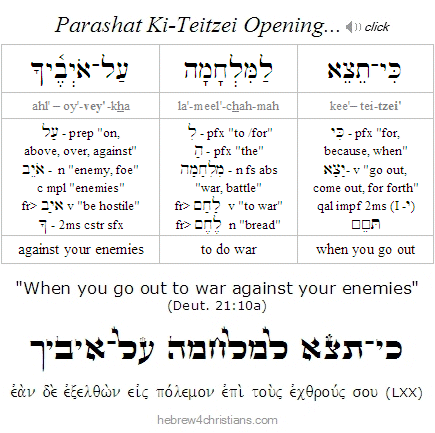 |
Let your light so shine...

09.02.22 (Elul 6, 5782) Keep the flame within your heart burning, friend... A sage once told a person struggling with his faith: "It is written that all creation was brought into being because of people like you. God saw there would be people who would cling to our holy faith, suffering greatly because confusion and doubt would plague them. God perceived that such would overcome these doubts and troubles of heart and remain strong in their belief. It was because of this that God brought forth all creation." Indeed, it was because of this that Yeshua our LORD suffered and died for you... Amen. Therefore never yield to despair, since that leads to further darkness and fear. Press on and keep fighting the "good fight" of faith (1 Tim. 6:12). Remember that you infinitely matter to heaven; your life has great value; you are significant and you are truly loved by our Heavenly Father. There is a "future and a hope" for you; there is "a white stone, and on that stone will be written a new name that no one can understand except the one who receives it" (Rev. 2:17). May "the trial of your faith, being much more precious than of gold that perishes, though it be tested with fire, be found to result in praise and glory and honor at the revelation to come" (1 Pet. 1:7).
"I am sure of this, that he who began a good work in you will bring it to completion (ἐπιτελέω) at the Day of Yeshua the Messiah" (Phil 1:6). The LORD is able to guard you (φυλάξαι) from stumbling and to present you blameless before the presence of His glory with great joy (Jude 1:24). "The LORD upholds all who are falling and raises up all who are bowed down" (Psalm 145:14). "He will sustain you to the end, guiltless in the Day of our Yeshua the Messiah" (1 Cor. 1:8). He who calls you is forever faithful; He will surely do it (1 Thess. 5:24). Yea, "the Lord is faithful (נֶאֱמָן הוּא): He will establish you and guard you against the evil one" (2 Thess. 3:3). The Spirit says, "Fear not, for I AM with you always."
Amen and Shabbat Shalom, chaverim...
The True Prophet like Moses...
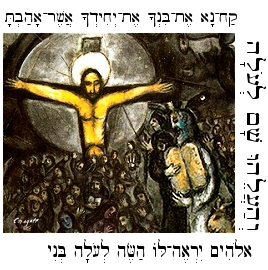
[ The following is related to this week's Torah reading, parashat Shoftim... ]
09.02.22 (Elul 6, 5782) In our Torah portion for this week, parashat Shoftim, we read Moses' great prophecy of the Messiah: "The LORD your God will raise up for you a prophet like me from among you, from your brothers -- it is to him you shall listen" (Deut. 18:15). Although there is not a lot of detail given in this prophecy, there is enough to determine some of the necessary conditions regarding the qualifications for the great prophet to come. For instance, God would "raise up" this prophet, the verb "raise" used in this verse (i.e., קוּם) alludes to the divine power of resurrection (תְקוּמָה). This prophet also would "be like" Moses (כָּמֹנִי), which means that he would share the same characterisitcs of Moses who was a redeemer sent by the LORD, a teacher, a prophet, a lawgiver, and so on. Now Islam claims that this prophet to come was "Muhammad," though that is certainly false, since Moses clearly said that the prophet to come would be a Jew who would be from the people Israel ("from among you"), not from another nation, and particularly not from the descendants of Ishmael (i.e., from Hagar rather than Sarah; see Gen. 17:19-22; Gal. 4:22-26).
So what basic characteristics were to mark this extraordinary Jewish prophet to come? To answer that question wisely, we must consider the life of Moses to discern the one who would be "like" him, that is, a prophet who would serve as an analog to his mission and life....
Consider, then that after being chosen by God to deliver Israel from bondage during the time of the Exodus, Moses became 1) the mediator (priest) of the covenant between God and the Jewish people, 2) the legislator the various commandments of the Torah, and 3) the prophet who received the vision of the Mishkan (the Altar), the future exile, and the ultimate destiny and glory of Zion. Moses was extraordinary because as the mediator of Israel, he instituted various sacrificial rites before the laws of sacrifice were enacted. For example, he instituted the Passover sacrifice in Egypt (Exod. 12:1-11), and when the people later reached Mount Sinai, he offered blood sacrifices to ratify the terms of the covenant (Exod. 24:8). As the great legislator of Israel, Moses declared the terms of the covenant, serving as its voice of authority. And finally, as the great prophet of Israel, Moses ascended the mountain and received the vision of the Mishkan (i.e., Tabernacle) before the priesthood had been instituted in Israel (Exod. 25:8-9). And even after the laws of the priests were proclaimed and the Mishkan was set up, Moses went before the very Holy of Holies to directly hear the Voice of the LORD, even though technically speaking this was forbidden, since he was not a kohen (i.e., descendant of Aaron). Indeed our Torah portion this week (i.e., parashat Naso) concludes, "And when Moses went into the tent of meeting to speak with the LORD, he heard the Voice speaking to him from above the mercy seat (i.e., kapporet: כַּפּרֶת) that was on the Ark of the Testimony, from between the two cherubim; and it spoke to him" (Num. 7:89). Near the end of his life, Moses message to Israel was summarized in a prophetic song called Ha'azinu that foretold Israel's entire history, past, present, and including the future redemption of the Jewish people.
"A prophet like unto me..." (Deut. 18:15). I mention all this because some people stumble over the fact that Yeshua, who was from the tribe of Judah, served as Israel's High Priest of the New Covenant, but Moses was from the tribe of Levi . But remember, though Moses was a Levite, he was not a member of the priesthood, even though he had defined the role of the sacrificial system to Israel and had direct access to the presence of the LORD within the sacred chamber of the Mishkan itself. Of course this issue is addressed in the Book of Hebrews, where the role of the Malki-Tzedek priesthood is ascribed to King Yeshua (Heb. 5:6-11; 7:1-19), but it is important to realize that Moses himself foresaw the coming of the Messiah as Israel's great Prophet, Priest and King (Deut. 18:15-19; John 5:36). Therefore, just as Moses himself was "outside" the law by serving as Israel's priest but nevertheless was commissioned by God Himself, so also with Yeshua, who instituted the sacrifice of His blood as the Lamb of God and who went directly before God's Throne to intercede on our behalf. Amen. For more on this subject be sure to see the article: "Moses' Prophecy of the Messiah."
Hebrew Lesson:
Deut. 18:15 reading (click):
Deliverance from Anxiety...
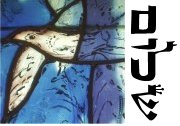
[ "Can we wish, if it were possible, to walk in a path strewed with flowers when His was strewed with thorns?" - John Newton ]
09.02.22 (Elul 6, 5782) It is written in our Scriptures: "Do not be anxious about anything, but in everything by prayer and supplication with thanksgiving let your requests be made known to God" (Phil. 4:6). Note that the verb translated "be anxious" here (i.e.,μεριμνάω) comes from a root word (μερίζω) that means to be fragmented or divided into parts and pieces. Being anxious is therefore the uneasy state of being distracted, unfocused and divided within yourself. When we worry we heed voices of fear and begin to feel 'double-minded,' (i.e., δίψυχος), unstable, and unable to think clearly; we get restless and find it difficult to deeply breathe. We start to feel out of control, fearful that something bad will happen despite all our efforts or wishes to the contrary; we sense doom; we lose heart; we go dark... The Scripture here admonishes us to pray when we are tempted to be anxious by focusing on something for which we are grateful. Doing so will instill the "peace of God" (שלום יהוה) that rises above all worldly thinking to keep watch over your heart and your thoughts through Yeshua the Messiah (Phil. 4:7). We gain the "light of life," that is, inner illumination from God, so that we can remain steadfast and unmovable in our faith, despite the temptation to look for relief from our struggles apart from God.
Hebrew Lesson
Isa. 26:3 Hebrew reading (click):
Remember that Yeshua is the central character of every episode of your life. Faith sees his presence, unbelief does not. Most of us live within the continuum of blindness and seeing... "Lord I believe; help Thou my unbelief."
A Precious Forgiveness...

09.02.22 (Elul 6, 5782) There is a temptation to minimize (or to psychologize) our sin, and thereby to minimize our need for deliverance from ourselves. We tend to be proud and foolish, thinking that somehow we're "going to make it," though to what end we are often unaware. Make it to what? We sometimes act as if there's a finish line up ahead and it's up to us to keep on going. It is therefore an offense to our pride and yet a blessing from heaven to get our knees taken out from under us, to encounter difficulties and troubles that we just can't manage, to feel overwhelmed, powerless, and needy, because this opens our hearts to what is real. אל־יְהוָה בַּצָּרָתָה לִּי קָרָאתִי וַיַּעֲנֵנִי- "In my trouble I cried out to the Lord, and he answered me" (Psalm 120:1).
Minimizing sin means that we regard the forgiveness of sin as a sort of "general truth," or an abstract theological concept, similar to the idea that God loves the world at large. In the realm of the spirit, however, there is no such thing as a "general truth," since God who knows all things does not generalize about anything whatsoever. The incarnation of Yeshua is infinitely personal; God doesn't save a nameless group of people, he saves individuals. He came to personally save you - you, as if you there were no others, for indeed, there are no others when it comes to your relationship with the Lord. How else can we fathom the atonement at the cross? How was Jesus made sin for you if your sins were not borne by him? Our particular sins were atoned for, not in a "general" substitutionary exchange given on behalf of an abstract humanity, but especially for you and for the guilt of your own sin.
Not a sparrow falls without your heavenly Father Knowing; not a lily of the field takes bloom apart from God's ministering hand. The very hairs of your head are all numbered. "Thou compassest my path and my lying down, and art acquainted with all my ways" (Psalm 139:3).
It has been said that the cross upon which Yeshua died was likely no more than nine feet in length, to make it easy for the Romans to take the body down after death. This implies that, after inserting and securing it into place, the stake may have been just six or seven feet from the ground. Some might recall how a bystander filled a sponge with vinegar and then used a reed (κάλαμος) to give to Yeshua as he was upon the cross, but it is likely the reed was no more than 18 inches or so in length (Matt. 27:48). Yeshua would be nearly eye-level to us as he was dying....
Imagine, then, walking up before the cross and seeing Yeshua look upon you as he was suffering. Imagine further him saying to you, "I know you; I know your secret sins, the pain of your shame, your heartache, your guilt, your loss... But I offer myself up for you; I take your place in judgment, so that by means of my death, you shall live..."
Hebrew Lesson
Isa. 53:5 Hebrew reading (click):
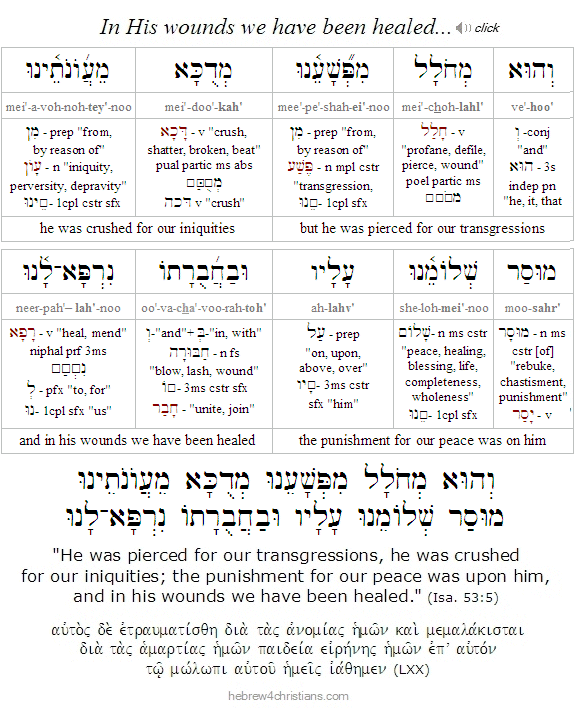 |
Sojourning despite ourselves...
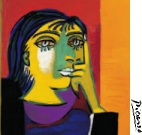
09.02.22 (Elul 6, 5782) Our temperament, our emotional disposition, as well as our predilections and aversions, are something basically "given" to us by God, and it is our responsibility to accept whatever we are and to "apply" whatever we are in service to God (Matt. 25:14-30). This includes not only sharing our talents or special abilities, but also our pain, our losses, and the solace we find in God's comfort. God understands our struggles within our own hearts; he knows how we suffer. As it is written: "As a father has compassion on his children, so the Lord has compassion on those who fear him; for he knows our frame; he remembers we are dust" (Psalm 103:13-14).
What we love reveals what we are. If we take joy in what is good, our heart is good; if we find joy in evil, our heart is evil. Of course we are a "divided house," battling our lower nature and seeking to "put on Christ," and therefore we are sometimes "wicked saints," that is, people who sin in spite of ourselves, who abhor our sin, and who lament and cry out to God for his forgiveness and healing intervention.
Some of us wrestle with fear or anger. This may be the result of past experiences we have had or even matters of biochemistry and physiology. Regardless of the preconditions for our temperaments, as long as we are sane, that is, as long as we are able to discern right from wrong by means of a functioning conscience, we are responsible for our choices. Of course only God knows the variables in our struggles, our past, our DNA, and how our woundedness and shame, for example, factors into how we reason and make decisions, but despite the force of our habits and inclinations, the decision to direct our will either to good or to evil is ours to make. If the heart desires virtue, anger can become a passion or inner resolve to fight against evil and to refuse to let it define who we are.
In this connection it is essential to trust in God. As Soren Kierkegaard reminds us, "the opposite of sin is not virtue but faith," which I understand to mean that the struggle is first of all one of the heart, as it decides what it loves and thereby directs the will in its choices. We do not attempt to become "Stoics" who deny the message and meaning of our emotions; surrender to God is not meant to harden our hearts and make us unfeeling people. No, we bring "all our heart" before the Lord - the bright and lovely as well as the dark and unseemly - and find mercy and grace to transform our lives.
Be encouraged my fellow sojourners walking by faith through the desert of this present world. The Torah uses a repetitious expression, "Sanctify yourselves and you shall be holy" (הִתְקַדִּשְׁתֶּם וִהְיִיתֶם קְדשִׁים) (Lev. 11:44) because when we make an effort -- no matter how feeble at times -- to draw near to the LORD, He will draw near to us... Indeed the walk of faith is one of ascent and descent and ascent again: It's often "two steps forward, one step back..." It is a long road, a process, as we learn to obey and seek to grow closer to God. Authentic repentance doesn't imply that we will never sin or make any mistakes, of course, but rather means that the oscillating pattern of "up, then down, then up" is the basic way we walk. Our direction has changed for good; we have turned to God for life and hope. We now understand our sins in light of a greater love that bears them for us even as we draw ever closer to the One who calls us home...
Hebrew Lesson
Psalm 103:13-14 Hebrew reading (click):
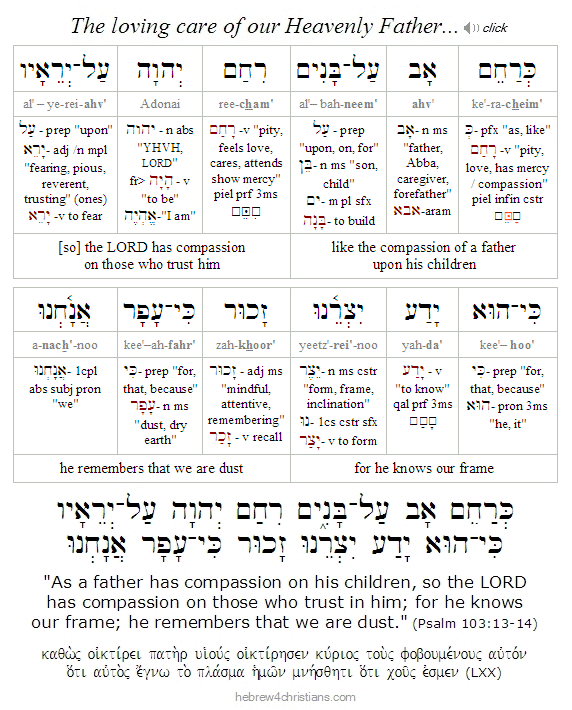 |
Lessons from Wasteplaces...

09.02.22 (Elul 6, 5782) Knowing God brings us into alignment with what is true and real, and therefore there is no greater tragedy than to be immersed into falsehood and delusion, lost inside yourself -- "tohu va'vohu," chaos and unreality. We find the ground of our being in our connection with the truth of God's presence given in Yeshua. He is the vine of life, and our communion with him imparts the flow of the life-giving Spirit within our hearts...
We "deny ourselves" when we enter into life, for deliverance from ourselves comes by the miracle of grace. Such denial redefines our relationship with olam ha'sheker, the false world experienced in our selfishness and in our fears. Discipleship entails learning to "see through" the appearance of what seems to be real to apprehend what is truly real, and this revelation comes from the greater spiritual power that sustains and upholds all things. When we let go of our superficial view of things we begin to see the divine presence in our midst.
It's been said that letting go of everything is a sort of "wilderness" experience. In the desert places we rely on God alone for everything. And because we rely on God alone to carry us in the way, we are subjected to temptation, as Israel was tempted in the desert for 40 years, and as Yeshua himself was tempted by the devil in the desert as well. The temptation is to lose our minds and be swallowed up in despair. Such despair whispers that we can't rely on God, that we should hazard our own way, and that we can find remedy for the waste places of the heart using our own devices (Matt. 4:1-9).
Despair interprets the desert "naturally," that is, satanically. The devil delights in transforming the desert into a place of worldly glory and comfort so that we can forget all about God. This is the idea of the "world" (κόσμος), which is another type of desert - desolate, gilded, godless, and devoid of faith. The heart of faith overcomes the despair of the world, not by ignoring it, but by facing its illusions and refusing to consent to its false philosophy of life.
It is a battle to believe; it is the "good fight of faith." Facing despair in the hope of our salvation in Yeshua overcomes the world and its self-chosen delusions (1 John 5:4). Yet we must face despair, even as we walk through the valley of the shadow of death on our way to the home of God's heart.... As Thomas Merton wrote: "Only the man who has had to face despair is really convinced that he needs mercy. Those who do not want mercy never seek it. It is better to find God on the threshold of despair than to risk our lives in a complacency that has never felt the need of forgiveness. A life that is without problems may literally be more hopeless than one that always verges on despair." Amen, the blessing of despair is the invitation to find life in God.
The walk of faith requires courage and divine strength... The human mind reasons and therefore fears, but the heart is the center of our being, the core of who we are. The heart does not reason its way to love but instead allows love to inform and direct reason. Therefore God asks our hearts to trust in him, and he does not allow calculated human reason with its fears to move us on the way (Isa. 55:8). When we receive divine grace to faithfully suffer, we hear the Spirit whispering back to us: "Be not afraid..." "Live in me..." "Walk in the light..." "I am with you always..." "You will endure..." "You are loved..."
Hebrew Lesson
Psalm 73:26 Hebrew reading (click):
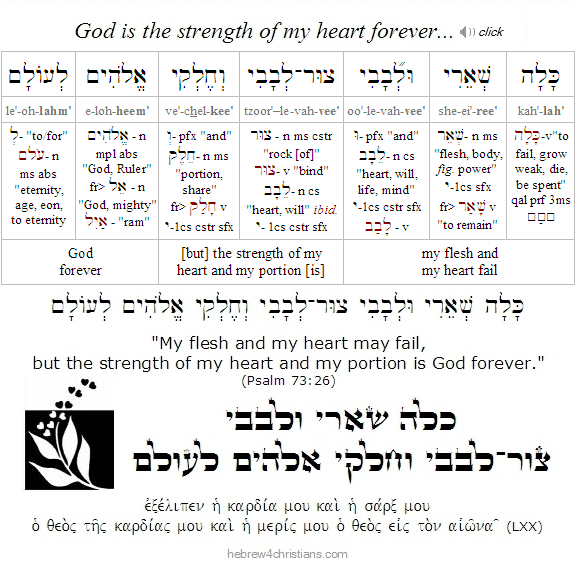 |
If there's supernatural element missing from modern Bible teaching, the biggest oversight is that of Messiah Himself, who is alive and we are now contemporaries of his presence and mission. Everything points to Him; He is the Center, the "Gravity" and Light of all that exists.
Teshuvah of the Heart...

09.01.22 (Elul 5, 5782) Part of the meaning of teshuvah (i.e., "repentance"), at least for some of us, is learning to trust and believe in love.... If you were abandoned as a child, for instance, you were deprived of the security, nurture, and basic human connection you needed to partake in love. Instead of acquiring a sense of belonging and acceptance your soul desperately needed, you inherited a sense of shame that taught that you were inherently unlovable and unworthy. Consequently, as you grew up, you may have found it difficult to trust or ask others for help; you might have turned inward, relying only on yourself, protecting yourself from further pain. You may have became lonely, filled with sadness, anger, and fear. Ironically and tragically, as you protected yourself from abandonment you made your heart hard and numb, and that led to the abandonment of yourself....
There are providential miracles... Healing can come when we turn again to ourselves - unconditionally accepting ourselves despite the pain of our past - and open our hearts to be loved. It was when he "came to himself" that the prodigal made the decision to go back to his father (Luke 15:17). Therefore the Spirit of God calls out to the bereft: "Return to your heart and know" (Deut. 4:29). This is possible only if we are willing to turn to God for the grace we need to be made whole. It is by turning to God (i.e., teshuvah) that we find ourselves to be beloved and made whole. Believing in God's love for us enables us to truly love ourselves, and from that connection, we can move out to love others as well.
O friend of forsaken hope, savor the phrase, "Know therefore today and return to your heart..." It the heart that is the place of connection with God... As Yeshua said, "Behold, I stand at the door and knock. If anyone hears my voice and opens the door, I will come in to him and eat with him, and he with me" (Rev. 3:20). Today may you find courage to "return to your heart" and receive again God's love for your soul... Amen.
Hebrew Lesson
Deut. 4:29 Hebrew reading (click):
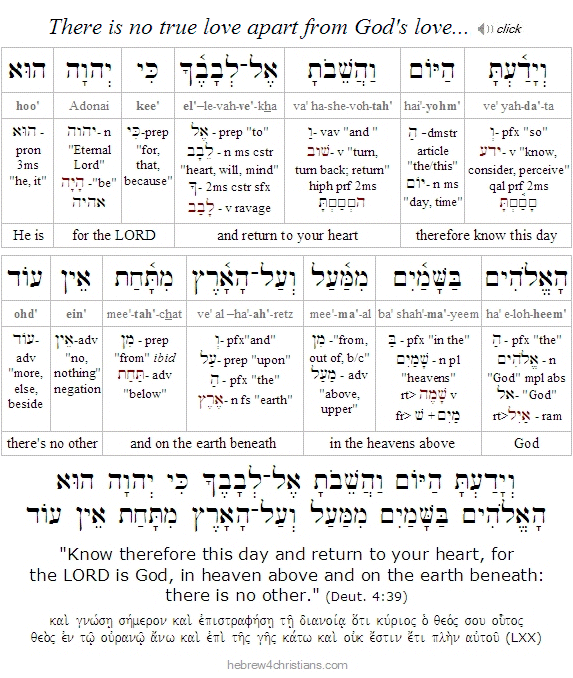 |
- Deut. 4:39 Hebrew page (pdf)
"Only the man who has had to face despair is really convinced that he needs mercy. Those who do not want mercy never seek it. It is better to find God on the threshold of despair than to risk our lives in a complacency that has never felt the need of forgiveness. A life that is without problems may literally be more hopeless than one that always verges on despair." - Thomas Merton
Personal Note: Please remember me in your prayers, friends. I am taking antibiotics for pneumonia, etc., and I have been really wiped out the last couple days. Thank you. - John
Returning to the Lord...
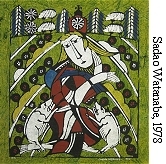
09.01.22 (Elul 5, 5782) The only way we can draw near to God is if we believe that He draws near to us, personally, intimately... "Behold I stand at the door and knock" (Rev. 3:20). Faith "hears the knock" as God's desire to draw near... faith hears his voice and opens the door to his presence; faith believes to partake in his communion.... "Draw near to God and he draws near to you" (James 4:8). The Hebrew word karov (קרוב) is translated using engidzo (ἐγγίζω) in New Testament Greek, a word that means to come close and touch... When we draw close to God, we reach out and find God holding us. Our "I" melts away as we cling to God as our dear life; we become one with his heart; we lose ourselves to find ourselves.
Hebrew Lesson
Zechariah 1:3b reading (click):
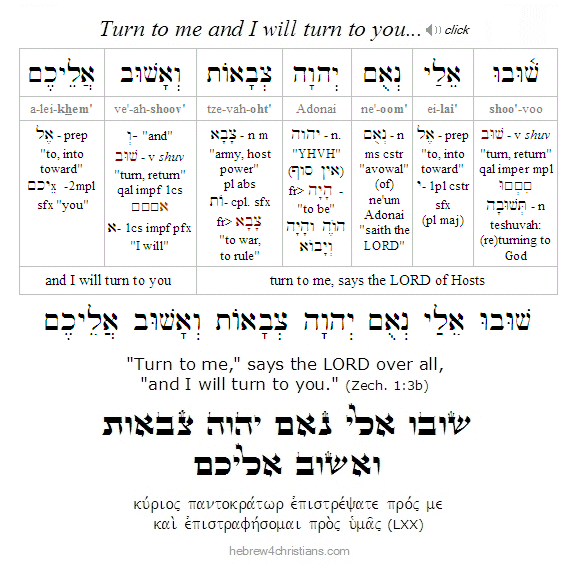 |
"Turn to me, and I will turn to you..." (Zech. 1:3). Someone might wonder why we must take the initiative, but that is because God has never turned away from us; he has always been the one who loves us most of all and awaits our return to his love.... "Turn to me and you will discover that I have never left you nor forsaken you."
Yeshua illustrated the idea of teshuvah (i.e., תְּשׁוּבָה, "returning to God") by telling the famous story of the "prodigal son" (Luke 15:11-32). After selfishly squandering his father's inheritance, a wayward son decided to return home, full of shame and self-reproach. "But while he was still a long way off, his father saw him and was filled with compassion for him; he ran to his son, threw his arms around him and kissed him." The father then ordered a celebratory meal in honor of his lost son's homecoming. When his older brother objected, the father said, "We had to celebrate and be glad, because this brother of yours was dead and is alive again; he was lost and is found."
This parable reveals that teshuvah ultimately means returning (shuv) to the outstretched arms of your Heavenly Father... God sees you while you are still "a long way off" (Rom. 5:8). He runs to you with affection when you first begin to turn your heart toward Him. Indeed, God's compassion is so great that He willingly embraces the shame of your sins and then adorns you with "a fine robe, a ring, and sandals." Your Heavenly Father even slaughters the "fattened calf" (Yeshua) so that a meal that celebrates your life may be served....
 |
Teshuvah and Sanity...

09.01.22 (Elul 5, 5782) It is written in our Scriptures (2 Tim. 1:7) that "God has not given us the spirit of fear (πνεῦμα δειλίας), but of power, and love, and a sound mind" (note that the term "sound mind" comes from the word saos (σάος) "safe," or under the protective restraining influence of the Spirit of God). Understand the connection between fear and confusion, then, and note further the connection between having a sound mind and a heart of peace and courage (Isa. 32:17)... A fearful or shameful attitude, then, weakens your resolve, quells your love, and introduces pain to your thinking. It is the old ruse of the enemy of our souls to lead us to despair, the exile of shame, and cruel bondage to untruth. As always the answer is the same: namely, teshuvah, turning to God and embracing the grace and love given in Yeshua as our deepest reality, our power, our heart, and our mind.
Hebrew Lesson
Isa. 32:17 Hebrew reading (click):
|









































































